Effectiveness of Psychological Support Strategies for Cancer Patients
VerifiedAdded on 2023/03/23
|48
|11028
|26
AI Summary
This systematic review explores the effectiveness of psychological support strategies in minimizing psychological distress in cancer patients. It examines various interventions, including cognitive behavioral therapy and acceptance and commitment therapy. The study aims to provide insights into the importance of psychological intervention in cancer care.
Contribute Materials
Your contribution can guide someone’s learning journey. Share your
documents today.
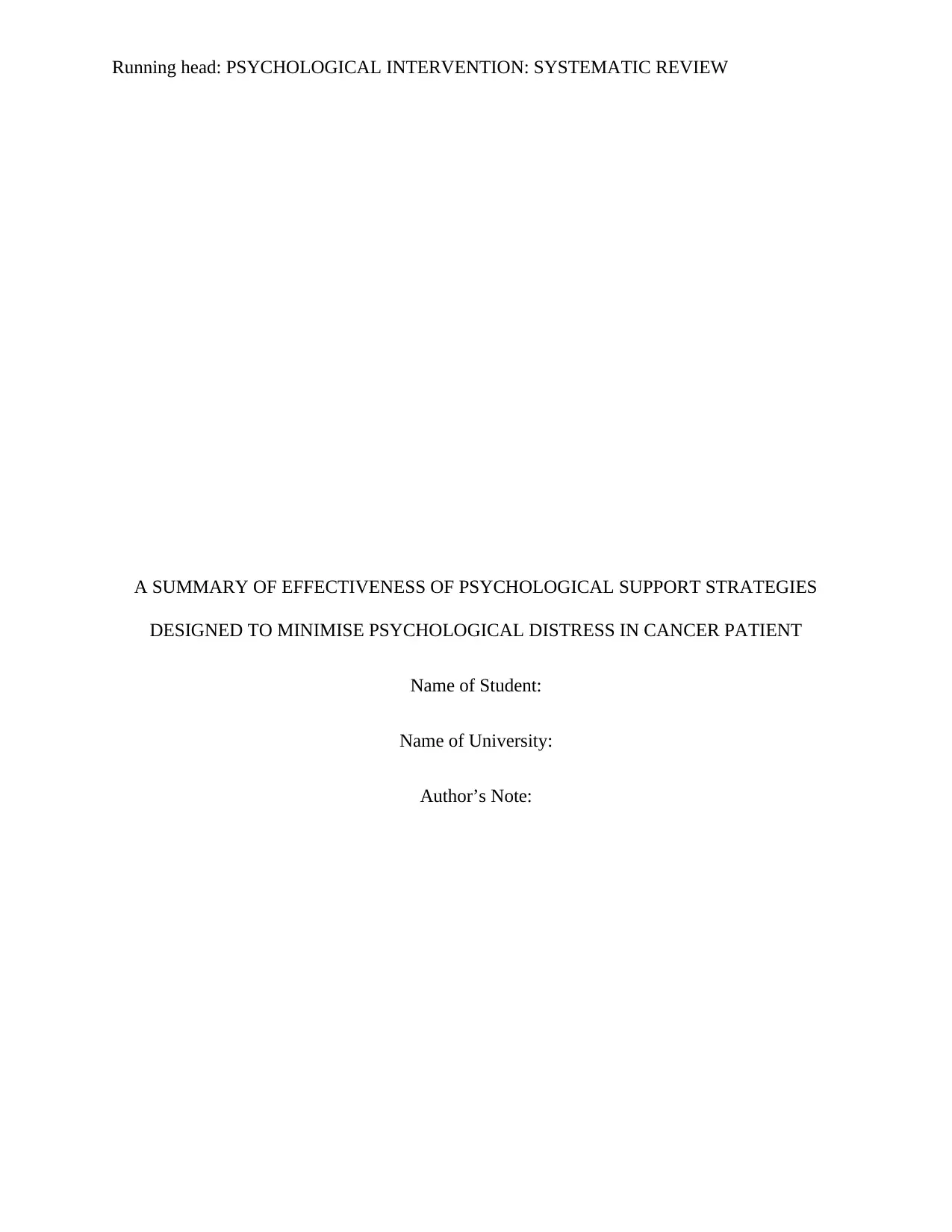
Running head: PSYCHOLOGICAL INTERVENTION: SYSTEMATIC REVIEW
A SUMMARY OF EFFECTIVENESS OF PSYCHOLOGICAL SUPPORT STRATEGIES
DESIGNED TO MINIMISE PSYCHOLOGICAL DISTRESS IN CANCER PATIENT
Name of Student:
Name of University:
Author’s Note:
A SUMMARY OF EFFECTIVENESS OF PSYCHOLOGICAL SUPPORT STRATEGIES
DESIGNED TO MINIMISE PSYCHOLOGICAL DISTRESS IN CANCER PATIENT
Name of Student:
Name of University:
Author’s Note:
Secure Best Marks with AI Grader
Need help grading? Try our AI Grader for instant feedback on your assignments.
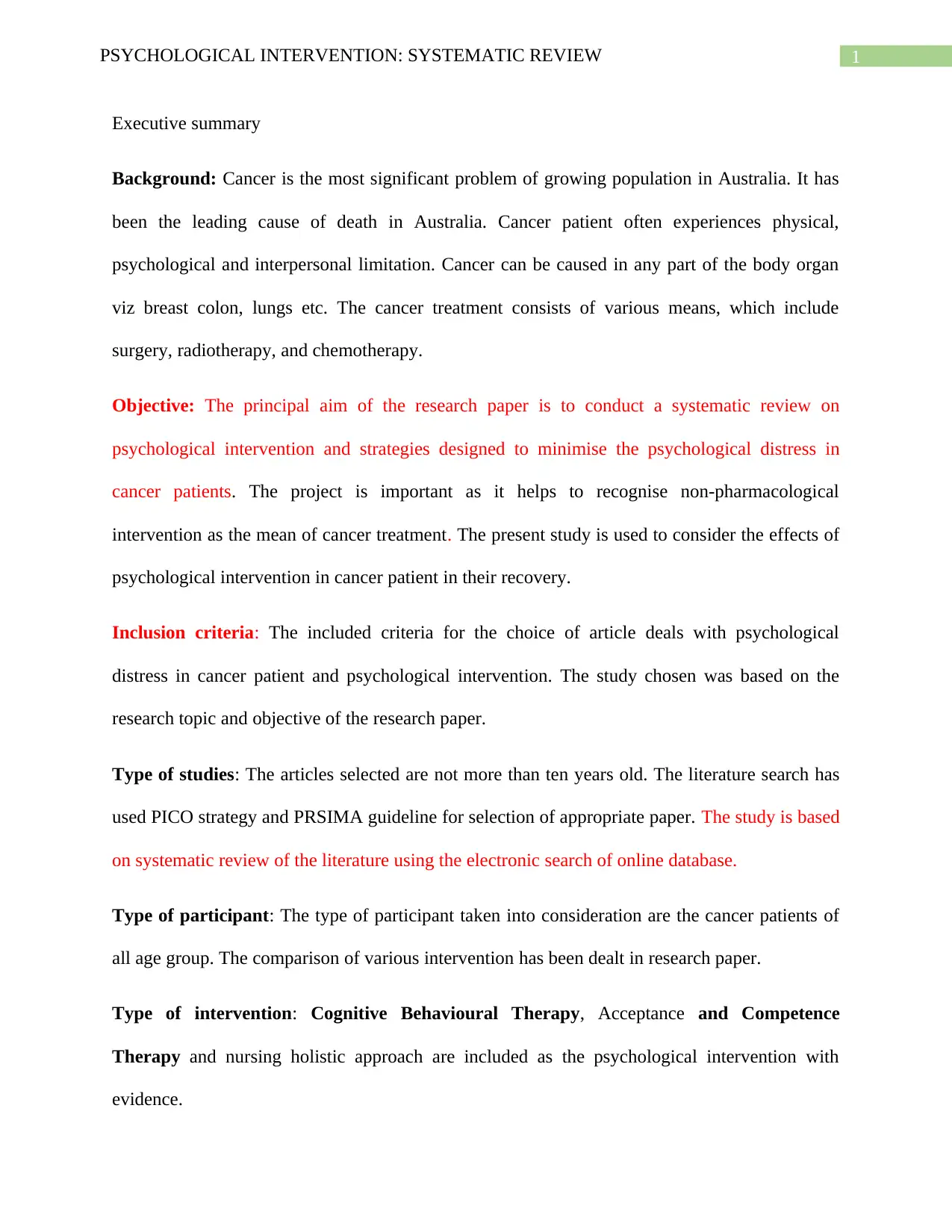
1PSYCHOLOGICAL INTERVENTION: SYSTEMATIC REVIEW
Executive summary
Background: Cancer is the most significant problem of growing population in Australia. It has
been the leading cause of death in Australia. Cancer patient often experiences physical,
psychological and interpersonal limitation. Cancer can be caused in any part of the body organ
viz breast colon, lungs etc. The cancer treatment consists of various means, which include
surgery, radiotherapy, and chemotherapy.
Objective: The principal aim of the research paper is to conduct a systematic review on
psychological intervention and strategies designed to minimise the psychological distress in
cancer patients. The project is important as it helps to recognise non-pharmacological
intervention as the mean of cancer treatment. The present study is used to consider the effects of
psychological intervention in cancer patient in their recovery.
Inclusion criteria: The included criteria for the choice of article deals with psychological
distress in cancer patient and psychological intervention. The study chosen was based on the
research topic and objective of the research paper.
Type of studies: The articles selected are not more than ten years old. The literature search has
used PICO strategy and PRSIMA guideline for selection of appropriate paper. The study is based
on systematic review of the literature using the electronic search of online database.
Type of participant: The type of participant taken into consideration are the cancer patients of
all age group. The comparison of various intervention has been dealt in research paper.
Type of intervention: Cognitive Behavioural Therapy, Acceptance and Competence
Therapy and nursing holistic approach are included as the psychological intervention with
evidence.
Executive summary
Background: Cancer is the most significant problem of growing population in Australia. It has
been the leading cause of death in Australia. Cancer patient often experiences physical,
psychological and interpersonal limitation. Cancer can be caused in any part of the body organ
viz breast colon, lungs etc. The cancer treatment consists of various means, which include
surgery, radiotherapy, and chemotherapy.
Objective: The principal aim of the research paper is to conduct a systematic review on
psychological intervention and strategies designed to minimise the psychological distress in
cancer patients. The project is important as it helps to recognise non-pharmacological
intervention as the mean of cancer treatment. The present study is used to consider the effects of
psychological intervention in cancer patient in their recovery.
Inclusion criteria: The included criteria for the choice of article deals with psychological
distress in cancer patient and psychological intervention. The study chosen was based on the
research topic and objective of the research paper.
Type of studies: The articles selected are not more than ten years old. The literature search has
used PICO strategy and PRSIMA guideline for selection of appropriate paper. The study is based
on systematic review of the literature using the electronic search of online database.
Type of participant: The type of participant taken into consideration are the cancer patients of
all age group. The comparison of various intervention has been dealt in research paper.
Type of intervention: Cognitive Behavioural Therapy, Acceptance and Competence
Therapy and nursing holistic approach are included as the psychological intervention with
evidence.
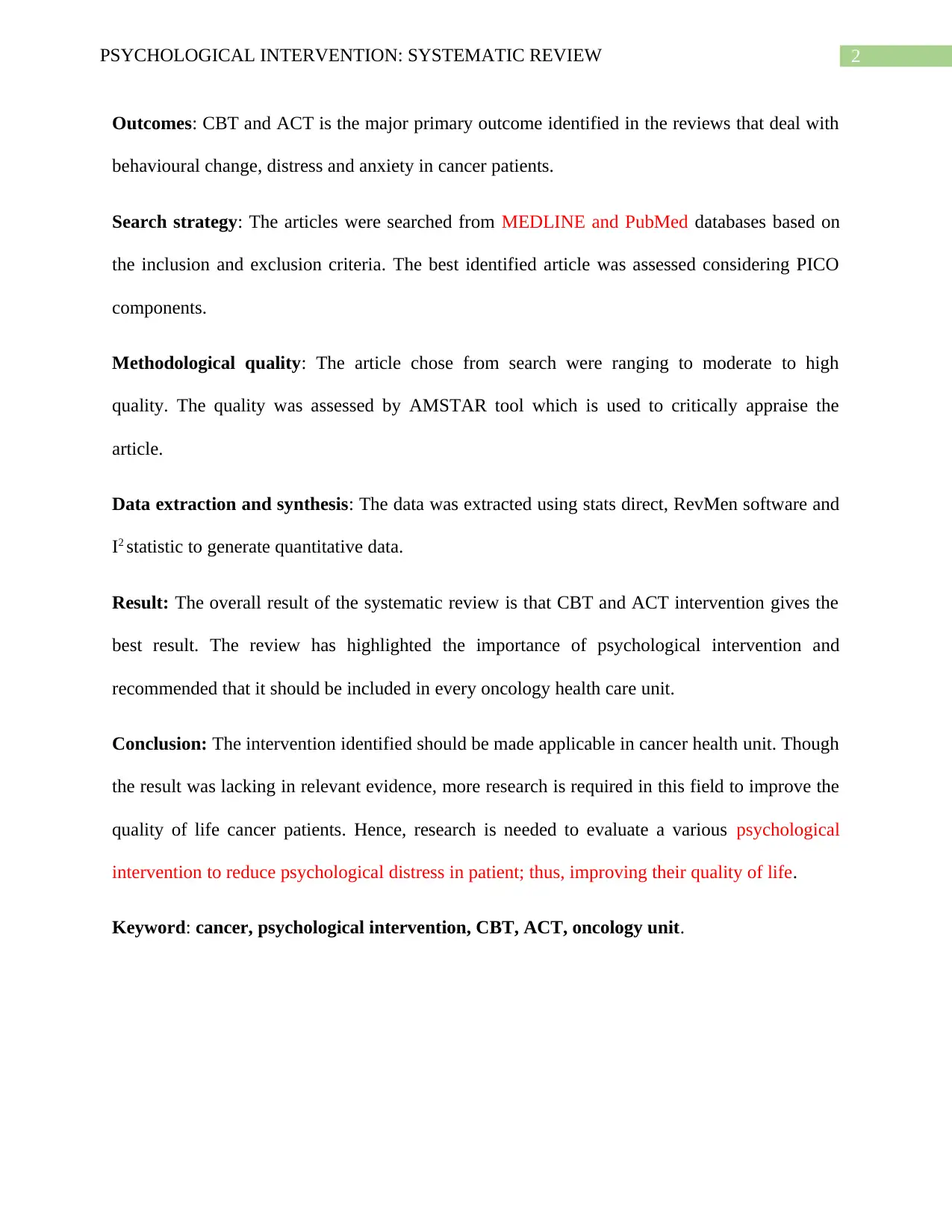
2PSYCHOLOGICAL INTERVENTION: SYSTEMATIC REVIEW
Outcomes: CBT and ACT is the major primary outcome identified in the reviews that deal with
behavioural change, distress and anxiety in cancer patients.
Search strategy: The articles were searched from MEDLINE and PubMed databases based on
the inclusion and exclusion criteria. The best identified article was assessed considering PICO
components.
Methodological quality: The article chose from search were ranging to moderate to high
quality. The quality was assessed by AMSTAR tool which is used to critically appraise the
article.
Data extraction and synthesis: The data was extracted using stats direct, RevMen software and
I2 statistic to generate quantitative data.
Result: The overall result of the systematic review is that CBT and ACT intervention gives the
best result. The review has highlighted the importance of psychological intervention and
recommended that it should be included in every oncology health care unit.
Conclusion: The intervention identified should be made applicable in cancer health unit. Though
the result was lacking in relevant evidence, more research is required in this field to improve the
quality of life cancer patients. Hence, research is needed to evaluate a various psychological
intervention to reduce psychological distress in patient; thus, improving their quality of life.
Keyword: cancer, psychological intervention, CBT, ACT, oncology unit.
Outcomes: CBT and ACT is the major primary outcome identified in the reviews that deal with
behavioural change, distress and anxiety in cancer patients.
Search strategy: The articles were searched from MEDLINE and PubMed databases based on
the inclusion and exclusion criteria. The best identified article was assessed considering PICO
components.
Methodological quality: The article chose from search were ranging to moderate to high
quality. The quality was assessed by AMSTAR tool which is used to critically appraise the
article.
Data extraction and synthesis: The data was extracted using stats direct, RevMen software and
I2 statistic to generate quantitative data.
Result: The overall result of the systematic review is that CBT and ACT intervention gives the
best result. The review has highlighted the importance of psychological intervention and
recommended that it should be included in every oncology health care unit.
Conclusion: The intervention identified should be made applicable in cancer health unit. Though
the result was lacking in relevant evidence, more research is required in this field to improve the
quality of life cancer patients. Hence, research is needed to evaluate a various psychological
intervention to reduce psychological distress in patient; thus, improving their quality of life.
Keyword: cancer, psychological intervention, CBT, ACT, oncology unit.
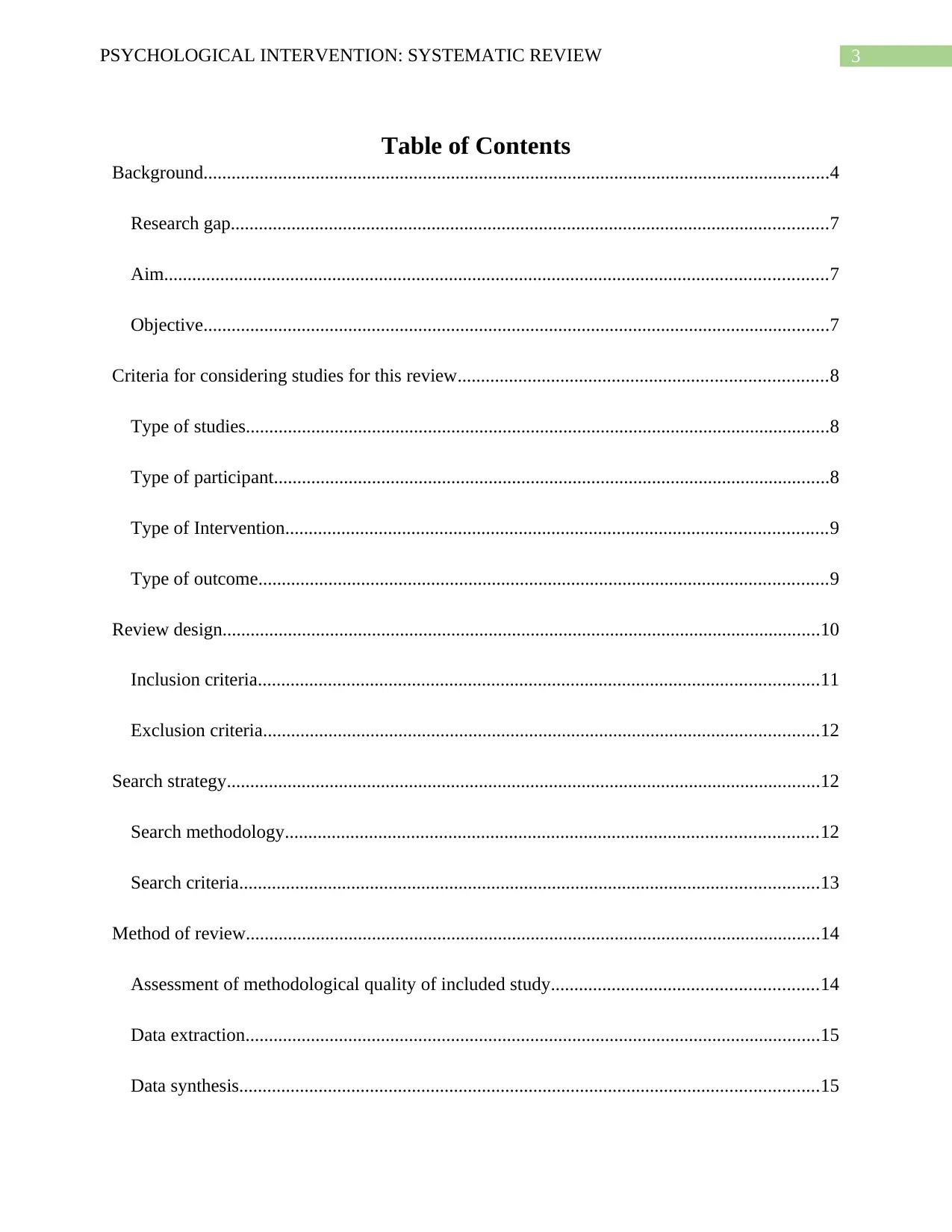
3PSYCHOLOGICAL INTERVENTION: SYSTEMATIC REVIEW
Table of Contents
Background......................................................................................................................................4
Research gap................................................................................................................................7
Aim..............................................................................................................................................7
Objective......................................................................................................................................7
Criteria for considering studies for this review...............................................................................8
Type of studies.............................................................................................................................8
Type of participant.......................................................................................................................8
Type of Intervention....................................................................................................................9
Type of outcome..........................................................................................................................9
Review design................................................................................................................................10
Inclusion criteria........................................................................................................................11
Exclusion criteria.......................................................................................................................12
Search strategy...............................................................................................................................12
Search methodology..................................................................................................................12
Search criteria............................................................................................................................13
Method of review...........................................................................................................................14
Assessment of methodological quality of included study.........................................................14
Data extraction...........................................................................................................................15
Data synthesis............................................................................................................................15
Table of Contents
Background......................................................................................................................................4
Research gap................................................................................................................................7
Aim..............................................................................................................................................7
Objective......................................................................................................................................7
Criteria for considering studies for this review...............................................................................8
Type of studies.............................................................................................................................8
Type of participant.......................................................................................................................8
Type of Intervention....................................................................................................................9
Type of outcome..........................................................................................................................9
Review design................................................................................................................................10
Inclusion criteria........................................................................................................................11
Exclusion criteria.......................................................................................................................12
Search strategy...............................................................................................................................12
Search methodology..................................................................................................................12
Search criteria............................................................................................................................13
Method of review...........................................................................................................................14
Assessment of methodological quality of included study.........................................................14
Data extraction...........................................................................................................................15
Data synthesis............................................................................................................................15
Secure Best Marks with AI Grader
Need help grading? Try our AI Grader for instant feedback on your assignments.
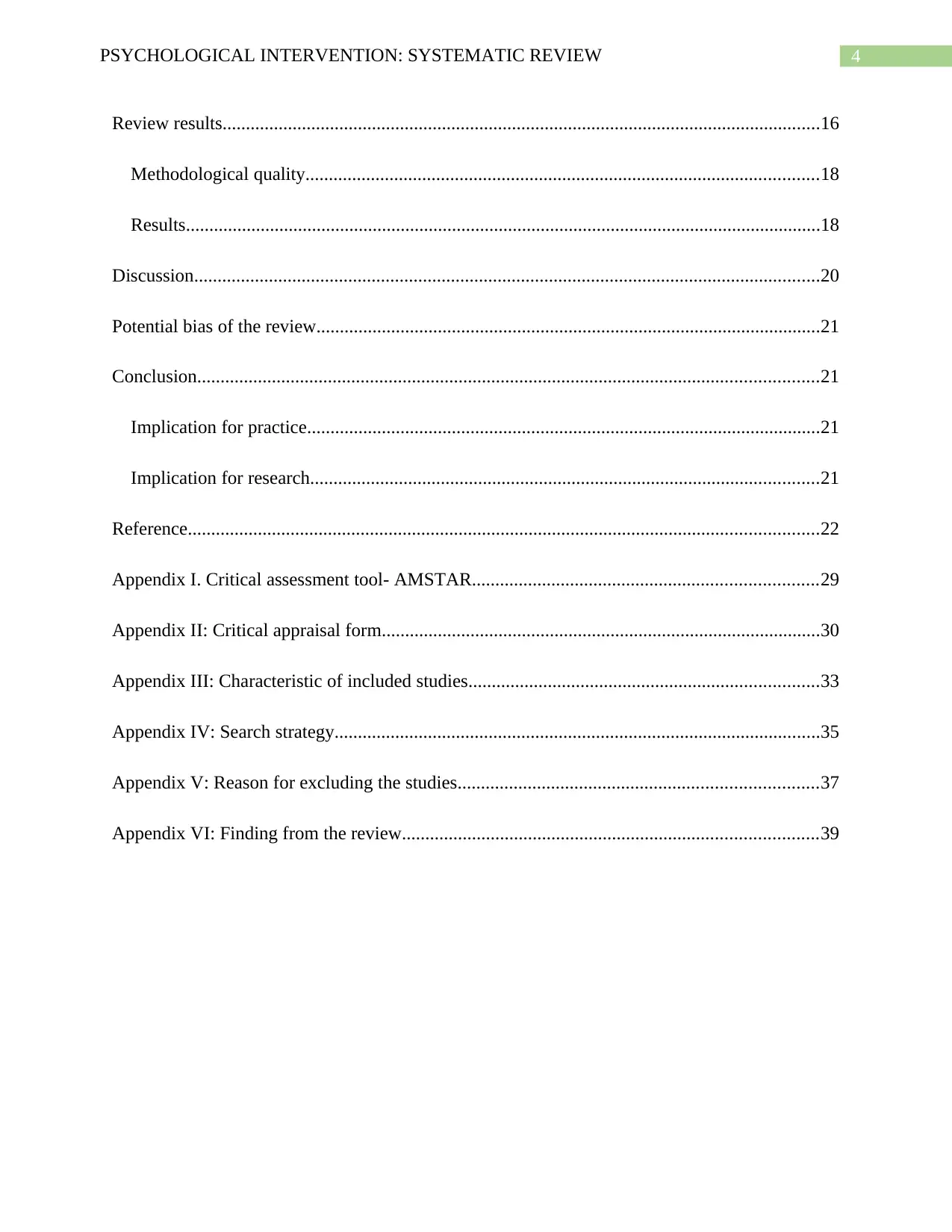
4PSYCHOLOGICAL INTERVENTION: SYSTEMATIC REVIEW
Review results................................................................................................................................16
Methodological quality..............................................................................................................18
Results........................................................................................................................................18
Discussion......................................................................................................................................20
Potential bias of the review............................................................................................................21
Conclusion.....................................................................................................................................21
Implication for practice..............................................................................................................21
Implication for research.............................................................................................................21
Reference.......................................................................................................................................22
Appendix I. Critical assessment tool- AMSTAR..........................................................................29
Appendix II: Critical appraisal form..............................................................................................30
Appendix III: Characteristic of included studies...........................................................................33
Appendix IV: Search strategy........................................................................................................35
Appendix V: Reason for excluding the studies.............................................................................37
Appendix VI: Finding from the review.........................................................................................39
Review results................................................................................................................................16
Methodological quality..............................................................................................................18
Results........................................................................................................................................18
Discussion......................................................................................................................................20
Potential bias of the review............................................................................................................21
Conclusion.....................................................................................................................................21
Implication for practice..............................................................................................................21
Implication for research.............................................................................................................21
Reference.......................................................................................................................................22
Appendix I. Critical assessment tool- AMSTAR..........................................................................29
Appendix II: Critical appraisal form..............................................................................................30
Appendix III: Characteristic of included studies...........................................................................33
Appendix IV: Search strategy........................................................................................................35
Appendix V: Reason for excluding the studies.............................................................................37
Appendix VI: Finding from the review.........................................................................................39
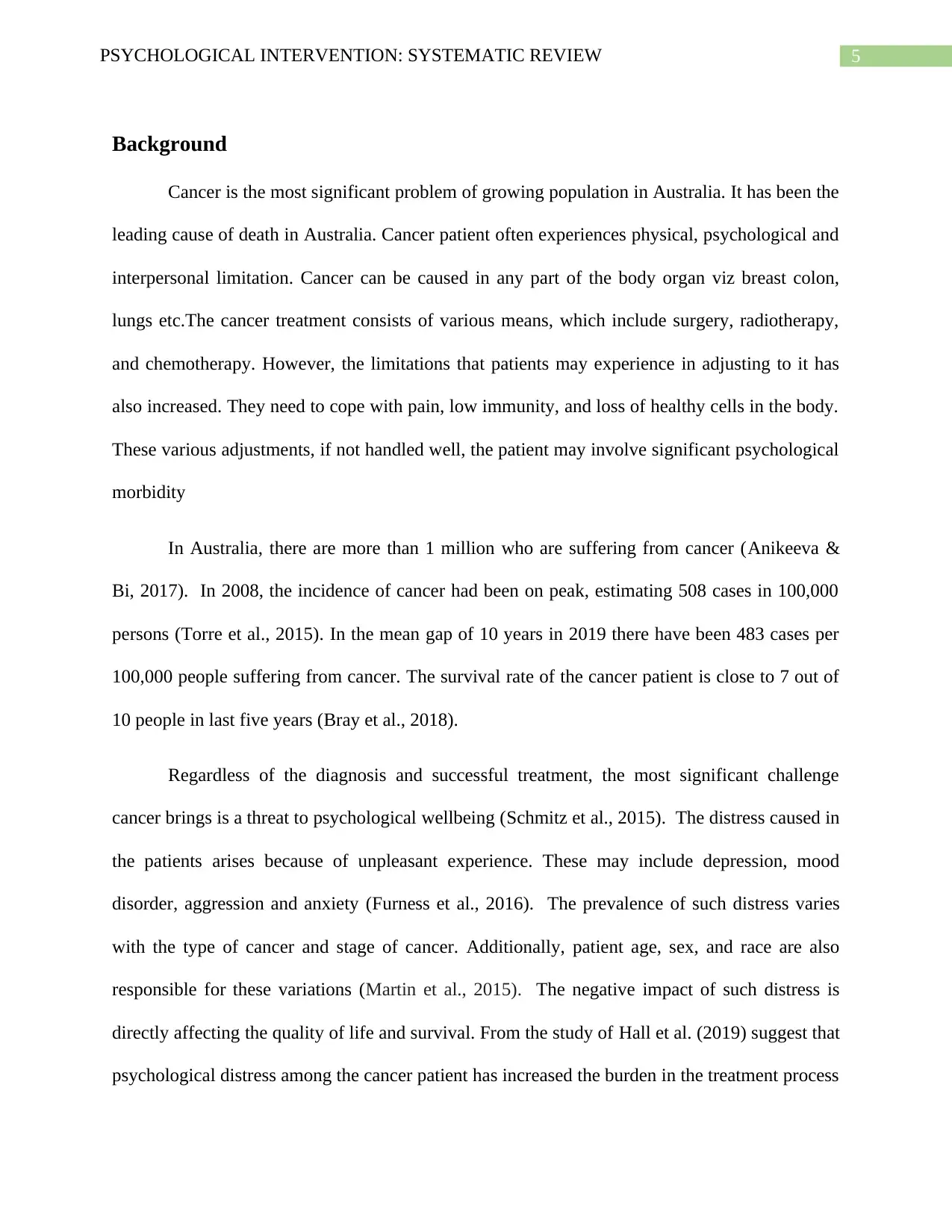
5PSYCHOLOGICAL INTERVENTION: SYSTEMATIC REVIEW
Background
Cancer is the most significant problem of growing population in Australia. It has been the
leading cause of death in Australia. Cancer patient often experiences physical, psychological and
interpersonal limitation. Cancer can be caused in any part of the body organ viz breast colon,
lungs etc.The cancer treatment consists of various means, which include surgery, radiotherapy,
and chemotherapy. However, the limitations that patients may experience in adjusting to it has
also increased. They need to cope with pain, low immunity, and loss of healthy cells in the body.
These various adjustments, if not handled well, the patient may involve significant psychological
morbidity
In Australia, there are more than 1 million who are suffering from cancer (Anikeeva &
Bi, 2017). In 2008, the incidence of cancer had been on peak, estimating 508 cases in 100,000
persons (Torre et al., 2015). In the mean gap of 10 years in 2019 there have been 483 cases per
100,000 people suffering from cancer. The survival rate of the cancer patient is close to 7 out of
10 people in last five years (Bray et al., 2018).
Regardless of the diagnosis and successful treatment, the most significant challenge
cancer brings is a threat to psychological wellbeing (Schmitz et al., 2015). The distress caused in
the patients arises because of unpleasant experience. These may include depression, mood
disorder, aggression and anxiety (Furness et al., 2016). The prevalence of such distress varies
with the type of cancer and stage of cancer. Additionally, patient age, sex, and race are also
responsible for these variations (Martin et al., 2015). The negative impact of such distress is
directly affecting the quality of life and survival. From the study of Hall et al. (2019) suggest that
psychological distress among the cancer patient has increased the burden in the treatment process
Background
Cancer is the most significant problem of growing population in Australia. It has been the
leading cause of death in Australia. Cancer patient often experiences physical, psychological and
interpersonal limitation. Cancer can be caused in any part of the body organ viz breast colon,
lungs etc.The cancer treatment consists of various means, which include surgery, radiotherapy,
and chemotherapy. However, the limitations that patients may experience in adjusting to it has
also increased. They need to cope with pain, low immunity, and loss of healthy cells in the body.
These various adjustments, if not handled well, the patient may involve significant psychological
morbidity
In Australia, there are more than 1 million who are suffering from cancer (Anikeeva &
Bi, 2017). In 2008, the incidence of cancer had been on peak, estimating 508 cases in 100,000
persons (Torre et al., 2015). In the mean gap of 10 years in 2019 there have been 483 cases per
100,000 people suffering from cancer. The survival rate of the cancer patient is close to 7 out of
10 people in last five years (Bray et al., 2018).
Regardless of the diagnosis and successful treatment, the most significant challenge
cancer brings is a threat to psychological wellbeing (Schmitz et al., 2015). The distress caused in
the patients arises because of unpleasant experience. These may include depression, mood
disorder, aggression and anxiety (Furness et al., 2016). The prevalence of such distress varies
with the type of cancer and stage of cancer. Additionally, patient age, sex, and race are also
responsible for these variations (Martin et al., 2015). The negative impact of such distress is
directly affecting the quality of life and survival. From the study of Hall et al. (2019) suggest that
psychological distress among the cancer patient has increased the burden in the treatment process
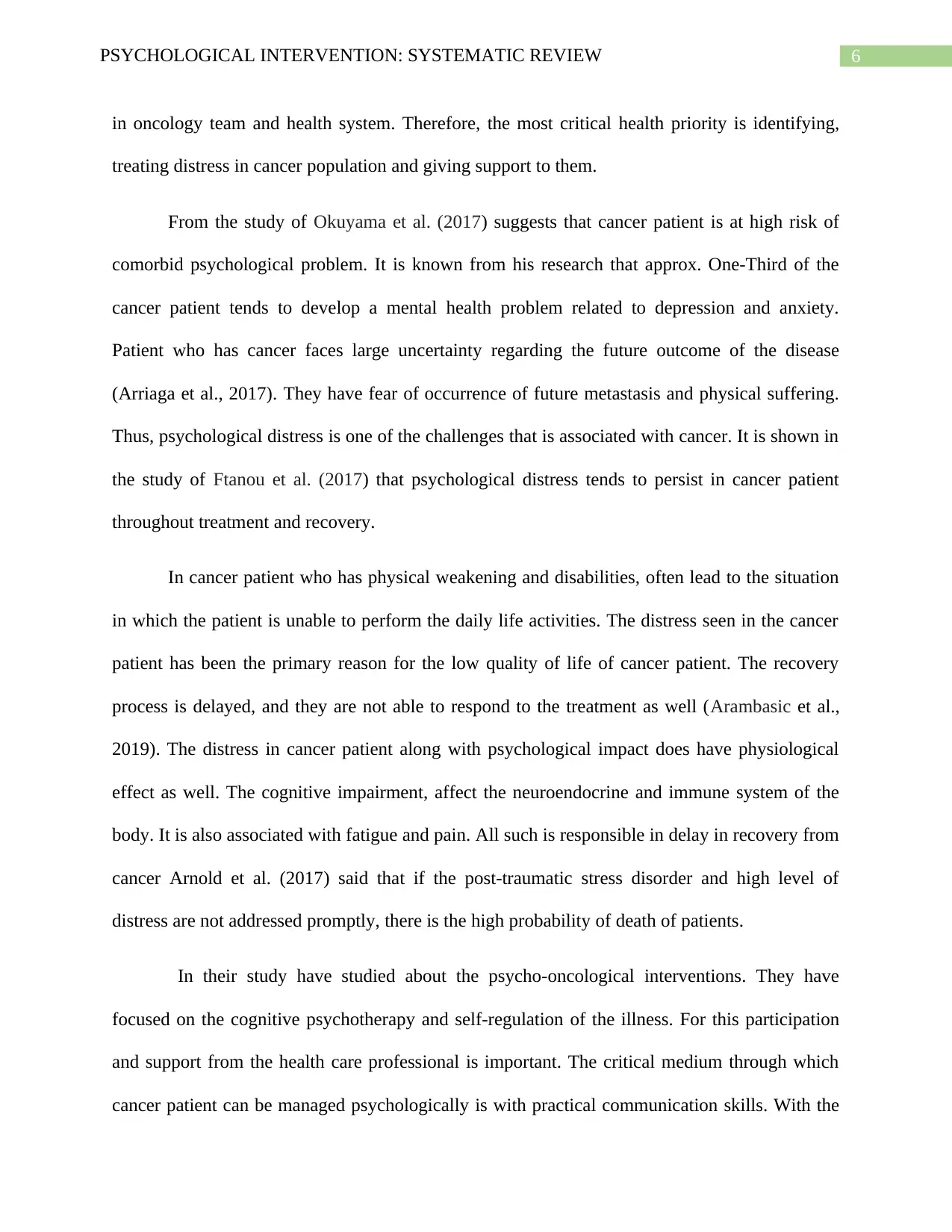
6PSYCHOLOGICAL INTERVENTION: SYSTEMATIC REVIEW
in oncology team and health system. Therefore, the most critical health priority is identifying,
treating distress in cancer population and giving support to them.
From the study of Okuyama et al. (2017) suggests that cancer patient is at high risk of
comorbid psychological problem. It is known from his research that approx. One-Third of the
cancer patient tends to develop a mental health problem related to depression and anxiety.
Patient who has cancer faces large uncertainty regarding the future outcome of the disease
(Arriaga et al., 2017). They have fear of occurrence of future metastasis and physical suffering.
Thus, psychological distress is one of the challenges that is associated with cancer. It is shown in
the study of Ftanou et al. (2017) that psychological distress tends to persist in cancer patient
throughout treatment and recovery.
In cancer patient who has physical weakening and disabilities, often lead to the situation
in which the patient is unable to perform the daily life activities. The distress seen in the cancer
patient has been the primary reason for the low quality of life of cancer patient. The recovery
process is delayed, and they are not able to respond to the treatment as well (Arambasic et al.,
2019). The distress in cancer patient along with psychological impact does have physiological
effect as well. The cognitive impairment, affect the neuroendocrine and immune system of the
body. It is also associated with fatigue and pain. All such is responsible in delay in recovery from
cancer Arnold et al. (2017) said that if the post-traumatic stress disorder and high level of
distress are not addressed promptly, there is the high probability of death of patients.
In their study have studied about the psycho-oncological interventions. They have
focused on the cognitive psychotherapy and self-regulation of the illness. For this participation
and support from the health care professional is important. The critical medium through which
cancer patient can be managed psychologically is with practical communication skills. With the
in oncology team and health system. Therefore, the most critical health priority is identifying,
treating distress in cancer population and giving support to them.
From the study of Okuyama et al. (2017) suggests that cancer patient is at high risk of
comorbid psychological problem. It is known from his research that approx. One-Third of the
cancer patient tends to develop a mental health problem related to depression and anxiety.
Patient who has cancer faces large uncertainty regarding the future outcome of the disease
(Arriaga et al., 2017). They have fear of occurrence of future metastasis and physical suffering.
Thus, psychological distress is one of the challenges that is associated with cancer. It is shown in
the study of Ftanou et al. (2017) that psychological distress tends to persist in cancer patient
throughout treatment and recovery.
In cancer patient who has physical weakening and disabilities, often lead to the situation
in which the patient is unable to perform the daily life activities. The distress seen in the cancer
patient has been the primary reason for the low quality of life of cancer patient. The recovery
process is delayed, and they are not able to respond to the treatment as well (Arambasic et al.,
2019). The distress in cancer patient along with psychological impact does have physiological
effect as well. The cognitive impairment, affect the neuroendocrine and immune system of the
body. It is also associated with fatigue and pain. All such is responsible in delay in recovery from
cancer Arnold et al. (2017) said that if the post-traumatic stress disorder and high level of
distress are not addressed promptly, there is the high probability of death of patients.
In their study have studied about the psycho-oncological interventions. They have
focused on the cognitive psychotherapy and self-regulation of the illness. For this participation
and support from the health care professional is important. The critical medium through which
cancer patient can be managed psychologically is with practical communication skills. With the
Paraphrase This Document
Need a fresh take? Get an instant paraphrase of this document with our AI Paraphraser
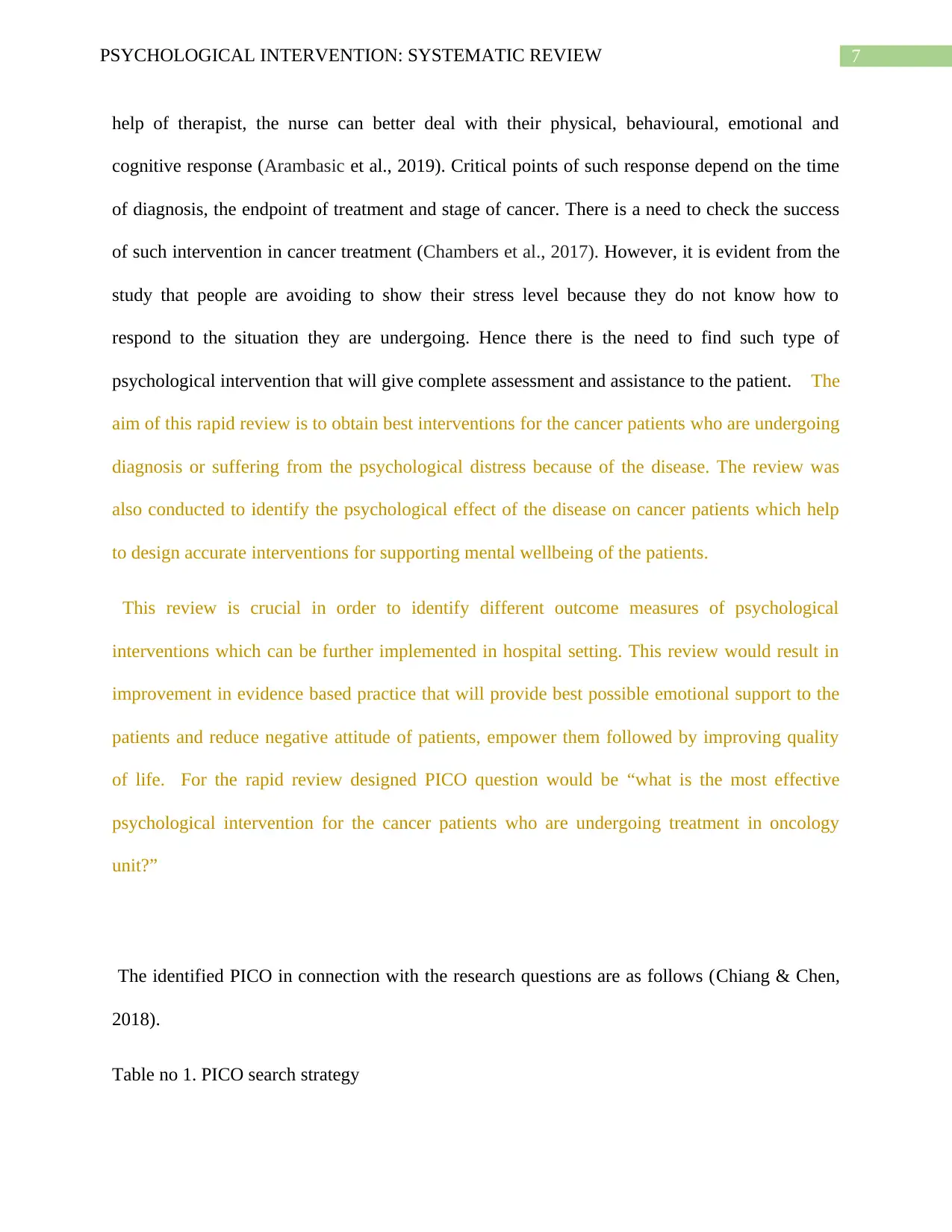
7PSYCHOLOGICAL INTERVENTION: SYSTEMATIC REVIEW
help of therapist, the nurse can better deal with their physical, behavioural, emotional and
cognitive response (Arambasic et al., 2019). Critical points of such response depend on the time
of diagnosis, the endpoint of treatment and stage of cancer. There is a need to check the success
of such intervention in cancer treatment (Chambers et al., 2017). However, it is evident from the
study that people are avoiding to show their stress level because they do not know how to
respond to the situation they are undergoing. Hence there is the need to find such type of
psychological intervention that will give complete assessment and assistance to the patient. The
aim of this rapid review is to obtain best interventions for the cancer patients who are undergoing
diagnosis or suffering from the psychological distress because of the disease. The review was
also conducted to identify the psychological effect of the disease on cancer patients which help
to design accurate interventions for supporting mental wellbeing of the patients.
This review is crucial in order to identify different outcome measures of psychological
interventions which can be further implemented in hospital setting. This review would result in
improvement in evidence based practice that will provide best possible emotional support to the
patients and reduce negative attitude of patients, empower them followed by improving quality
of life. For the rapid review designed PICO question would be “what is the most effective
psychological intervention for the cancer patients who are undergoing treatment in oncology
unit?”
The identified PICO in connection with the research questions are as follows (Chiang & Chen,
2018).
Table no 1. PICO search strategy
help of therapist, the nurse can better deal with their physical, behavioural, emotional and
cognitive response (Arambasic et al., 2019). Critical points of such response depend on the time
of diagnosis, the endpoint of treatment and stage of cancer. There is a need to check the success
of such intervention in cancer treatment (Chambers et al., 2017). However, it is evident from the
study that people are avoiding to show their stress level because they do not know how to
respond to the situation they are undergoing. Hence there is the need to find such type of
psychological intervention that will give complete assessment and assistance to the patient. The
aim of this rapid review is to obtain best interventions for the cancer patients who are undergoing
diagnosis or suffering from the psychological distress because of the disease. The review was
also conducted to identify the psychological effect of the disease on cancer patients which help
to design accurate interventions for supporting mental wellbeing of the patients.
This review is crucial in order to identify different outcome measures of psychological
interventions which can be further implemented in hospital setting. This review would result in
improvement in evidence based practice that will provide best possible emotional support to the
patients and reduce negative attitude of patients, empower them followed by improving quality
of life. For the rapid review designed PICO question would be “what is the most effective
psychological intervention for the cancer patients who are undergoing treatment in oncology
unit?”
The identified PICO in connection with the research questions are as follows (Chiang & Chen,
2018).
Table no 1. PICO search strategy
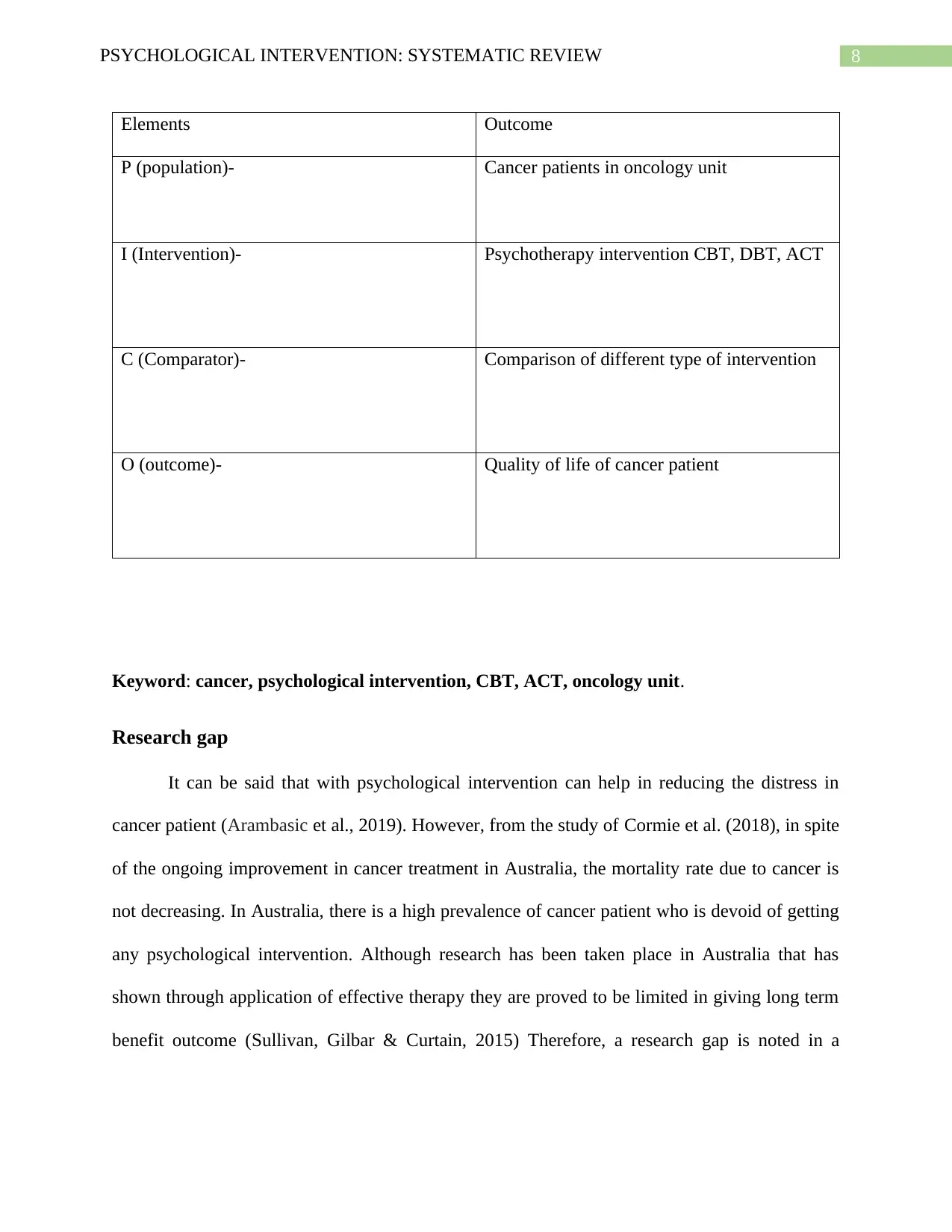
8PSYCHOLOGICAL INTERVENTION: SYSTEMATIC REVIEW
Elements Outcome
P (population)- Cancer patients in oncology unit
I (Intervention)- Psychotherapy intervention CBT, DBT, ACT
C (Comparator)- Comparison of different type of intervention
O (outcome)- Quality of life of cancer patient
Keyword: cancer, psychological intervention, CBT, ACT, oncology unit.
Research gap
It can be said that with psychological intervention can help in reducing the distress in
cancer patient (Arambasic et al., 2019). However, from the study of Cormie et al. (2018), in spite
of the ongoing improvement in cancer treatment in Australia, the mortality rate due to cancer is
not decreasing. In Australia, there is a high prevalence of cancer patient who is devoid of getting
any psychological intervention. Although research has been taken place in Australia that has
shown through application of effective therapy they are proved to be limited in giving long term
benefit outcome (Sullivan, Gilbar & Curtain, 2015) Therefore, a research gap is noted in a
Elements Outcome
P (population)- Cancer patients in oncology unit
I (Intervention)- Psychotherapy intervention CBT, DBT, ACT
C (Comparator)- Comparison of different type of intervention
O (outcome)- Quality of life of cancer patient
Keyword: cancer, psychological intervention, CBT, ACT, oncology unit.
Research gap
It can be said that with psychological intervention can help in reducing the distress in
cancer patient (Arambasic et al., 2019). However, from the study of Cormie et al. (2018), in spite
of the ongoing improvement in cancer treatment in Australia, the mortality rate due to cancer is
not decreasing. In Australia, there is a high prevalence of cancer patient who is devoid of getting
any psychological intervention. Although research has been taken place in Australia that has
shown through application of effective therapy they are proved to be limited in giving long term
benefit outcome (Sullivan, Gilbar & Curtain, 2015) Therefore, a research gap is noted in a
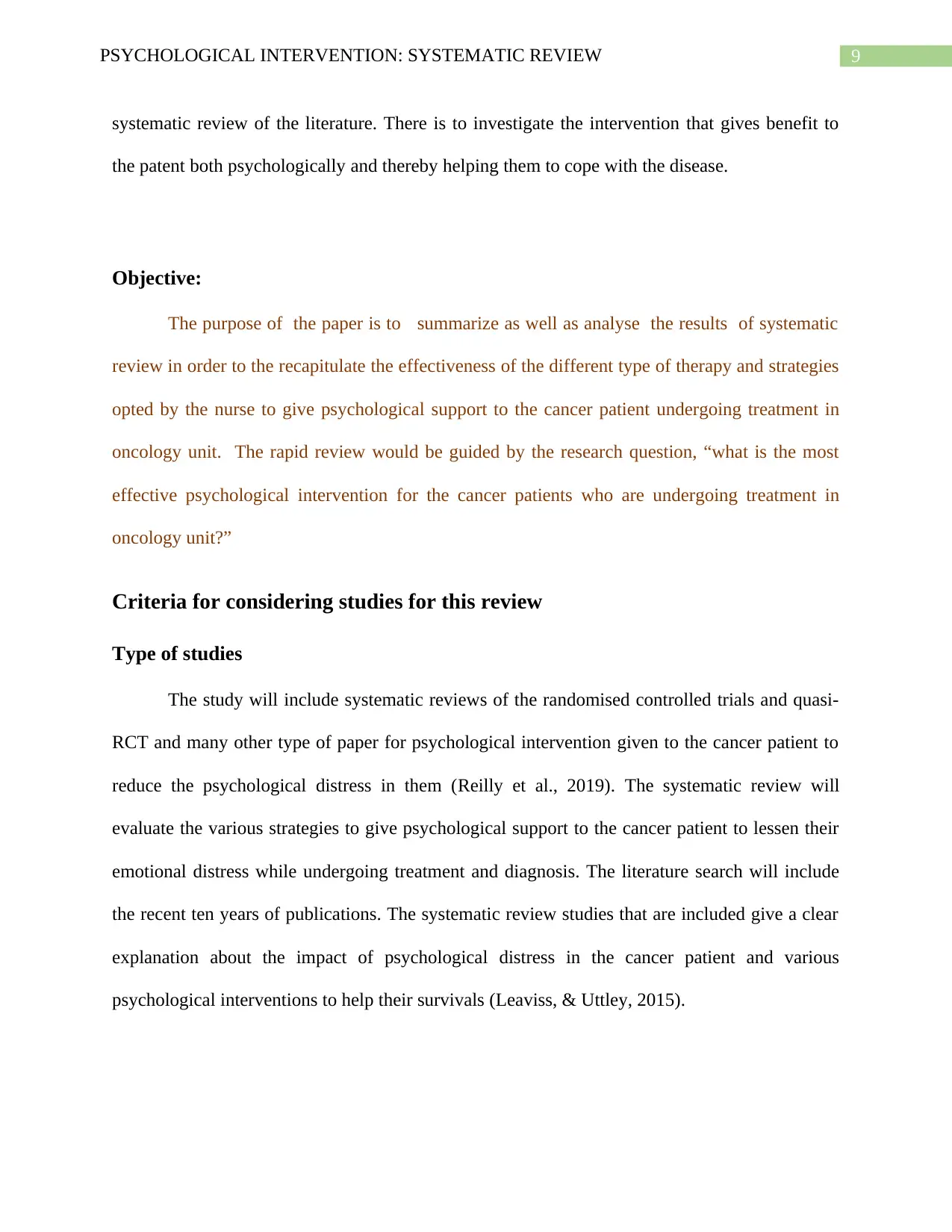
9PSYCHOLOGICAL INTERVENTION: SYSTEMATIC REVIEW
systematic review of the literature. There is to investigate the intervention that gives benefit to
the patent both psychologically and thereby helping them to cope with the disease.
Objective:
The purpose of the paper is to summarize as well as analyse the results of systematic
review in order to the recapitulate the effectiveness of the different type of therapy and strategies
opted by the nurse to give psychological support to the cancer patient undergoing treatment in
oncology unit. The rapid review would be guided by the research question, “what is the most
effective psychological intervention for the cancer patients who are undergoing treatment in
oncology unit?”
Criteria for considering studies for this review
Type of studies
The study will include systematic reviews of the randomised controlled trials and quasi-
RCT and many other type of paper for psychological intervention given to the cancer patient to
reduce the psychological distress in them (Reilly et al., 2019). The systematic review will
evaluate the various strategies to give psychological support to the cancer patient to lessen their
emotional distress while undergoing treatment and diagnosis. The literature search will include
the recent ten years of publications. The systematic review studies that are included give a clear
explanation about the impact of psychological distress in the cancer patient and various
psychological interventions to help their survivals (Leaviss, & Uttley, 2015).
systematic review of the literature. There is to investigate the intervention that gives benefit to
the patent both psychologically and thereby helping them to cope with the disease.
Objective:
The purpose of the paper is to summarize as well as analyse the results of systematic
review in order to the recapitulate the effectiveness of the different type of therapy and strategies
opted by the nurse to give psychological support to the cancer patient undergoing treatment in
oncology unit. The rapid review would be guided by the research question, “what is the most
effective psychological intervention for the cancer patients who are undergoing treatment in
oncology unit?”
Criteria for considering studies for this review
Type of studies
The study will include systematic reviews of the randomised controlled trials and quasi-
RCT and many other type of paper for psychological intervention given to the cancer patient to
reduce the psychological distress in them (Reilly et al., 2019). The systematic review will
evaluate the various strategies to give psychological support to the cancer patient to lessen their
emotional distress while undergoing treatment and diagnosis. The literature search will include
the recent ten years of publications. The systematic review studies that are included give a clear
explanation about the impact of psychological distress in the cancer patient and various
psychological interventions to help their survivals (Leaviss, & Uttley, 2015).
Secure Best Marks with AI Grader
Need help grading? Try our AI Grader for instant feedback on your assignments.
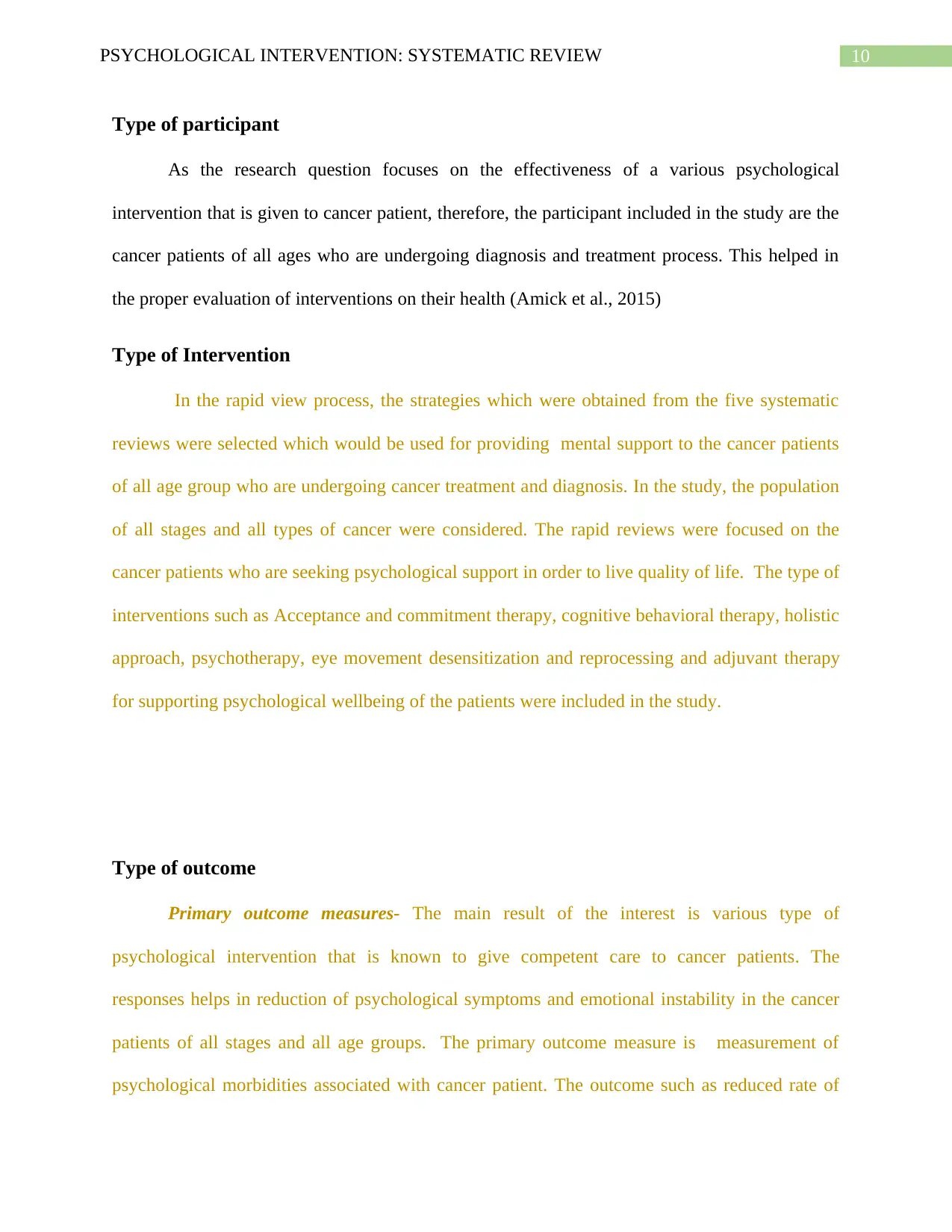
10PSYCHOLOGICAL INTERVENTION: SYSTEMATIC REVIEW
Type of participant
As the research question focuses on the effectiveness of a various psychological
intervention that is given to cancer patient, therefore, the participant included in the study are the
cancer patients of all ages who are undergoing diagnosis and treatment process. This helped in
the proper evaluation of interventions on their health (Amick et al., 2015)
Type of Intervention
In the rapid view process, the strategies which were obtained from the five systematic
reviews were selected which would be used for providing mental support to the cancer patients
of all age group who are undergoing cancer treatment and diagnosis. In the study, the population
of all stages and all types of cancer were considered. The rapid reviews were focused on the
cancer patients who are seeking psychological support in order to live quality of life. The type of
interventions such as Acceptance and commitment therapy, cognitive behavioral therapy, holistic
approach, psychotherapy, eye movement desensitization and reprocessing and adjuvant therapy
for supporting psychological wellbeing of the patients were included in the study.
Type of outcome
Primary outcome measures- The main result of the interest is various type of
psychological intervention that is known to give competent care to cancer patients. The
responses helps in reduction of psychological symptoms and emotional instability in the cancer
patients of all stages and all age groups. The primary outcome measure is measurement of
psychological morbidities associated with cancer patient. The outcome such as reduced rate of
Type of participant
As the research question focuses on the effectiveness of a various psychological
intervention that is given to cancer patient, therefore, the participant included in the study are the
cancer patients of all ages who are undergoing diagnosis and treatment process. This helped in
the proper evaluation of interventions on their health (Amick et al., 2015)
Type of Intervention
In the rapid view process, the strategies which were obtained from the five systematic
reviews were selected which would be used for providing mental support to the cancer patients
of all age group who are undergoing cancer treatment and diagnosis. In the study, the population
of all stages and all types of cancer were considered. The rapid reviews were focused on the
cancer patients who are seeking psychological support in order to live quality of life. The type of
interventions such as Acceptance and commitment therapy, cognitive behavioral therapy, holistic
approach, psychotherapy, eye movement desensitization and reprocessing and adjuvant therapy
for supporting psychological wellbeing of the patients were included in the study.
Type of outcome
Primary outcome measures- The main result of the interest is various type of
psychological intervention that is known to give competent care to cancer patients. The
responses helps in reduction of psychological symptoms and emotional instability in the cancer
patients of all stages and all age groups. The primary outcome measure is measurement of
psychological morbidities associated with cancer patient. The outcome such as reduced rate of
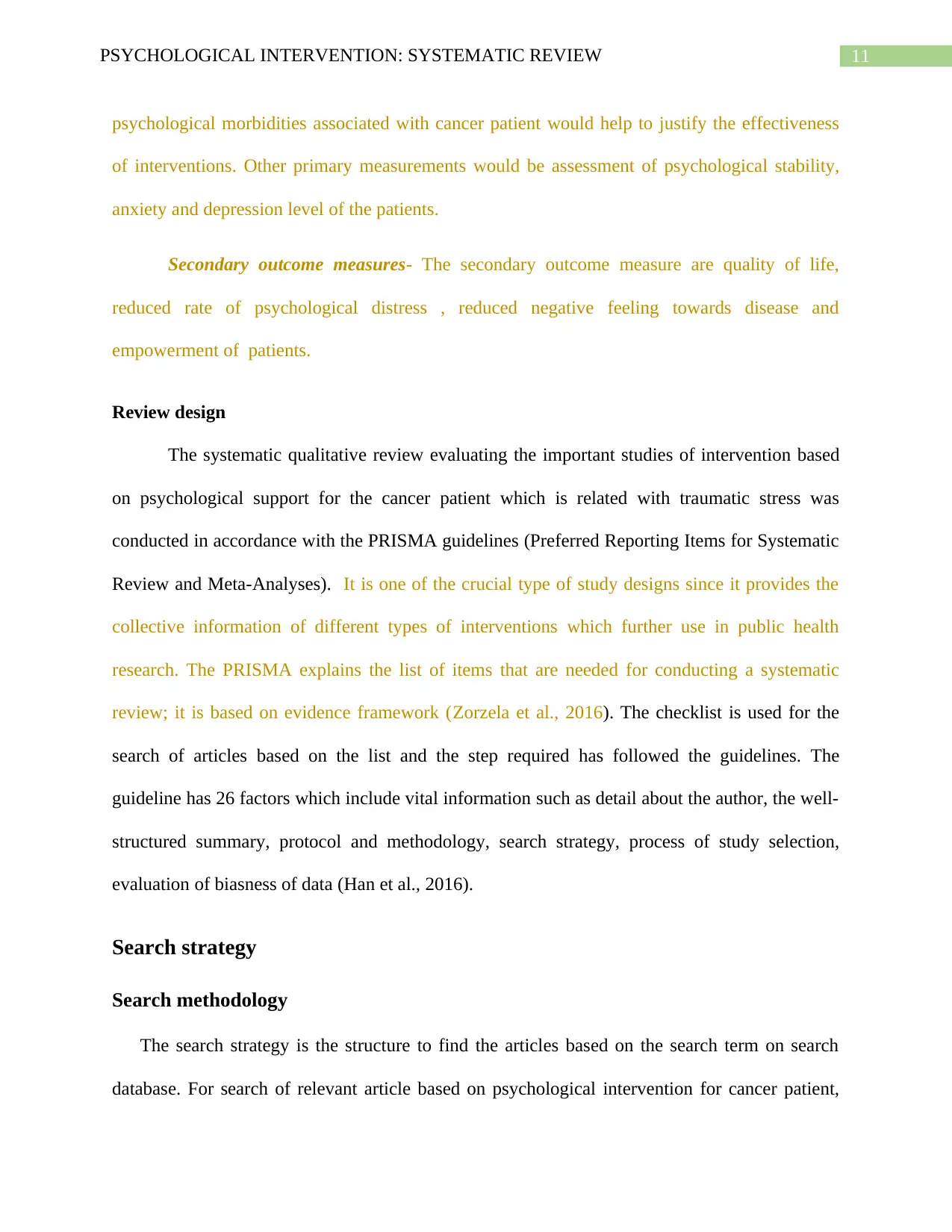
11PSYCHOLOGICAL INTERVENTION: SYSTEMATIC REVIEW
psychological morbidities associated with cancer patient would help to justify the effectiveness
of interventions. Other primary measurements would be assessment of psychological stability,
anxiety and depression level of the patients.
Secondary outcome measures- The secondary outcome measure are quality of life,
reduced rate of psychological distress , reduced negative feeling towards disease and
empowerment of patients.
Review design
The systematic qualitative review evaluating the important studies of intervention based
on psychological support for the cancer patient which is related with traumatic stress was
conducted in accordance with the PRISMA guidelines (Preferred Reporting Items for Systematic
Review and Meta-Analyses). It is one of the crucial type of study designs since it provides the
collective information of different types of interventions which further use in public health
research. The PRISMA explains the list of items that are needed for conducting a systematic
review; it is based on evidence framework (Zorzela et al., 2016). The checklist is used for the
search of articles based on the list and the step required has followed the guidelines. The
guideline has 26 factors which include vital information such as detail about the author, the well-
structured summary, protocol and methodology, search strategy, process of study selection,
evaluation of biasness of data (Han et al., 2016).
Search strategy
Search methodology
The search strategy is the structure to find the articles based on the search term on search
database. For search of relevant article based on psychological intervention for cancer patient,
psychological morbidities associated with cancer patient would help to justify the effectiveness
of interventions. Other primary measurements would be assessment of psychological stability,
anxiety and depression level of the patients.
Secondary outcome measures- The secondary outcome measure are quality of life,
reduced rate of psychological distress , reduced negative feeling towards disease and
empowerment of patients.
Review design
The systematic qualitative review evaluating the important studies of intervention based
on psychological support for the cancer patient which is related with traumatic stress was
conducted in accordance with the PRISMA guidelines (Preferred Reporting Items for Systematic
Review and Meta-Analyses). It is one of the crucial type of study designs since it provides the
collective information of different types of interventions which further use in public health
research. The PRISMA explains the list of items that are needed for conducting a systematic
review; it is based on evidence framework (Zorzela et al., 2016). The checklist is used for the
search of articles based on the list and the step required has followed the guidelines. The
guideline has 26 factors which include vital information such as detail about the author, the well-
structured summary, protocol and methodology, search strategy, process of study selection,
evaluation of biasness of data (Han et al., 2016).
Search strategy
Search methodology
The search strategy is the structure to find the articles based on the search term on search
database. For search of relevant article based on psychological intervention for cancer patient,
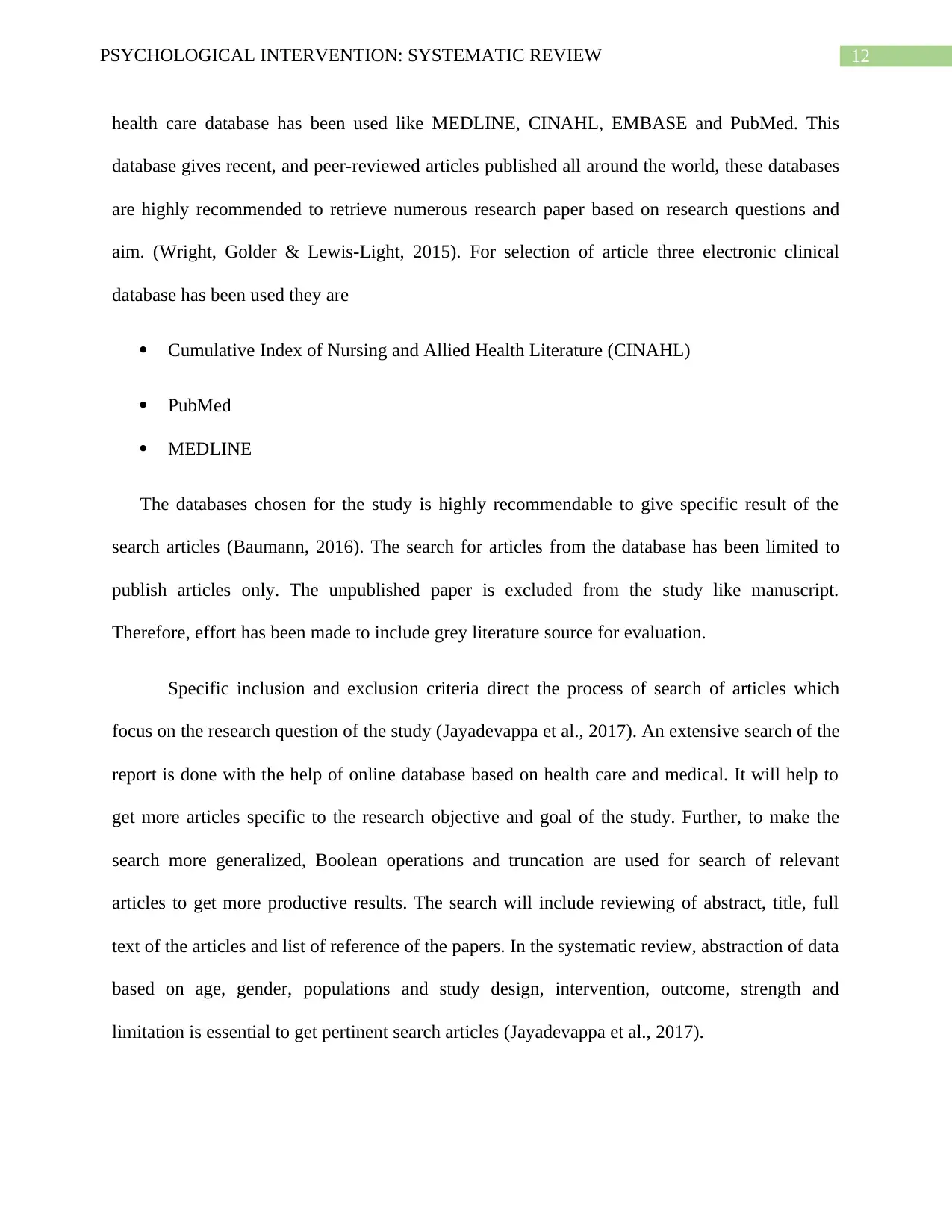
12PSYCHOLOGICAL INTERVENTION: SYSTEMATIC REVIEW
health care database has been used like MEDLINE, CINAHL, EMBASE and PubMed. This
database gives recent, and peer-reviewed articles published all around the world, these databases
are highly recommended to retrieve numerous research paper based on research questions and
aim. (Wright, Golder & Lewis-Light, 2015). For selection of article three electronic clinical
database has been used they are
Cumulative Index of Nursing and Allied Health Literature (CINAHL)
PubMed
MEDLINE
The databases chosen for the study is highly recommendable to give specific result of the
search articles (Baumann, 2016). The search for articles from the database has been limited to
publish articles only. The unpublished paper is excluded from the study like manuscript.
Therefore, effort has been made to include grey literature source for evaluation.
Specific inclusion and exclusion criteria direct the process of search of articles which
focus on the research question of the study (Jayadevappa et al., 2017). An extensive search of the
report is done with the help of online database based on health care and medical. It will help to
get more articles specific to the research objective and goal of the study. Further, to make the
search more generalized, Boolean operations and truncation are used for search of relevant
articles to get more productive results. The search will include reviewing of abstract, title, full
text of the articles and list of reference of the papers. In the systematic review, abstraction of data
based on age, gender, populations and study design, intervention, outcome, strength and
limitation is essential to get pertinent search articles (Jayadevappa et al., 2017).
health care database has been used like MEDLINE, CINAHL, EMBASE and PubMed. This
database gives recent, and peer-reviewed articles published all around the world, these databases
are highly recommended to retrieve numerous research paper based on research questions and
aim. (Wright, Golder & Lewis-Light, 2015). For selection of article three electronic clinical
database has been used they are
Cumulative Index of Nursing and Allied Health Literature (CINAHL)
PubMed
MEDLINE
The databases chosen for the study is highly recommendable to give specific result of the
search articles (Baumann, 2016). The search for articles from the database has been limited to
publish articles only. The unpublished paper is excluded from the study like manuscript.
Therefore, effort has been made to include grey literature source for evaluation.
Specific inclusion and exclusion criteria direct the process of search of articles which
focus on the research question of the study (Jayadevappa et al., 2017). An extensive search of the
report is done with the help of online database based on health care and medical. It will help to
get more articles specific to the research objective and goal of the study. Further, to make the
search more generalized, Boolean operations and truncation are used for search of relevant
articles to get more productive results. The search will include reviewing of abstract, title, full
text of the articles and list of reference of the papers. In the systematic review, abstraction of data
based on age, gender, populations and study design, intervention, outcome, strength and
limitation is essential to get pertinent search articles (Jayadevappa et al., 2017).
Paraphrase This Document
Need a fresh take? Get an instant paraphrase of this document with our AI Paraphraser
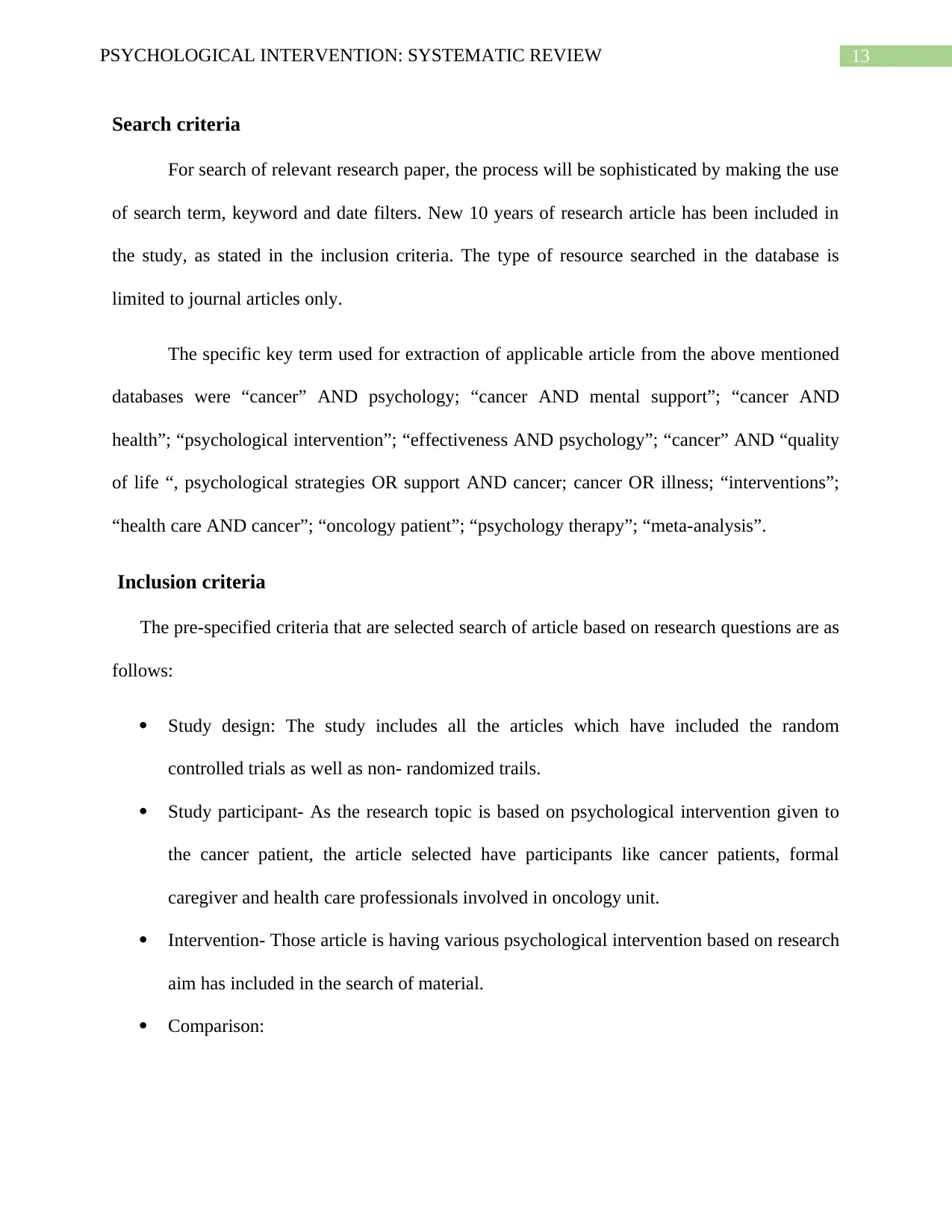
13PSYCHOLOGICAL INTERVENTION: SYSTEMATIC REVIEW
Search criteria
For search of relevant research paper, the process will be sophisticated by making the use
of search term, keyword and date filters. New 10 years of research article has been included in
the study, as stated in the inclusion criteria. The type of resource searched in the database is
limited to journal articles only.
The specific key term used for extraction of applicable article from the above mentioned
databases were “cancer” AND psychology; “cancer AND mental support”; “cancer AND
health”; “psychological intervention”; “effectiveness AND psychology”; “cancer” AND “quality
of life “, psychological strategies OR support AND cancer; cancer OR illness; “interventions”;
“health care AND cancer”; “oncology patient”; “psychology therapy”; “meta-analysis”.
Inclusion criteria
The pre-specified criteria that are selected search of article based on research questions are as
follows:
Study design: The study includes all the articles which have included the random
controlled trials as well as non- randomized trails.
Study participant- As the research topic is based on psychological intervention given to
the cancer patient, the article selected have participants like cancer patients, formal
caregiver and health care professionals involved in oncology unit.
Intervention- Those article is having various psychological intervention based on research
aim has included in the search of material.
Comparison:
Search criteria
For search of relevant research paper, the process will be sophisticated by making the use
of search term, keyword and date filters. New 10 years of research article has been included in
the study, as stated in the inclusion criteria. The type of resource searched in the database is
limited to journal articles only.
The specific key term used for extraction of applicable article from the above mentioned
databases were “cancer” AND psychology; “cancer AND mental support”; “cancer AND
health”; “psychological intervention”; “effectiveness AND psychology”; “cancer” AND “quality
of life “, psychological strategies OR support AND cancer; cancer OR illness; “interventions”;
“health care AND cancer”; “oncology patient”; “psychology therapy”; “meta-analysis”.
Inclusion criteria
The pre-specified criteria that are selected search of article based on research questions are as
follows:
Study design: The study includes all the articles which have included the random
controlled trials as well as non- randomized trails.
Study participant- As the research topic is based on psychological intervention given to
the cancer patient, the article selected have participants like cancer patients, formal
caregiver and health care professionals involved in oncology unit.
Intervention- Those article is having various psychological intervention based on research
aim has included in the search of material.
Comparison:
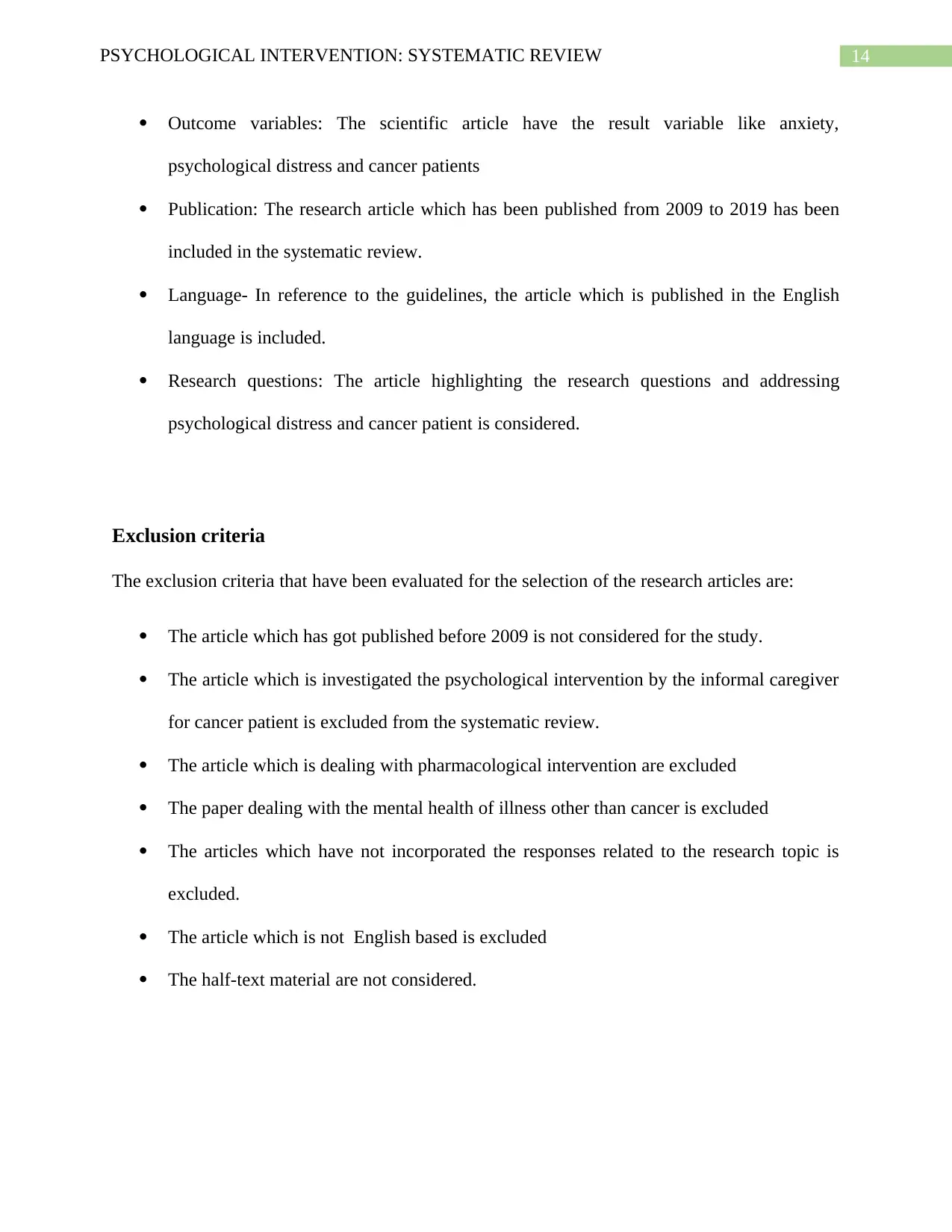
14PSYCHOLOGICAL INTERVENTION: SYSTEMATIC REVIEW
Outcome variables: The scientific article have the result variable like anxiety,
psychological distress and cancer patients
Publication: The research article which has been published from 2009 to 2019 has been
included in the systematic review.
Language- In reference to the guidelines, the article which is published in the English
language is included.
Research questions: The article highlighting the research questions and addressing
psychological distress and cancer patient is considered.
Exclusion criteria
The exclusion criteria that have been evaluated for the selection of the research articles are:
The article which has got published before 2009 is not considered for the study.
The article which is investigated the psychological intervention by the informal caregiver
for cancer patient is excluded from the systematic review.
The article which is dealing with pharmacological intervention are excluded
The paper dealing with the mental health of illness other than cancer is excluded
The articles which have not incorporated the responses related to the research topic is
excluded.
The article which is not English based is excluded
The half-text material are not considered.
Outcome variables: The scientific article have the result variable like anxiety,
psychological distress and cancer patients
Publication: The research article which has been published from 2009 to 2019 has been
included in the systematic review.
Language- In reference to the guidelines, the article which is published in the English
language is included.
Research questions: The article highlighting the research questions and addressing
psychological distress and cancer patient is considered.
Exclusion criteria
The exclusion criteria that have been evaluated for the selection of the research articles are:
The article which has got published before 2009 is not considered for the study.
The article which is investigated the psychological intervention by the informal caregiver
for cancer patient is excluded from the systematic review.
The article which is dealing with pharmacological intervention are excluded
The paper dealing with the mental health of illness other than cancer is excluded
The articles which have not incorporated the responses related to the research topic is
excluded.
The article which is not English based is excluded
The half-text material are not considered.
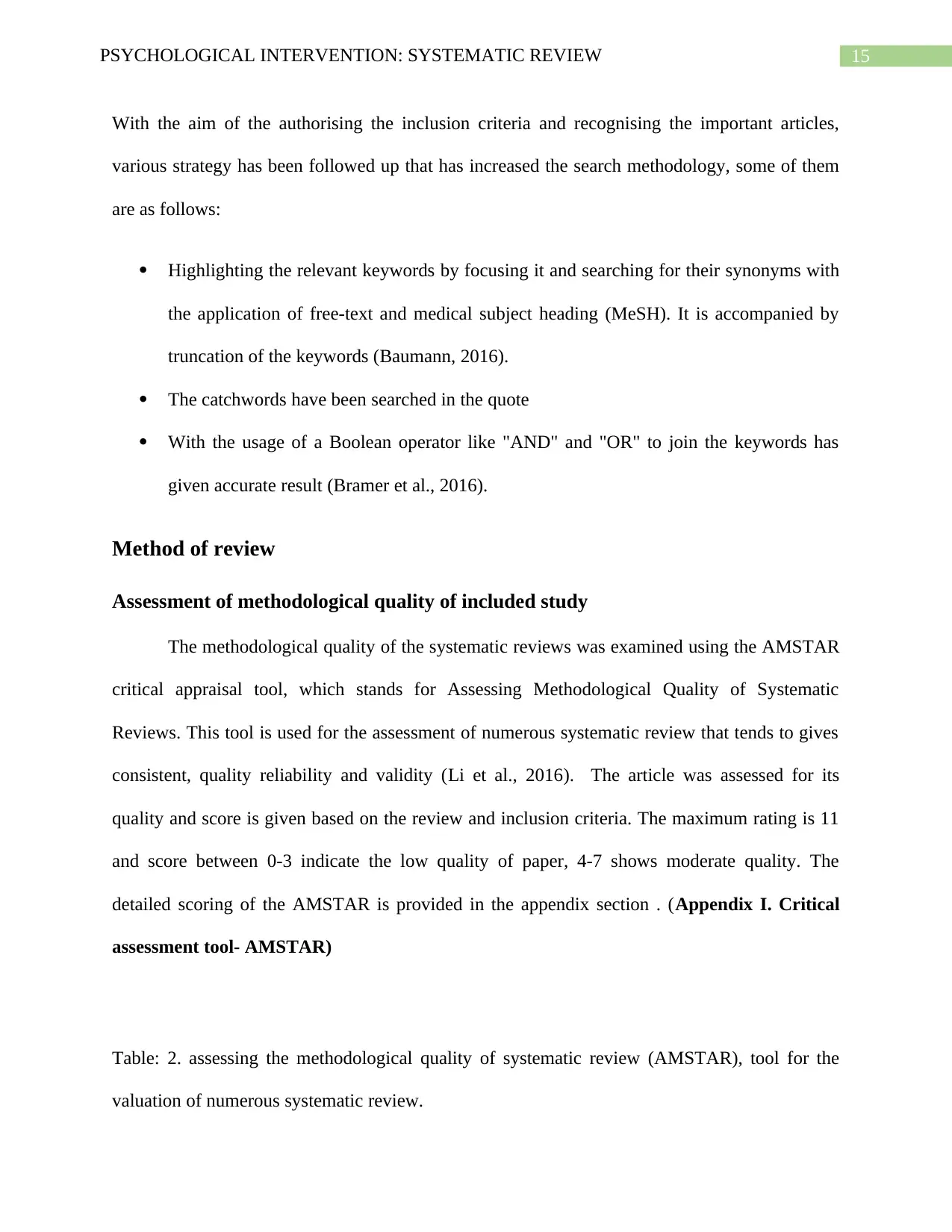
15PSYCHOLOGICAL INTERVENTION: SYSTEMATIC REVIEW
With the aim of the authorising the inclusion criteria and recognising the important articles,
various strategy has been followed up that has increased the search methodology, some of them
are as follows:
Highlighting the relevant keywords by focusing it and searching for their synonyms with
the application of free-text and medical subject heading (MeSH). It is accompanied by
truncation of the keywords (Baumann, 2016).
The catchwords have been searched in the quote
With the usage of a Boolean operator like "AND" and "OR" to join the keywords has
given accurate result (Bramer et al., 2016).
Method of review
Assessment of methodological quality of included study
The methodological quality of the systematic reviews was examined using the AMSTAR
critical appraisal tool, which stands for Assessing Methodological Quality of Systematic
Reviews. This tool is used for the assessment of numerous systematic review that tends to gives
consistent, quality reliability and validity (Li et al., 2016). The article was assessed for its
quality and score is given based on the review and inclusion criteria. The maximum rating is 11
and score between 0-3 indicate the low quality of paper, 4-7 shows moderate quality. The
detailed scoring of the AMSTAR is provided in the appendix section . (Appendix I. Critical
assessment tool- AMSTAR)
Table: 2. assessing the methodological quality of systematic review (AMSTAR), tool for the
valuation of numerous systematic review.
With the aim of the authorising the inclusion criteria and recognising the important articles,
various strategy has been followed up that has increased the search methodology, some of them
are as follows:
Highlighting the relevant keywords by focusing it and searching for their synonyms with
the application of free-text and medical subject heading (MeSH). It is accompanied by
truncation of the keywords (Baumann, 2016).
The catchwords have been searched in the quote
With the usage of a Boolean operator like "AND" and "OR" to join the keywords has
given accurate result (Bramer et al., 2016).
Method of review
Assessment of methodological quality of included study
The methodological quality of the systematic reviews was examined using the AMSTAR
critical appraisal tool, which stands for Assessing Methodological Quality of Systematic
Reviews. This tool is used for the assessment of numerous systematic review that tends to gives
consistent, quality reliability and validity (Li et al., 2016). The article was assessed for its
quality and score is given based on the review and inclusion criteria. The maximum rating is 11
and score between 0-3 indicate the low quality of paper, 4-7 shows moderate quality. The
detailed scoring of the AMSTAR is provided in the appendix section . (Appendix I. Critical
assessment tool- AMSTAR)
Table: 2. assessing the methodological quality of systematic review (AMSTAR), tool for the
valuation of numerous systematic review.
Secure Best Marks with AI Grader
Need help grading? Try our AI Grader for instant feedback on your assignments.
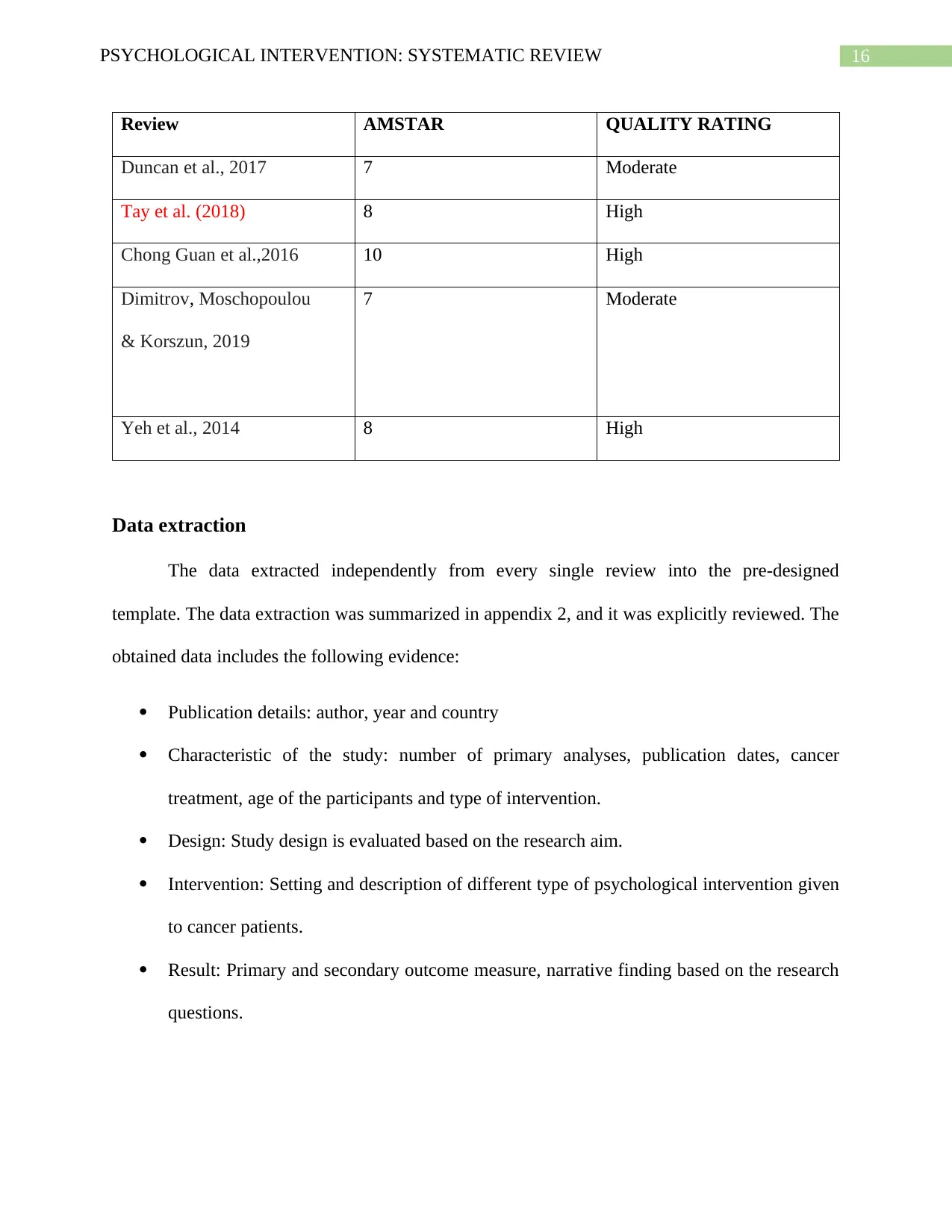
16PSYCHOLOGICAL INTERVENTION: SYSTEMATIC REVIEW
Review AMSTAR QUALITY RATING
Duncan et al., 2017 7 Moderate
Tay et al. (2018) 8 High
Chong Guan et al.,2016 10 High
Dimitrov, Moschopoulou
& Korszun, 2019
7 Moderate
Yeh et al., 2014 8 High
Data extraction
The data extracted independently from every single review into the pre-designed
template. The data extraction was summarized in appendix 2, and it was explicitly reviewed. The
obtained data includes the following evidence:
Publication details: author, year and country
Characteristic of the study: number of primary analyses, publication dates, cancer
treatment, age of the participants and type of intervention.
Design: Study design is evaluated based on the research aim.
Intervention: Setting and description of different type of psychological intervention given
to cancer patients.
Result: Primary and secondary outcome measure, narrative finding based on the research
questions.
Review AMSTAR QUALITY RATING
Duncan et al., 2017 7 Moderate
Tay et al. (2018) 8 High
Chong Guan et al.,2016 10 High
Dimitrov, Moschopoulou
& Korszun, 2019
7 Moderate
Yeh et al., 2014 8 High
Data extraction
The data extracted independently from every single review into the pre-designed
template. The data extraction was summarized in appendix 2, and it was explicitly reviewed. The
obtained data includes the following evidence:
Publication details: author, year and country
Characteristic of the study: number of primary analyses, publication dates, cancer
treatment, age of the participants and type of intervention.
Design: Study design is evaluated based on the research aim.
Intervention: Setting and description of different type of psychological intervention given
to cancer patients.
Result: Primary and secondary outcome measure, narrative finding based on the research
questions.
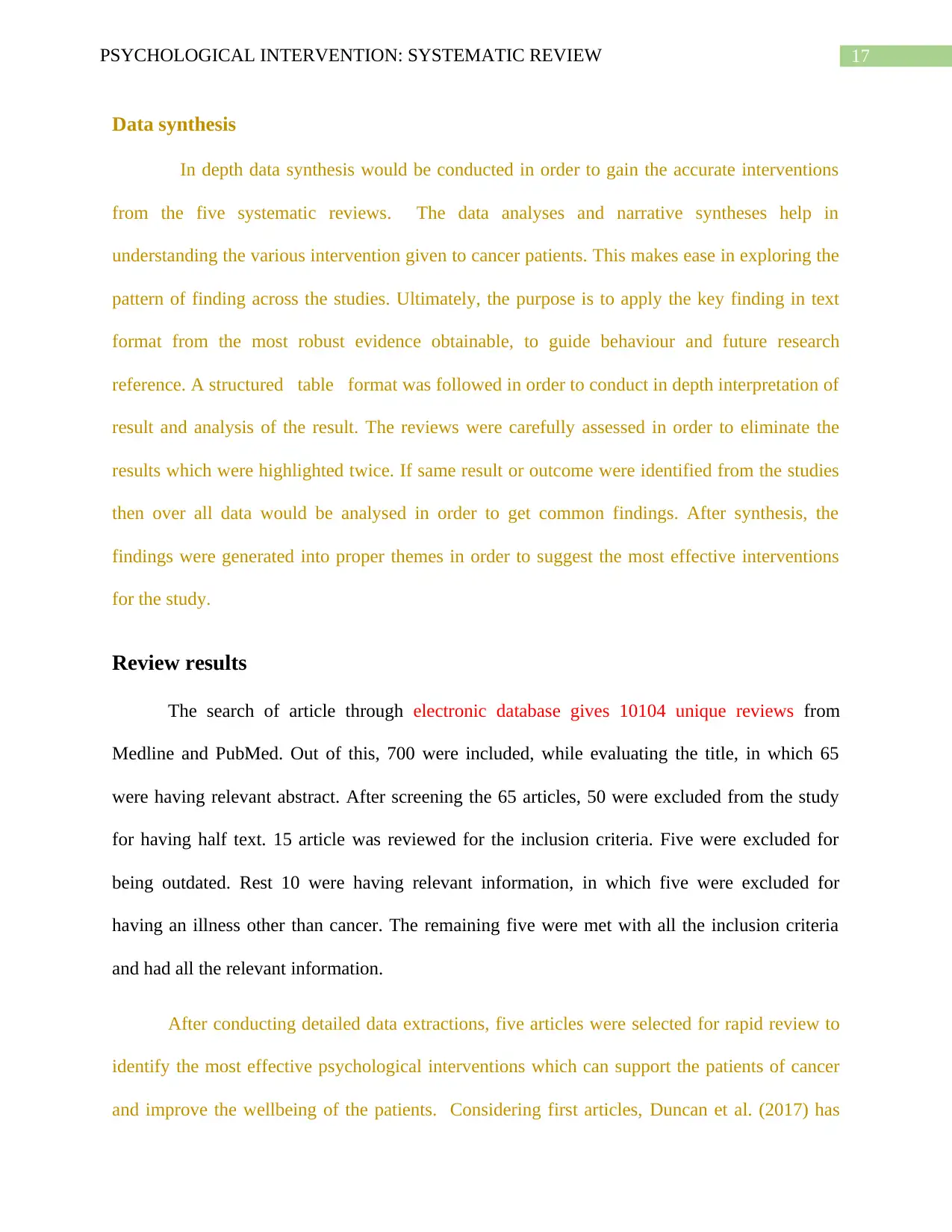
17PSYCHOLOGICAL INTERVENTION: SYSTEMATIC REVIEW
Data synthesis
In depth data synthesis would be conducted in order to gain the accurate interventions
from the five systematic reviews. The data analyses and narrative syntheses help in
understanding the various intervention given to cancer patients. This makes ease in exploring the
pattern of finding across the studies. Ultimately, the purpose is to apply the key finding in text
format from the most robust evidence obtainable, to guide behaviour and future research
reference. A structured table format was followed in order to conduct in depth interpretation of
result and analysis of the result. The reviews were carefully assessed in order to eliminate the
results which were highlighted twice. If same result or outcome were identified from the studies
then over all data would be analysed in order to get common findings. After synthesis, the
findings were generated into proper themes in order to suggest the most effective interventions
for the study.
Review results
The search of article through electronic database gives 10104 unique reviews from
Medline and PubMed. Out of this, 700 were included, while evaluating the title, in which 65
were having relevant abstract. After screening the 65 articles, 50 were excluded from the study
for having half text. 15 article was reviewed for the inclusion criteria. Five were excluded for
being outdated. Rest 10 were having relevant information, in which five were excluded for
having an illness other than cancer. The remaining five were met with all the inclusion criteria
and had all the relevant information.
After conducting detailed data extractions, five articles were selected for rapid review to
identify the most effective psychological interventions which can support the patients of cancer
and improve the wellbeing of the patients. Considering first articles, Duncan et al. (2017) has
Data synthesis
In depth data synthesis would be conducted in order to gain the accurate interventions
from the five systematic reviews. The data analyses and narrative syntheses help in
understanding the various intervention given to cancer patients. This makes ease in exploring the
pattern of finding across the studies. Ultimately, the purpose is to apply the key finding in text
format from the most robust evidence obtainable, to guide behaviour and future research
reference. A structured table format was followed in order to conduct in depth interpretation of
result and analysis of the result. The reviews were carefully assessed in order to eliminate the
results which were highlighted twice. If same result or outcome were identified from the studies
then over all data would be analysed in order to get common findings. After synthesis, the
findings were generated into proper themes in order to suggest the most effective interventions
for the study.
Review results
The search of article through electronic database gives 10104 unique reviews from
Medline and PubMed. Out of this, 700 were included, while evaluating the title, in which 65
were having relevant abstract. After screening the 65 articles, 50 were excluded from the study
for having half text. 15 article was reviewed for the inclusion criteria. Five were excluded for
being outdated. Rest 10 were having relevant information, in which five were excluded for
having an illness other than cancer. The remaining five were met with all the inclusion criteria
and had all the relevant information.
After conducting detailed data extractions, five articles were selected for rapid review to
identify the most effective psychological interventions which can support the patients of cancer
and improve the wellbeing of the patients. Considering first articles, Duncan et al. (2017) has
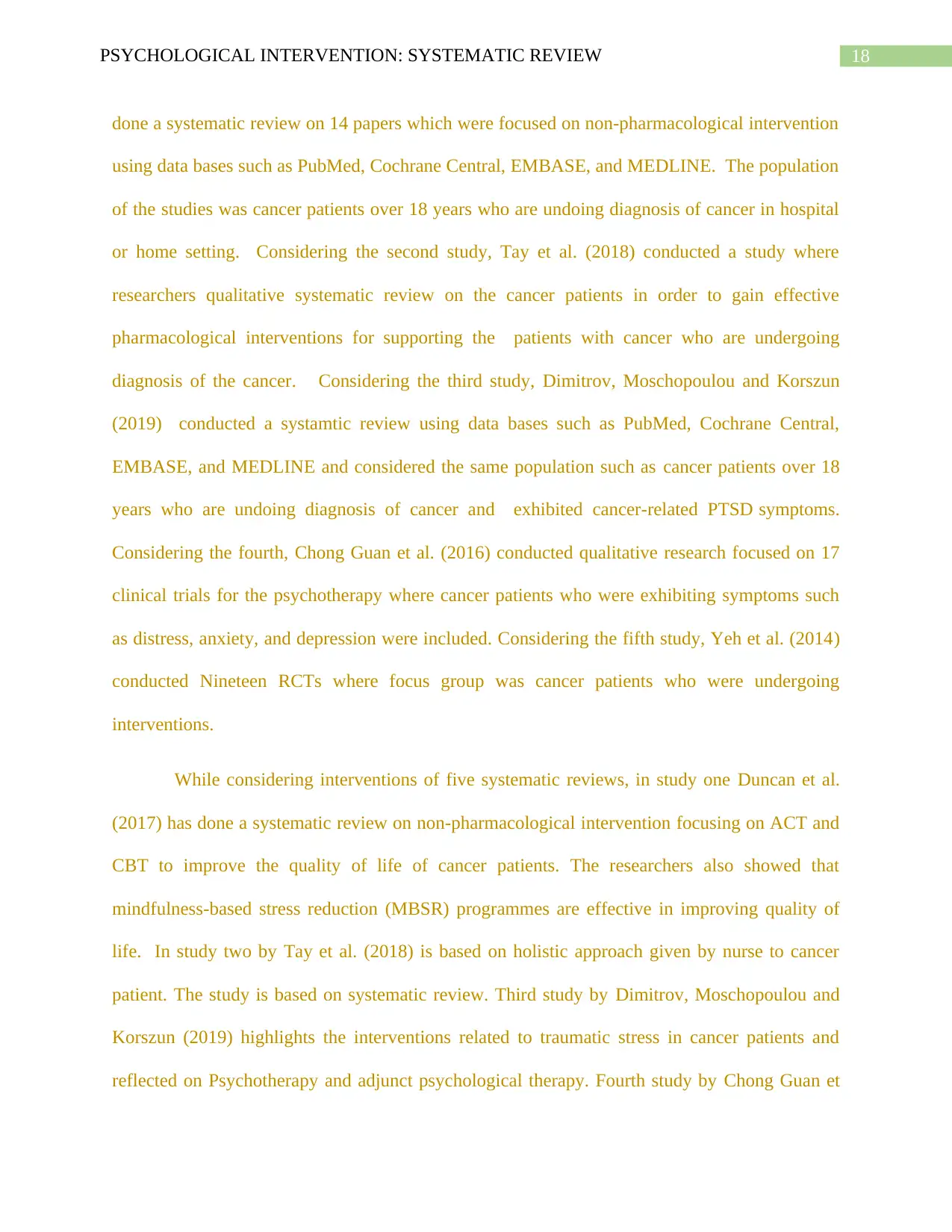
18PSYCHOLOGICAL INTERVENTION: SYSTEMATIC REVIEW
done a systematic review on 14 papers which were focused on non-pharmacological intervention
using data bases such as PubMed, Cochrane Central, EMBASE, and MEDLINE. The population
of the studies was cancer patients over 18 years who are undoing diagnosis of cancer in hospital
or home setting. Considering the second study, Tay et al. (2018) conducted a study where
researchers qualitative systematic review on the cancer patients in order to gain effective
pharmacological interventions for supporting the patients with cancer who are undergoing
diagnosis of the cancer. Considering the third study, Dimitrov, Moschopoulou and Korszun
(2019) conducted a systamtic review using data bases such as PubMed, Cochrane Central,
EMBASE, and MEDLINE and considered the same population such as cancer patients over 18
years who are undoing diagnosis of cancer and exhibited cancer-related PTSD symptoms.
Considering the fourth, Chong Guan et al. (2016) conducted qualitative research focused on 17
clinical trials for the psychotherapy where cancer patients who were exhibiting symptoms such
as distress, anxiety, and depression were included. Considering the fifth study, Yeh et al. (2014)
conducted Nineteen RCTs where focus group was cancer patients who were undergoing
interventions.
While considering interventions of five systematic reviews, in study one Duncan et al.
(2017) has done a systematic review on non-pharmacological intervention focusing on ACT and
CBT to improve the quality of life of cancer patients. The researchers also showed that
mindfulness-based stress reduction (MBSR) programmes are effective in improving quality of
life. In study two by Tay et al. (2018) is based on holistic approach given by nurse to cancer
patient. The study is based on systematic review. Third study by Dimitrov, Moschopoulou and
Korszun (2019) highlights the interventions related to traumatic stress in cancer patients and
reflected on Psychotherapy and adjunct psychological therapy. Fourth study by Chong Guan et
done a systematic review on 14 papers which were focused on non-pharmacological intervention
using data bases such as PubMed, Cochrane Central, EMBASE, and MEDLINE. The population
of the studies was cancer patients over 18 years who are undoing diagnosis of cancer in hospital
or home setting. Considering the second study, Tay et al. (2018) conducted a study where
researchers qualitative systematic review on the cancer patients in order to gain effective
pharmacological interventions for supporting the patients with cancer who are undergoing
diagnosis of the cancer. Considering the third study, Dimitrov, Moschopoulou and Korszun
(2019) conducted a systamtic review using data bases such as PubMed, Cochrane Central,
EMBASE, and MEDLINE and considered the same population such as cancer patients over 18
years who are undoing diagnosis of cancer and exhibited cancer-related PTSD symptoms.
Considering the fourth, Chong Guan et al. (2016) conducted qualitative research focused on 17
clinical trials for the psychotherapy where cancer patients who were exhibiting symptoms such
as distress, anxiety, and depression were included. Considering the fifth study, Yeh et al. (2014)
conducted Nineteen RCTs where focus group was cancer patients who were undergoing
interventions.
While considering interventions of five systematic reviews, in study one Duncan et al.
(2017) has done a systematic review on non-pharmacological intervention focusing on ACT and
CBT to improve the quality of life of cancer patients. The researchers also showed that
mindfulness-based stress reduction (MBSR) programmes are effective in improving quality of
life. In study two by Tay et al. (2018) is based on holistic approach given by nurse to cancer
patient. The study is based on systematic review. Third study by Dimitrov, Moschopoulou and
Korszun (2019) highlights the interventions related to traumatic stress in cancer patients and
reflected on Psychotherapy and adjunct psychological therapy. Fourth study by Chong Guan et
Paraphrase This Document
Need a fresh take? Get an instant paraphrase of this document with our AI Paraphraser
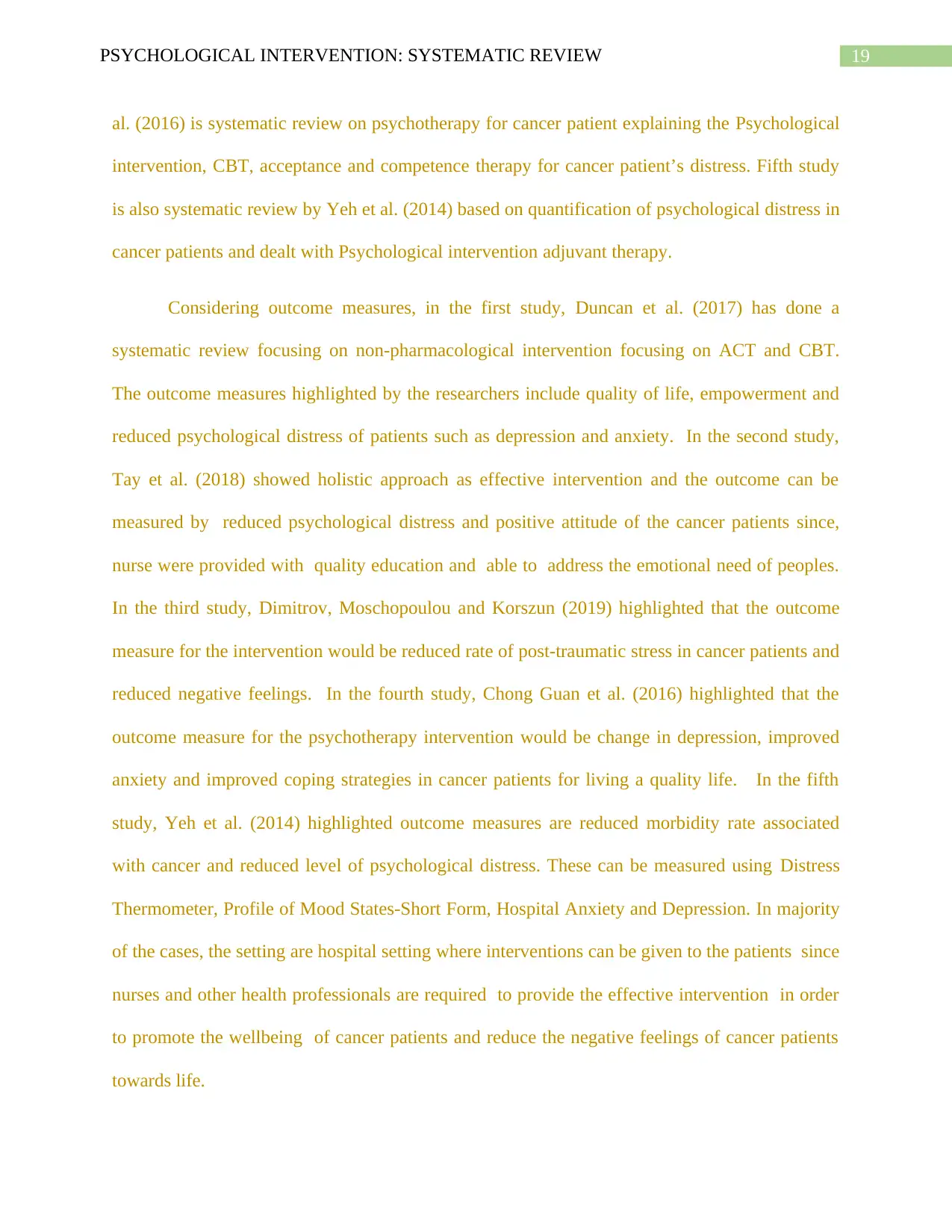
19PSYCHOLOGICAL INTERVENTION: SYSTEMATIC REVIEW
al. (2016) is systematic review on psychotherapy for cancer patient explaining the Psychological
intervention, CBT, acceptance and competence therapy for cancer patient’s distress. Fifth study
is also systematic review by Yeh et al. (2014) based on quantification of psychological distress in
cancer patients and dealt with Psychological intervention adjuvant therapy.
Considering outcome measures, in the first study, Duncan et al. (2017) has done a
systematic review focusing on non-pharmacological intervention focusing on ACT and CBT.
The outcome measures highlighted by the researchers include quality of life, empowerment and
reduced psychological distress of patients such as depression and anxiety. In the second study,
Tay et al. (2018) showed holistic approach as effective intervention and the outcome can be
measured by reduced psychological distress and positive attitude of the cancer patients since,
nurse were provided with quality education and able to address the emotional need of peoples.
In the third study, Dimitrov, Moschopoulou and Korszun (2019) highlighted that the outcome
measure for the intervention would be reduced rate of post-traumatic stress in cancer patients and
reduced negative feelings. In the fourth study, Chong Guan et al. (2016) highlighted that the
outcome measure for the psychotherapy intervention would be change in depression, improved
anxiety and improved coping strategies in cancer patients for living a quality life. In the fifth
study, Yeh et al. (2014) highlighted outcome measures are reduced morbidity rate associated
with cancer and reduced level of psychological distress. These can be measured using Distress
Thermometer, Profile of Mood States-Short Form, Hospital Anxiety and Depression. In majority
of the cases, the setting are hospital setting where interventions can be given to the patients since
nurses and other health professionals are required to provide the effective intervention in order
to promote the wellbeing of cancer patients and reduce the negative feelings of cancer patients
towards life.
al. (2016) is systematic review on psychotherapy for cancer patient explaining the Psychological
intervention, CBT, acceptance and competence therapy for cancer patient’s distress. Fifth study
is also systematic review by Yeh et al. (2014) based on quantification of psychological distress in
cancer patients and dealt with Psychological intervention adjuvant therapy.
Considering outcome measures, in the first study, Duncan et al. (2017) has done a
systematic review focusing on non-pharmacological intervention focusing on ACT and CBT.
The outcome measures highlighted by the researchers include quality of life, empowerment and
reduced psychological distress of patients such as depression and anxiety. In the second study,
Tay et al. (2018) showed holistic approach as effective intervention and the outcome can be
measured by reduced psychological distress and positive attitude of the cancer patients since,
nurse were provided with quality education and able to address the emotional need of peoples.
In the third study, Dimitrov, Moschopoulou and Korszun (2019) highlighted that the outcome
measure for the intervention would be reduced rate of post-traumatic stress in cancer patients and
reduced negative feelings. In the fourth study, Chong Guan et al. (2016) highlighted that the
outcome measure for the psychotherapy intervention would be change in depression, improved
anxiety and improved coping strategies in cancer patients for living a quality life. In the fifth
study, Yeh et al. (2014) highlighted outcome measures are reduced morbidity rate associated
with cancer and reduced level of psychological distress. These can be measured using Distress
Thermometer, Profile of Mood States-Short Form, Hospital Anxiety and Depression. In majority
of the cases, the setting are hospital setting where interventions can be given to the patients since
nurses and other health professionals are required to provide the effective intervention in order
to promote the wellbeing of cancer patients and reduce the negative feelings of cancer patients
towards life.

20PSYCHOLOGICAL INTERVENTION: SYSTEMATIC REVIEW
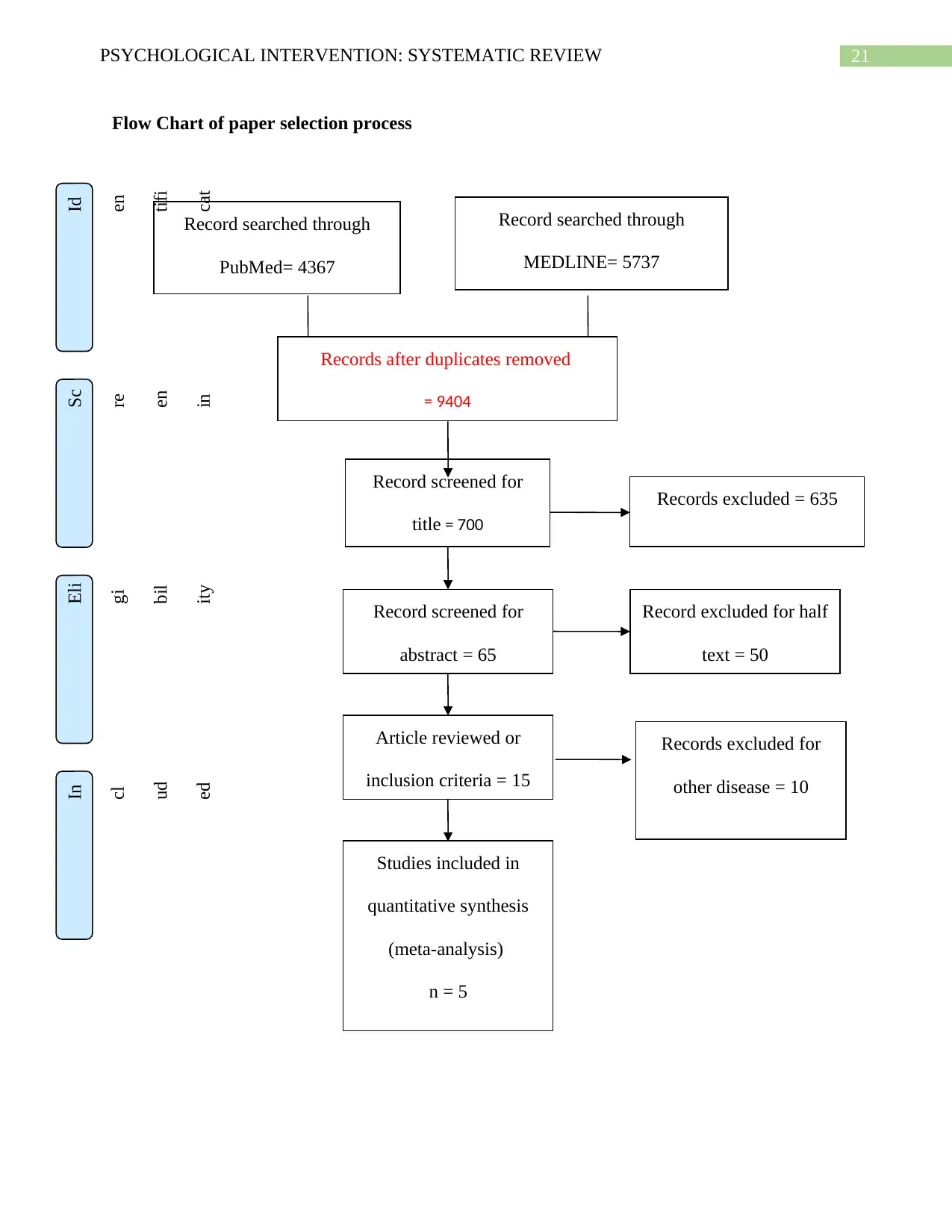
21PSYCHOLOGICAL INTERVENTION: SYSTEMATIC REVIEW
Flow Chart of paper selection process
Record searched through
PubMed= 4367
Sc
re
en
in
g
In
cl
ud
ed
Eli
gi
bil
ity
Id
en
tifi
cat
io
Records after duplicates removed
= 9404
Record screened for
title = 700
Records excluded = 635
Record screened for
abstract = 65
Record excluded for half
text = 50
Article reviewed or
inclusion criteria = 15
Studies included in
quantitative synthesis
(meta-analysis)
n = 5
Records excluded for
other disease = 10
Record searched through
MEDLINE= 5737
Flow Chart of paper selection process
Record searched through
PubMed= 4367
Sc
re
en
in
g
In
cl
ud
ed
Eli
gi
bil
ity
Id
en
tifi
cat
io
Records after duplicates removed
= 9404
Record screened for
title = 700
Records excluded = 635
Record screened for
abstract = 65
Record excluded for half
text = 50
Article reviewed or
inclusion criteria = 15
Studies included in
quantitative synthesis
(meta-analysis)
n = 5
Records excluded for
other disease = 10
Record searched through
MEDLINE= 5737
Secure Best Marks with AI Grader
Need help grading? Try our AI Grader for instant feedback on your assignments.
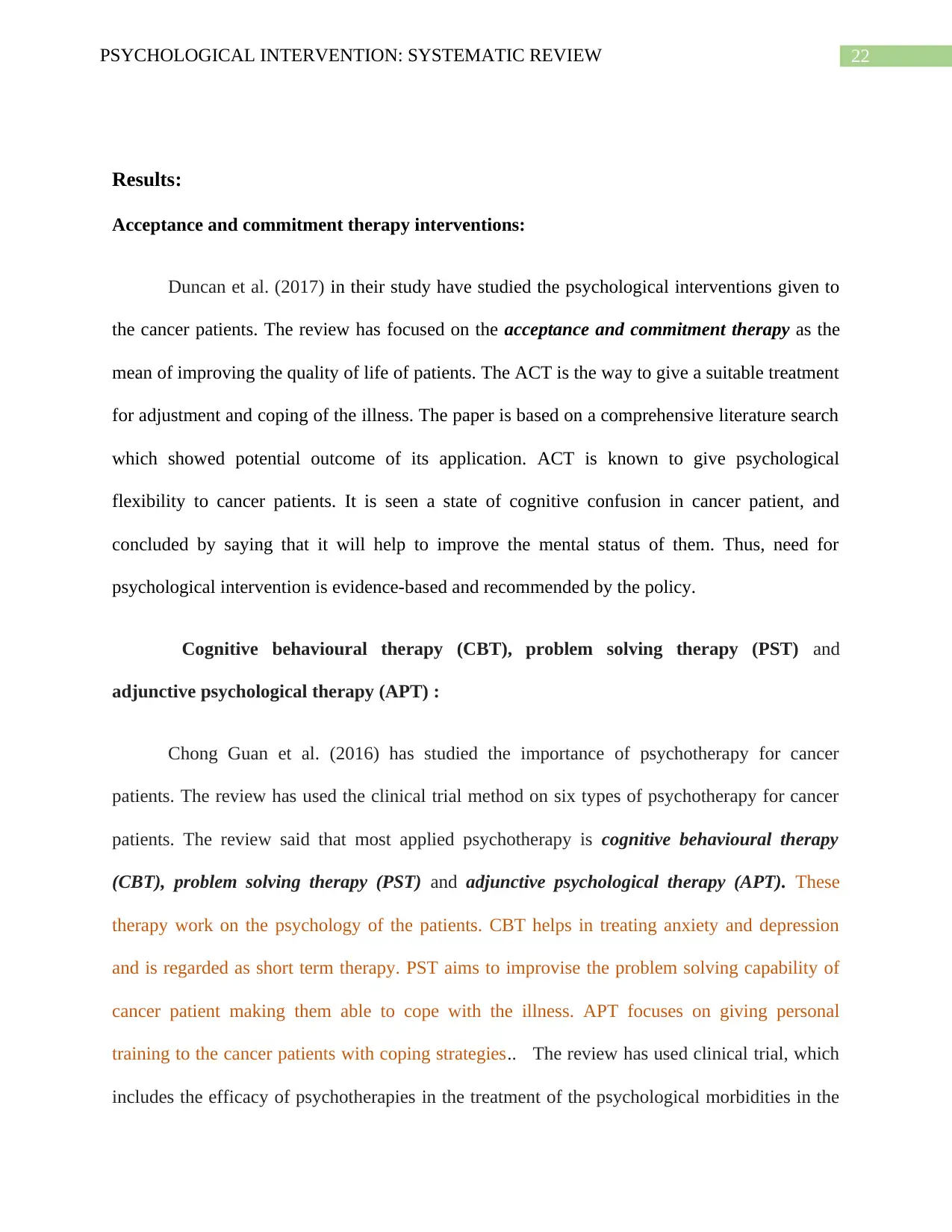
22PSYCHOLOGICAL INTERVENTION: SYSTEMATIC REVIEW
Results:
Acceptance and commitment therapy interventions:
Duncan et al. (2017) in their study have studied the psychological interventions given to
the cancer patients. The review has focused on the acceptance and commitment therapy as the
mean of improving the quality of life of patients. The ACT is the way to give a suitable treatment
for adjustment and coping of the illness. The paper is based on a comprehensive literature search
which showed potential outcome of its application. ACT is known to give psychological
flexibility to cancer patients. It is seen a state of cognitive confusion in cancer patient, and
concluded by saying that it will help to improve the mental status of them. Thus, need for
psychological intervention is evidence-based and recommended by the policy.
Cognitive behavioural therapy (CBT), problem solving therapy (PST) and
adjunctive psychological therapy (APT) :
Chong Guan et al. (2016) has studied the importance of psychotherapy for cancer
patients. The review has used the clinical trial method on six types of psychotherapy for cancer
patients. The review said that most applied psychotherapy is cognitive behavioural therapy
(CBT), problem solving therapy (PST) and adjunctive psychological therapy (APT). These
therapy work on the psychology of the patients. CBT helps in treating anxiety and depression
and is regarded as short term therapy. PST aims to improvise the problem solving capability of
cancer patient making them able to cope with the illness. APT focuses on giving personal
training to the cancer patients with coping strategies.. The review has used clinical trial, which
includes the efficacy of psychotherapies in the treatment of the psychological morbidities in the
Results:
Acceptance and commitment therapy interventions:
Duncan et al. (2017) in their study have studied the psychological interventions given to
the cancer patients. The review has focused on the acceptance and commitment therapy as the
mean of improving the quality of life of patients. The ACT is the way to give a suitable treatment
for adjustment and coping of the illness. The paper is based on a comprehensive literature search
which showed potential outcome of its application. ACT is known to give psychological
flexibility to cancer patients. It is seen a state of cognitive confusion in cancer patient, and
concluded by saying that it will help to improve the mental status of them. Thus, need for
psychological intervention is evidence-based and recommended by the policy.
Cognitive behavioural therapy (CBT), problem solving therapy (PST) and
adjunctive psychological therapy (APT) :
Chong Guan et al. (2016) has studied the importance of psychotherapy for cancer
patients. The review has used the clinical trial method on six types of psychotherapy for cancer
patients. The review said that most applied psychotherapy is cognitive behavioural therapy
(CBT), problem solving therapy (PST) and adjunctive psychological therapy (APT). These
therapy work on the psychology of the patients. CBT helps in treating anxiety and depression
and is regarded as short term therapy. PST aims to improvise the problem solving capability of
cancer patient making them able to cope with the illness. APT focuses on giving personal
training to the cancer patients with coping strategies.. The review has used clinical trial, which
includes the efficacy of psychotherapies in the treatment of the psychological morbidities in the
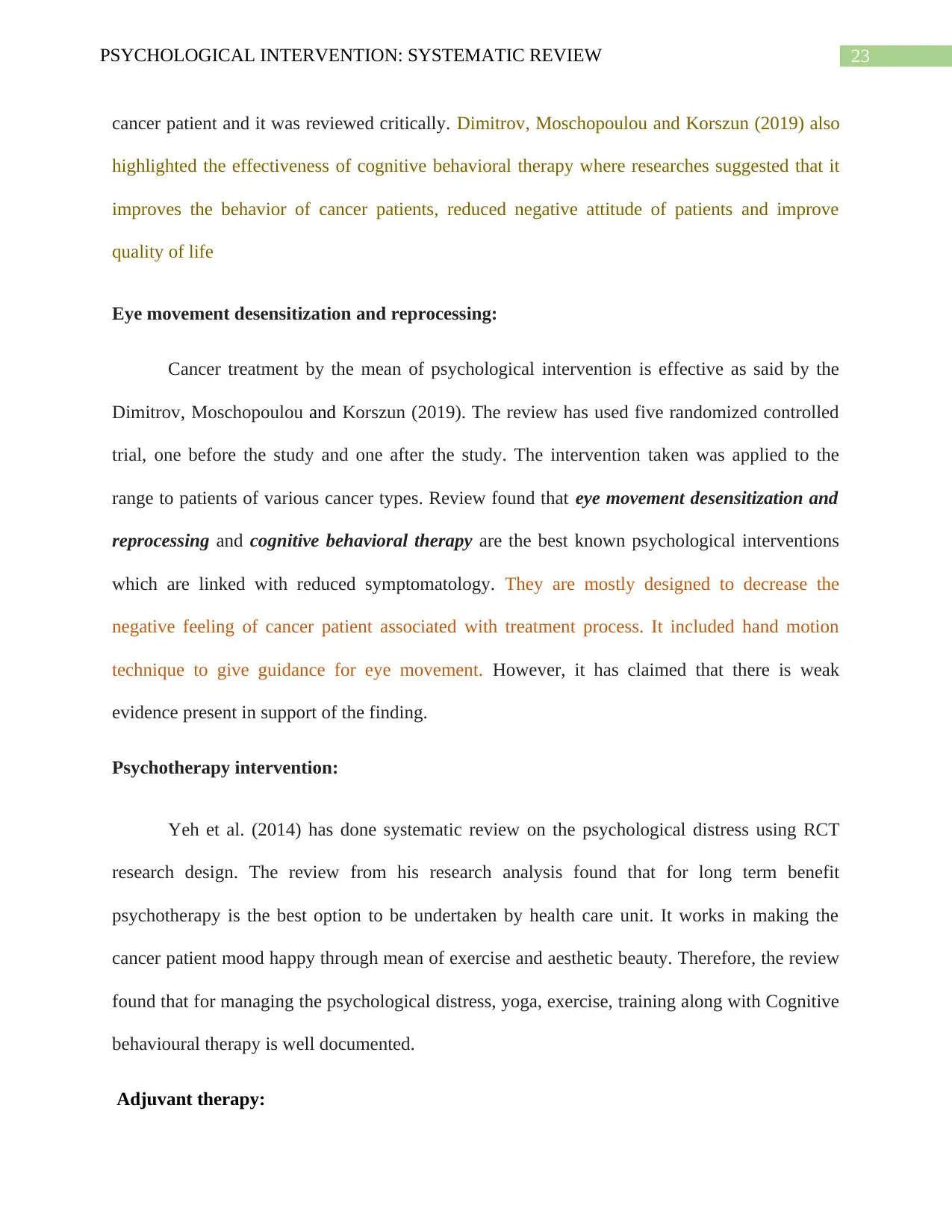
23PSYCHOLOGICAL INTERVENTION: SYSTEMATIC REVIEW
cancer patient and it was reviewed critically. Dimitrov, Moschopoulou and Korszun (2019) also
highlighted the effectiveness of cognitive behavioral therapy where researches suggested that it
improves the behavior of cancer patients, reduced negative attitude of patients and improve
quality of life
Eye movement desensitization and reprocessing:
Cancer treatment by the mean of psychological intervention is effective as said by the
Dimitrov, Moschopoulou and Korszun (2019). The review has used five randomized controlled
trial, one before the study and one after the study. The intervention taken was applied to the
range to patients of various cancer types. Review found that eye movement desensitization and
reprocessing and cognitive behavioral therapy are the best known psychological interventions
which are linked with reduced symptomatology. They are mostly designed to decrease the
negative feeling of cancer patient associated with treatment process. It included hand motion
technique to give guidance for eye movement. However, it has claimed that there is weak
evidence present in support of the finding.
Psychotherapy intervention:
Yeh et al. (2014) has done systematic review on the psychological distress using RCT
research design. The review from his research analysis found that for long term benefit
psychotherapy is the best option to be undertaken by health care unit. It works in making the
cancer patient mood happy through mean of exercise and aesthetic beauty. Therefore, the review
found that for managing the psychological distress, yoga, exercise, training along with Cognitive
behavioural therapy is well documented.
Adjuvant therapy:
cancer patient and it was reviewed critically. Dimitrov, Moschopoulou and Korszun (2019) also
highlighted the effectiveness of cognitive behavioral therapy where researches suggested that it
improves the behavior of cancer patients, reduced negative attitude of patients and improve
quality of life
Eye movement desensitization and reprocessing:
Cancer treatment by the mean of psychological intervention is effective as said by the
Dimitrov, Moschopoulou and Korszun (2019). The review has used five randomized controlled
trial, one before the study and one after the study. The intervention taken was applied to the
range to patients of various cancer types. Review found that eye movement desensitization and
reprocessing and cognitive behavioral therapy are the best known psychological interventions
which are linked with reduced symptomatology. They are mostly designed to decrease the
negative feeling of cancer patient associated with treatment process. It included hand motion
technique to give guidance for eye movement. However, it has claimed that there is weak
evidence present in support of the finding.
Psychotherapy intervention:
Yeh et al. (2014) has done systematic review on the psychological distress using RCT
research design. The review from his research analysis found that for long term benefit
psychotherapy is the best option to be undertaken by health care unit. It works in making the
cancer patient mood happy through mean of exercise and aesthetic beauty. Therefore, the review
found that for managing the psychological distress, yoga, exercise, training along with Cognitive
behavioural therapy is well documented.
Adjuvant therapy:
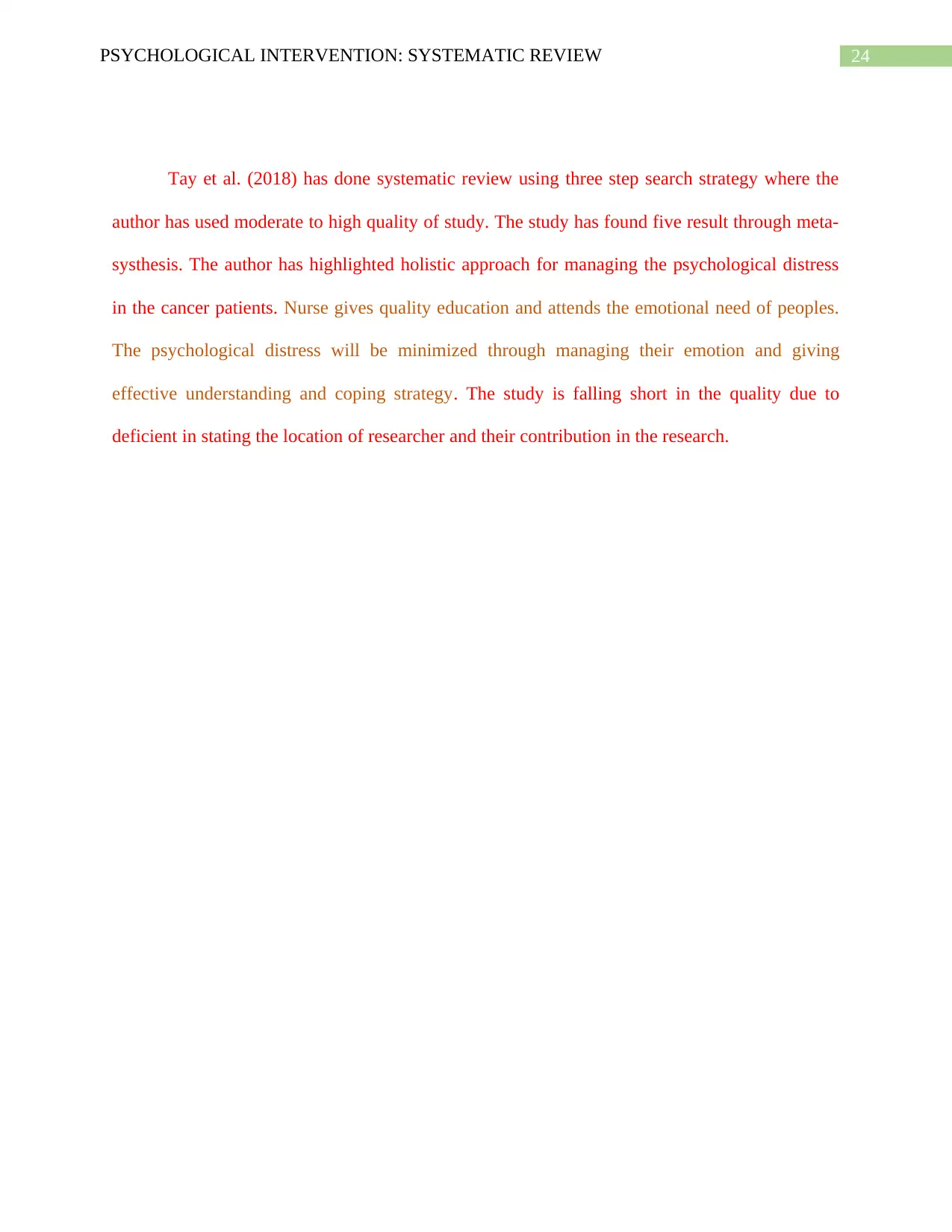
24PSYCHOLOGICAL INTERVENTION: SYSTEMATIC REVIEW
Tay et al. (2018) has done systematic review using three step search strategy where the
author has used moderate to high quality of study. The study has found five result through meta-
systhesis. The author has highlighted holistic approach for managing the psychological distress
in the cancer patients. Nurse gives quality education and attends the emotional need of peoples.
The psychological distress will be minimized through managing their emotion and giving
effective understanding and coping strategy. The study is falling short in the quality due to
deficient in stating the location of researcher and their contribution in the research.
Tay et al. (2018) has done systematic review using three step search strategy where the
author has used moderate to high quality of study. The study has found five result through meta-
systhesis. The author has highlighted holistic approach for managing the psychological distress
in the cancer patients. Nurse gives quality education and attends the emotional need of peoples.
The psychological distress will be minimized through managing their emotion and giving
effective understanding and coping strategy. The study is falling short in the quality due to
deficient in stating the location of researcher and their contribution in the research.
Paraphrase This Document
Need a fresh take? Get an instant paraphrase of this document with our AI Paraphraser
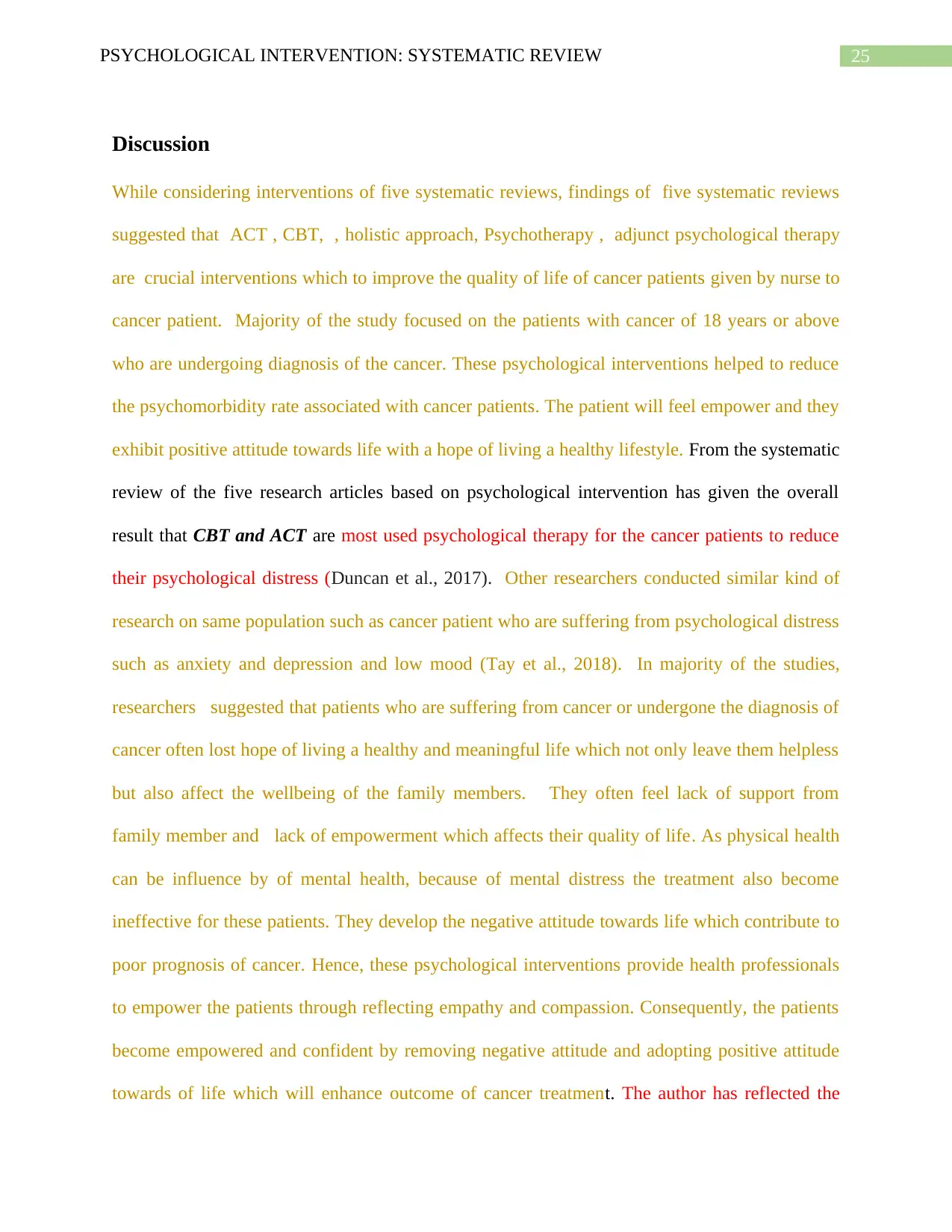
25PSYCHOLOGICAL INTERVENTION: SYSTEMATIC REVIEW
Discussion
While considering interventions of five systematic reviews, findings of five systematic reviews
suggested that ACT , CBT, , holistic approach, Psychotherapy , adjunct psychological therapy
are crucial interventions which to improve the quality of life of cancer patients given by nurse to
cancer patient. Majority of the study focused on the patients with cancer of 18 years or above
who are undergoing diagnosis of the cancer. These psychological interventions helped to reduce
the psychomorbidity rate associated with cancer patients. The patient will feel empower and they
exhibit positive attitude towards life with a hope of living a healthy lifestyle. From the systematic
review of the five research articles based on psychological intervention has given the overall
result that CBT and ACT are most used psychological therapy for the cancer patients to reduce
their psychological distress (Duncan et al., 2017). Other researchers conducted similar kind of
research on same population such as cancer patient who are suffering from psychological distress
such as anxiety and depression and low mood (Tay et al., 2018). In majority of the studies,
researchers suggested that patients who are suffering from cancer or undergone the diagnosis of
cancer often lost hope of living a healthy and meaningful life which not only leave them helpless
but also affect the wellbeing of the family members. They often feel lack of support from
family member and lack of empowerment which affects their quality of life. As physical health
can be influence by of mental health, because of mental distress the treatment also become
ineffective for these patients. They develop the negative attitude towards life which contribute to
poor prognosis of cancer. Hence, these psychological interventions provide health professionals
to empower the patients through reflecting empathy and compassion. Consequently, the patients
become empowered and confident by removing negative attitude and adopting positive attitude
towards of life which will enhance outcome of cancer treatment. The author has reflected the
Discussion
While considering interventions of five systematic reviews, findings of five systematic reviews
suggested that ACT , CBT, , holistic approach, Psychotherapy , adjunct psychological therapy
are crucial interventions which to improve the quality of life of cancer patients given by nurse to
cancer patient. Majority of the study focused on the patients with cancer of 18 years or above
who are undergoing diagnosis of the cancer. These psychological interventions helped to reduce
the psychomorbidity rate associated with cancer patients. The patient will feel empower and they
exhibit positive attitude towards life with a hope of living a healthy lifestyle. From the systematic
review of the five research articles based on psychological intervention has given the overall
result that CBT and ACT are most used psychological therapy for the cancer patients to reduce
their psychological distress (Duncan et al., 2017). Other researchers conducted similar kind of
research on same population such as cancer patient who are suffering from psychological distress
such as anxiety and depression and low mood (Tay et al., 2018). In majority of the studies,
researchers suggested that patients who are suffering from cancer or undergone the diagnosis of
cancer often lost hope of living a healthy and meaningful life which not only leave them helpless
but also affect the wellbeing of the family members. They often feel lack of support from
family member and lack of empowerment which affects their quality of life. As physical health
can be influence by of mental health, because of mental distress the treatment also become
ineffective for these patients. They develop the negative attitude towards life which contribute to
poor prognosis of cancer. Hence, these psychological interventions provide health professionals
to empower the patients through reflecting empathy and compassion. Consequently, the patients
become empowered and confident by removing negative attitude and adopting positive attitude
towards of life which will enhance outcome of cancer treatment. The author has reflected the
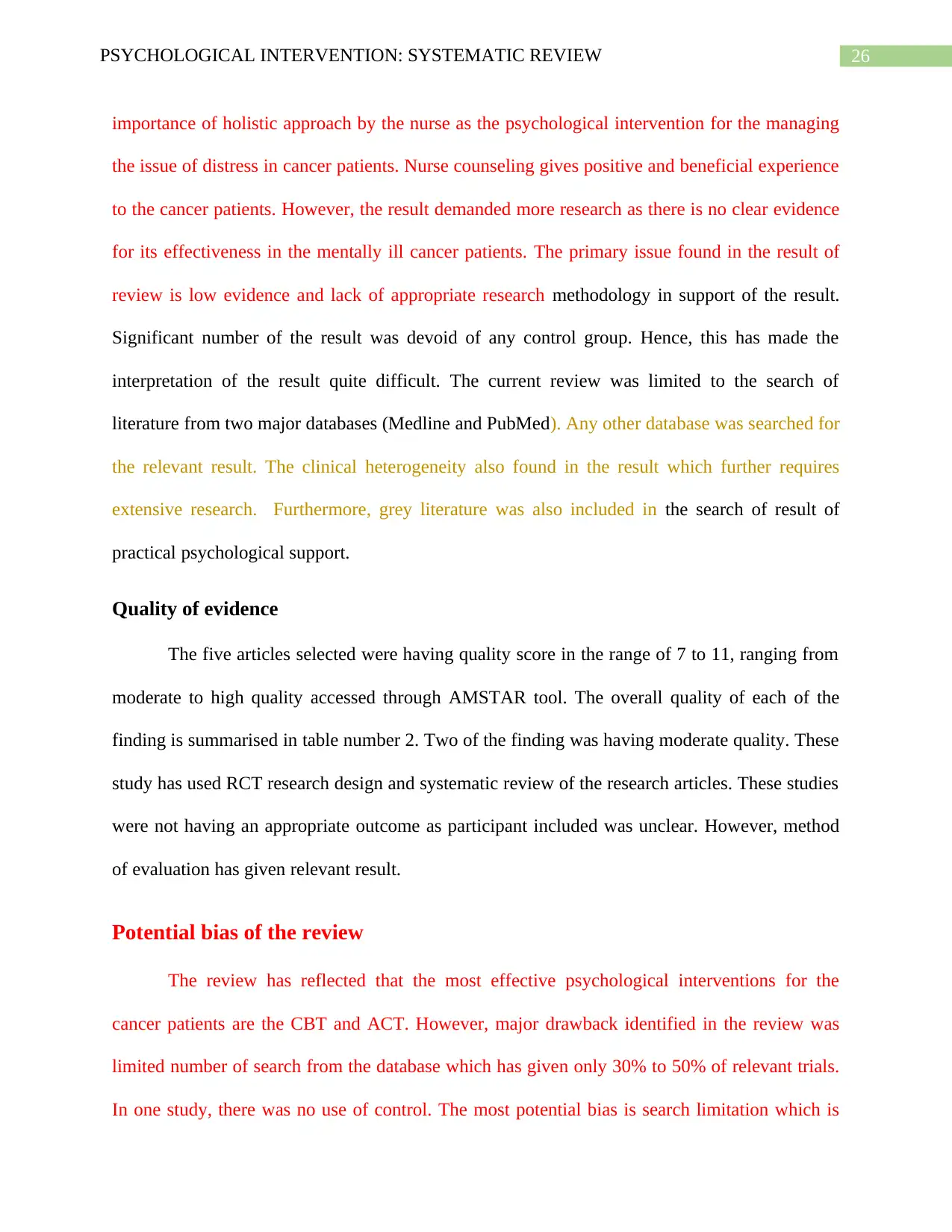
26PSYCHOLOGICAL INTERVENTION: SYSTEMATIC REVIEW
importance of holistic approach by the nurse as the psychological intervention for the managing
the issue of distress in cancer patients. Nurse counseling gives positive and beneficial experience
to the cancer patients. However, the result demanded more research as there is no clear evidence
for its effectiveness in the mentally ill cancer patients. The primary issue found in the result of
review is low evidence and lack of appropriate research methodology in support of the result.
Significant number of the result was devoid of any control group. Hence, this has made the
interpretation of the result quite difficult. The current review was limited to the search of
literature from two major databases (Medline and PubMed). Any other database was searched for
the relevant result. The clinical heterogeneity also found in the result which further requires
extensive research. Furthermore, grey literature was also included in the search of result of
practical psychological support.
Quality of evidence
The five articles selected were having quality score in the range of 7 to 11, ranging from
moderate to high quality accessed through AMSTAR tool. The overall quality of each of the
finding is summarised in table number 2. Two of the finding was having moderate quality. These
study has used RCT research design and systematic review of the research articles. These studies
were not having an appropriate outcome as participant included was unclear. However, method
of evaluation has given relevant result.
Potential bias of the review
The review has reflected that the most effective psychological interventions for the
cancer patients are the CBT and ACT. However, major drawback identified in the review was
limited number of search from the database which has given only 30% to 50% of relevant trials.
In one study, there was no use of control. The most potential bias is search limitation which is
importance of holistic approach by the nurse as the psychological intervention for the managing
the issue of distress in cancer patients. Nurse counseling gives positive and beneficial experience
to the cancer patients. However, the result demanded more research as there is no clear evidence
for its effectiveness in the mentally ill cancer patients. The primary issue found in the result of
review is low evidence and lack of appropriate research methodology in support of the result.
Significant number of the result was devoid of any control group. Hence, this has made the
interpretation of the result quite difficult. The current review was limited to the search of
literature from two major databases (Medline and PubMed). Any other database was searched for
the relevant result. The clinical heterogeneity also found in the result which further requires
extensive research. Furthermore, grey literature was also included in the search of result of
practical psychological support.
Quality of evidence
The five articles selected were having quality score in the range of 7 to 11, ranging from
moderate to high quality accessed through AMSTAR tool. The overall quality of each of the
finding is summarised in table number 2. Two of the finding was having moderate quality. These
study has used RCT research design and systematic review of the research articles. These studies
were not having an appropriate outcome as participant included was unclear. However, method
of evaluation has given relevant result.
Potential bias of the review
The review has reflected that the most effective psychological interventions for the
cancer patients are the CBT and ACT. However, major drawback identified in the review was
limited number of search from the database which has given only 30% to 50% of relevant trials.
In one study, there was no use of control. The most potential bias is search limitation which is
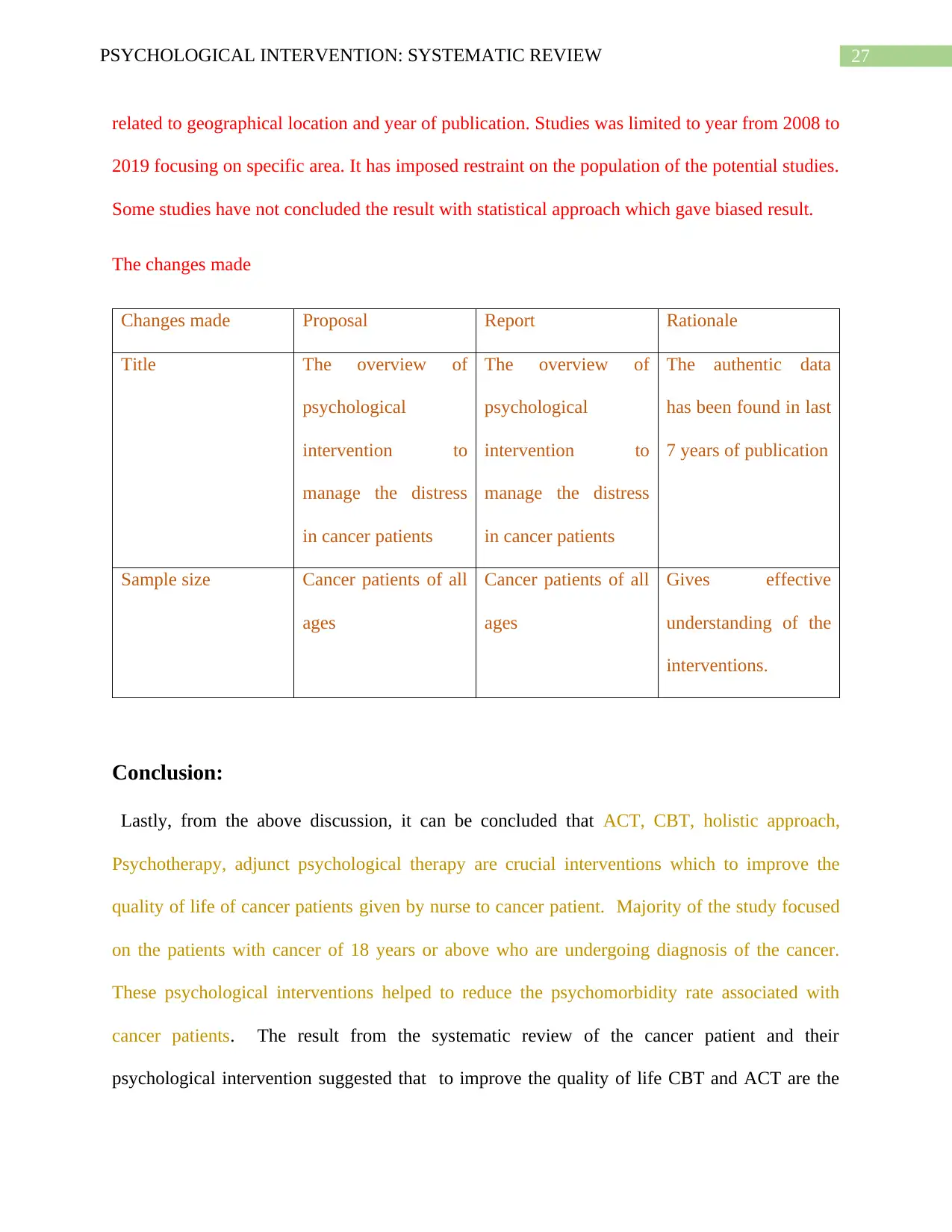
27PSYCHOLOGICAL INTERVENTION: SYSTEMATIC REVIEW
related to geographical location and year of publication. Studies was limited to year from 2008 to
2019 focusing on specific area. It has imposed restraint on the population of the potential studies.
Some studies have not concluded the result with statistical approach which gave biased result.
The changes made
Changes made Proposal Report Rationale
Title The overview of
psychological
intervention to
manage the distress
in cancer patients
The overview of
psychological
intervention to
manage the distress
in cancer patients
The authentic data
has been found in last
7 years of publication
Sample size Cancer patients of all
ages
Cancer patients of all
ages
Gives effective
understanding of the
interventions.
Conclusion:
Lastly, from the above discussion, it can be concluded that ACT, CBT, holistic approach,
Psychotherapy, adjunct psychological therapy are crucial interventions which to improve the
quality of life of cancer patients given by nurse to cancer patient. Majority of the study focused
on the patients with cancer of 18 years or above who are undergoing diagnosis of the cancer.
These psychological interventions helped to reduce the psychomorbidity rate associated with
cancer patients. The result from the systematic review of the cancer patient and their
psychological intervention suggested that to improve the quality of life CBT and ACT are the
related to geographical location and year of publication. Studies was limited to year from 2008 to
2019 focusing on specific area. It has imposed restraint on the population of the potential studies.
Some studies have not concluded the result with statistical approach which gave biased result.
The changes made
Changes made Proposal Report Rationale
Title The overview of
psychological
intervention to
manage the distress
in cancer patients
The overview of
psychological
intervention to
manage the distress
in cancer patients
The authentic data
has been found in last
7 years of publication
Sample size Cancer patients of all
ages
Cancer patients of all
ages
Gives effective
understanding of the
interventions.
Conclusion:
Lastly, from the above discussion, it can be concluded that ACT, CBT, holistic approach,
Psychotherapy, adjunct psychological therapy are crucial interventions which to improve the
quality of life of cancer patients given by nurse to cancer patient. Majority of the study focused
on the patients with cancer of 18 years or above who are undergoing diagnosis of the cancer.
These psychological interventions helped to reduce the psychomorbidity rate associated with
cancer patients. The result from the systematic review of the cancer patient and their
psychological intervention suggested that to improve the quality of life CBT and ACT are the
Secure Best Marks with AI Grader
Need help grading? Try our AI Grader for instant feedback on your assignments.
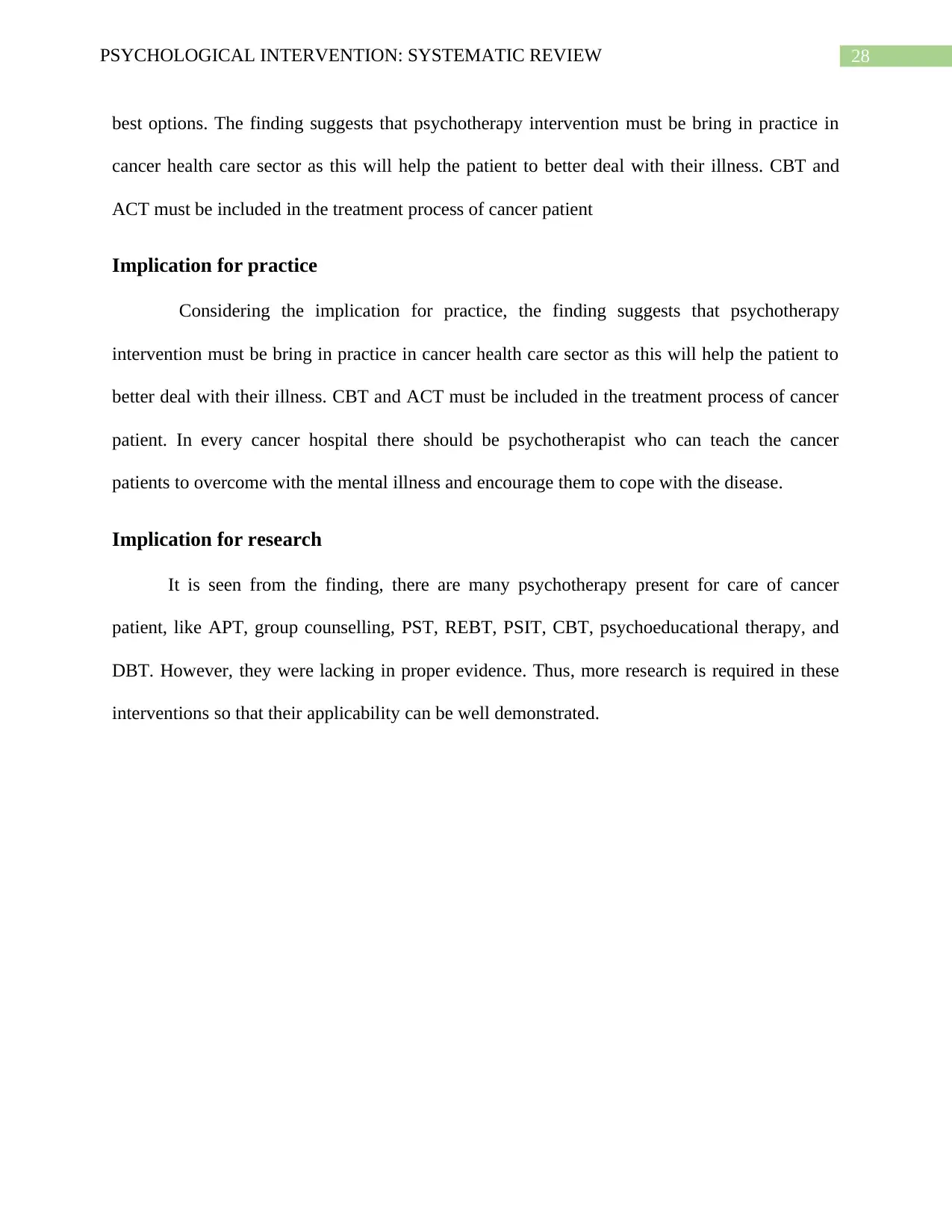
28PSYCHOLOGICAL INTERVENTION: SYSTEMATIC REVIEW
best options. The finding suggests that psychotherapy intervention must be bring in practice in
cancer health care sector as this will help the patient to better deal with their illness. CBT and
ACT must be included in the treatment process of cancer patient
Implication for practice
Considering the implication for practice, the finding suggests that psychotherapy
intervention must be bring in practice in cancer health care sector as this will help the patient to
better deal with their illness. CBT and ACT must be included in the treatment process of cancer
patient. In every cancer hospital there should be psychotherapist who can teach the cancer
patients to overcome with the mental illness and encourage them to cope with the disease.
Implication for research
It is seen from the finding, there are many psychotherapy present for care of cancer
patient, like APT, group counselling, PST, REBT, PSIT, CBT, psychoeducational therapy, and
DBT. However, they were lacking in proper evidence. Thus, more research is required in these
interventions so that their applicability can be well demonstrated.
best options. The finding suggests that psychotherapy intervention must be bring in practice in
cancer health care sector as this will help the patient to better deal with their illness. CBT and
ACT must be included in the treatment process of cancer patient
Implication for practice
Considering the implication for practice, the finding suggests that psychotherapy
intervention must be bring in practice in cancer health care sector as this will help the patient to
better deal with their illness. CBT and ACT must be included in the treatment process of cancer
patient. In every cancer hospital there should be psychotherapist who can teach the cancer
patients to overcome with the mental illness and encourage them to cope with the disease.
Implication for research
It is seen from the finding, there are many psychotherapy present for care of cancer
patient, like APT, group counselling, PST, REBT, PSIT, CBT, psychoeducational therapy, and
DBT. However, they were lacking in proper evidence. Thus, more research is required in these
interventions so that their applicability can be well demonstrated.
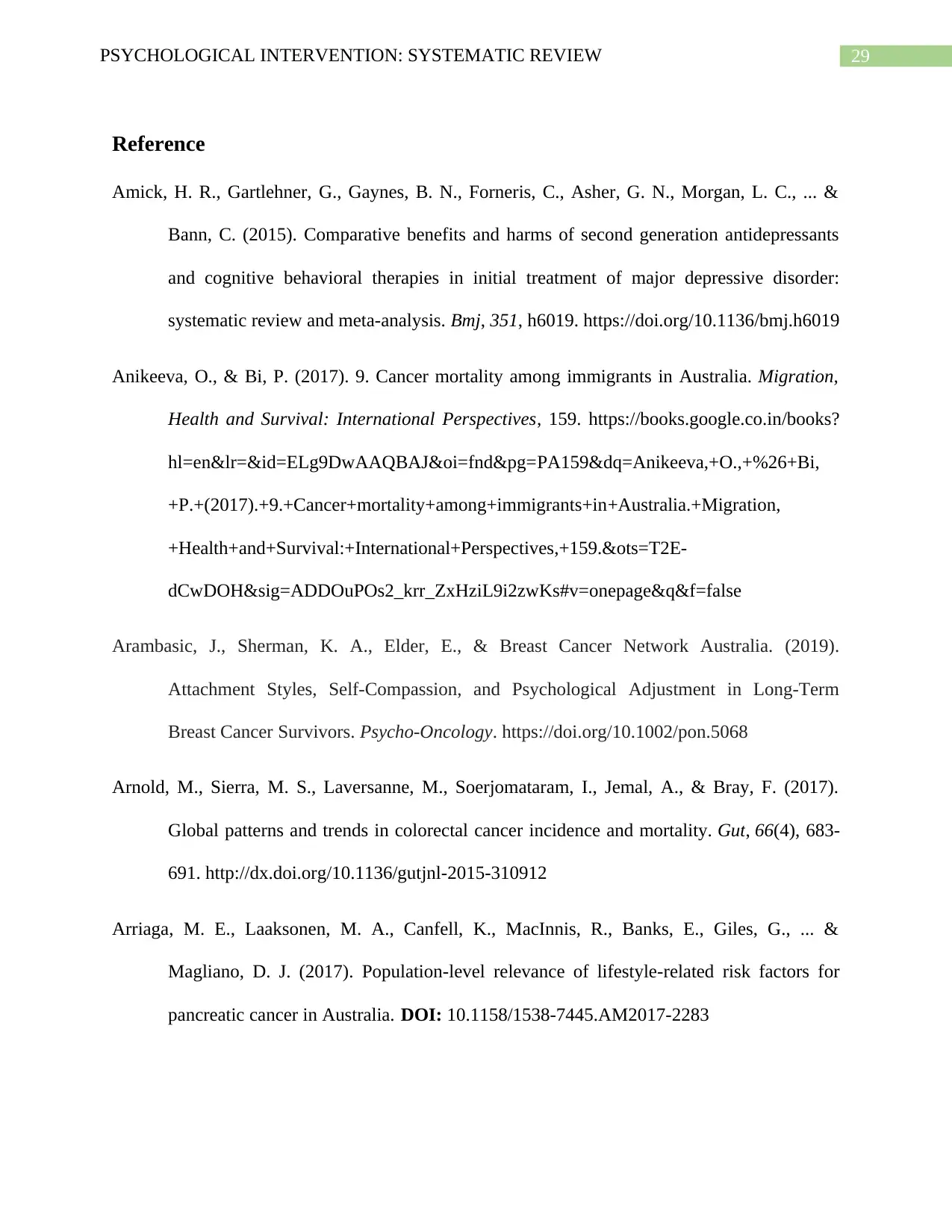
29PSYCHOLOGICAL INTERVENTION: SYSTEMATIC REVIEW
Reference
Amick, H. R., Gartlehner, G., Gaynes, B. N., Forneris, C., Asher, G. N., Morgan, L. C., ... &
Bann, C. (2015). Comparative benefits and harms of second generation antidepressants
and cognitive behavioral therapies in initial treatment of major depressive disorder:
systematic review and meta-analysis. Bmj, 351, h6019. https://doi.org/10.1136/bmj.h6019
Anikeeva, O., & Bi, P. (2017). 9. Cancer mortality among immigrants in Australia. Migration,
Health and Survival: International Perspectives, 159. https://books.google.co.in/books?
hl=en&lr=&id=ELg9DwAAQBAJ&oi=fnd&pg=PA159&dq=Anikeeva,+O.,+%26+Bi,
+P.+(2017).+9.+Cancer+mortality+among+immigrants+in+Australia.+Migration,
+Health+and+Survival:+International+Perspectives,+159.&ots=T2E-
dCwDOH&sig=ADDOuPOs2_krr_ZxHziL9i2zwKs#v=onepage&q&f=false
Arambasic, J., Sherman, K. A., Elder, E., & Breast Cancer Network Australia. (2019).
Attachment Styles, Self‐Compassion, and Psychological Adjustment in Long‐Term
Breast Cancer Survivors. Psycho‐Oncology. https://doi.org/10.1002/pon.5068
Arnold, M., Sierra, M. S., Laversanne, M., Soerjomataram, I., Jemal, A., & Bray, F. (2017).
Global patterns and trends in colorectal cancer incidence and mortality. Gut, 66(4), 683-
691. http://dx.doi.org/10.1136/gutjnl-2015-310912
Arriaga, M. E., Laaksonen, M. A., Canfell, K., MacInnis, R., Banks, E., Giles, G., ... &
Magliano, D. J. (2017). Population-level relevance of lifestyle-related risk factors for
pancreatic cancer in Australia. DOI: 10.1158/1538-7445.AM2017-2283
Reference
Amick, H. R., Gartlehner, G., Gaynes, B. N., Forneris, C., Asher, G. N., Morgan, L. C., ... &
Bann, C. (2015). Comparative benefits and harms of second generation antidepressants
and cognitive behavioral therapies in initial treatment of major depressive disorder:
systematic review and meta-analysis. Bmj, 351, h6019. https://doi.org/10.1136/bmj.h6019
Anikeeva, O., & Bi, P. (2017). 9. Cancer mortality among immigrants in Australia. Migration,
Health and Survival: International Perspectives, 159. https://books.google.co.in/books?
hl=en&lr=&id=ELg9DwAAQBAJ&oi=fnd&pg=PA159&dq=Anikeeva,+O.,+%26+Bi,
+P.+(2017).+9.+Cancer+mortality+among+immigrants+in+Australia.+Migration,
+Health+and+Survival:+International+Perspectives,+159.&ots=T2E-
dCwDOH&sig=ADDOuPOs2_krr_ZxHziL9i2zwKs#v=onepage&q&f=false
Arambasic, J., Sherman, K. A., Elder, E., & Breast Cancer Network Australia. (2019).
Attachment Styles, Self‐Compassion, and Psychological Adjustment in Long‐Term
Breast Cancer Survivors. Psycho‐Oncology. https://doi.org/10.1002/pon.5068
Arnold, M., Sierra, M. S., Laversanne, M., Soerjomataram, I., Jemal, A., & Bray, F. (2017).
Global patterns and trends in colorectal cancer incidence and mortality. Gut, 66(4), 683-
691. http://dx.doi.org/10.1136/gutjnl-2015-310912
Arriaga, M. E., Laaksonen, M. A., Canfell, K., MacInnis, R., Banks, E., Giles, G., ... &
Magliano, D. J. (2017). Population-level relevance of lifestyle-related risk factors for
pancreatic cancer in Australia. DOI: 10.1158/1538-7445.AM2017-2283
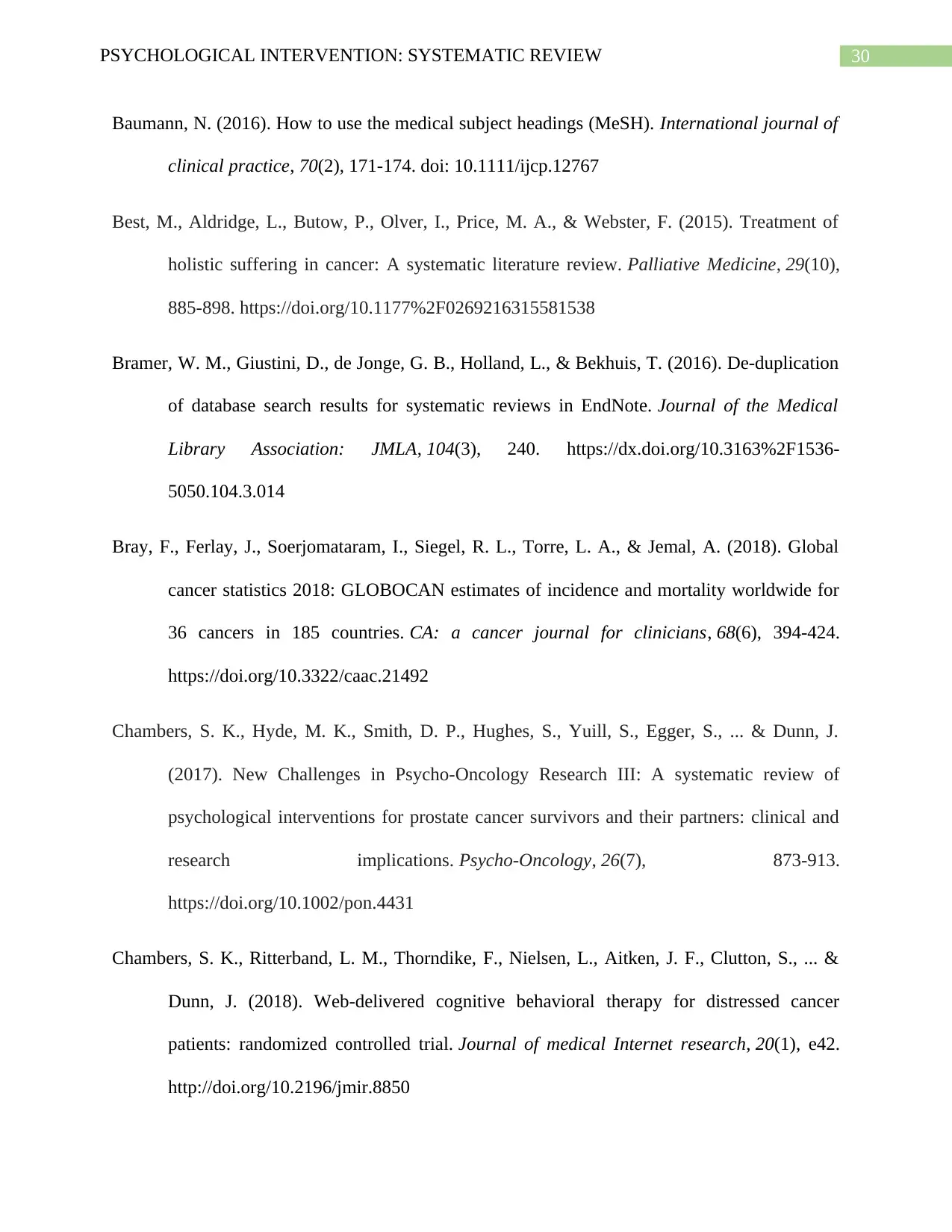
30PSYCHOLOGICAL INTERVENTION: SYSTEMATIC REVIEW
Baumann, N. (2016). How to use the medical subject headings (MeSH). International journal of
clinical practice, 70(2), 171-174. doi: 10.1111/ijcp.12767
Best, M., Aldridge, L., Butow, P., Olver, I., Price, M. A., & Webster, F. (2015). Treatment of
holistic suffering in cancer: A systematic literature review. Palliative Medicine, 29(10),
885-898. https://doi.org/10.1177%2F0269216315581538
Bramer, W. M., Giustini, D., de Jonge, G. B., Holland, L., & Bekhuis, T. (2016). De-duplication
of database search results for systematic reviews in EndNote. Journal of the Medical
Library Association: JMLA, 104(3), 240. https://dx.doi.org/10.3163%2F1536-
5050.104.3.014
Bray, F., Ferlay, J., Soerjomataram, I., Siegel, R. L., Torre, L. A., & Jemal, A. (2018). Global
cancer statistics 2018: GLOBOCAN estimates of incidence and mortality worldwide for
36 cancers in 185 countries. CA: a cancer journal for clinicians, 68(6), 394-424.
https://doi.org/10.3322/caac.21492
Chambers, S. K., Hyde, M. K., Smith, D. P., Hughes, S., Yuill, S., Egger, S., ... & Dunn, J.
(2017). New Challenges in Psycho‐Oncology Research III: A systematic review of
psychological interventions for prostate cancer survivors and their partners: clinical and
research implications. Psycho‐Oncology, 26(7), 873-913.
https://doi.org/10.1002/pon.4431
Chambers, S. K., Ritterband, L. M., Thorndike, F., Nielsen, L., Aitken, J. F., Clutton, S., ... &
Dunn, J. (2018). Web-delivered cognitive behavioral therapy for distressed cancer
patients: randomized controlled trial. Journal of medical Internet research, 20(1), e42.
http://doi.org/10.2196/jmir.8850
Baumann, N. (2016). How to use the medical subject headings (MeSH). International journal of
clinical practice, 70(2), 171-174. doi: 10.1111/ijcp.12767
Best, M., Aldridge, L., Butow, P., Olver, I., Price, M. A., & Webster, F. (2015). Treatment of
holistic suffering in cancer: A systematic literature review. Palliative Medicine, 29(10),
885-898. https://doi.org/10.1177%2F0269216315581538
Bramer, W. M., Giustini, D., de Jonge, G. B., Holland, L., & Bekhuis, T. (2016). De-duplication
of database search results for systematic reviews in EndNote. Journal of the Medical
Library Association: JMLA, 104(3), 240. https://dx.doi.org/10.3163%2F1536-
5050.104.3.014
Bray, F., Ferlay, J., Soerjomataram, I., Siegel, R. L., Torre, L. A., & Jemal, A. (2018). Global
cancer statistics 2018: GLOBOCAN estimates of incidence and mortality worldwide for
36 cancers in 185 countries. CA: a cancer journal for clinicians, 68(6), 394-424.
https://doi.org/10.3322/caac.21492
Chambers, S. K., Hyde, M. K., Smith, D. P., Hughes, S., Yuill, S., Egger, S., ... & Dunn, J.
(2017). New Challenges in Psycho‐Oncology Research III: A systematic review of
psychological interventions for prostate cancer survivors and their partners: clinical and
research implications. Psycho‐Oncology, 26(7), 873-913.
https://doi.org/10.1002/pon.4431
Chambers, S. K., Ritterband, L. M., Thorndike, F., Nielsen, L., Aitken, J. F., Clutton, S., ... &
Dunn, J. (2018). Web-delivered cognitive behavioral therapy for distressed cancer
patients: randomized controlled trial. Journal of medical Internet research, 20(1), e42.
http://doi.org/10.2196/jmir.8850
Paraphrase This Document
Need a fresh take? Get an instant paraphrase of this document with our AI Paraphraser
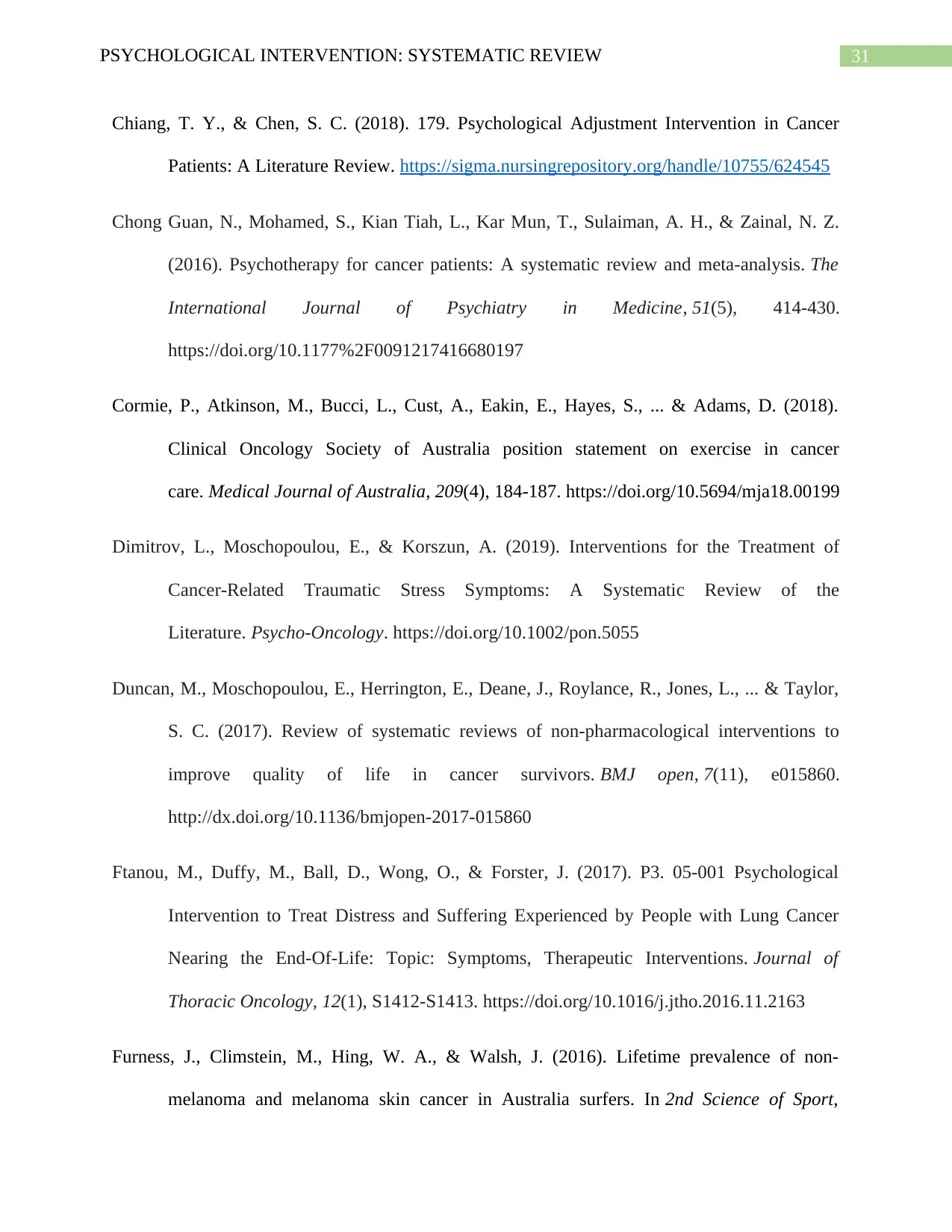
31PSYCHOLOGICAL INTERVENTION: SYSTEMATIC REVIEW
Chiang, T. Y., & Chen, S. C. (2018). 179. Psychological Adjustment Intervention in Cancer
Patients: A Literature Review. https://sigma.nursingrepository.org/handle/10755/624545
Chong Guan, N., Mohamed, S., Kian Tiah, L., Kar Mun, T., Sulaiman, A. H., & Zainal, N. Z.
(2016). Psychotherapy for cancer patients: A systematic review and meta-analysis. The
International Journal of Psychiatry in Medicine, 51(5), 414-430.
https://doi.org/10.1177%2F0091217416680197
Cormie, P., Atkinson, M., Bucci, L., Cust, A., Eakin, E., Hayes, S., ... & Adams, D. (2018).
Clinical Oncology Society of Australia position statement on exercise in cancer
care. Medical Journal of Australia, 209(4), 184-187. https://doi.org/10.5694/mja18.00199
Dimitrov, L., Moschopoulou, E., & Korszun, A. (2019). Interventions for the Treatment of
Cancer‐Related Traumatic Stress Symptoms: A Systematic Review of the
Literature. Psycho‐Oncology. https://doi.org/10.1002/pon.5055
Duncan, M., Moschopoulou, E., Herrington, E., Deane, J., Roylance, R., Jones, L., ... & Taylor,
S. C. (2017). Review of systematic reviews of non-pharmacological interventions to
improve quality of life in cancer survivors. BMJ open, 7(11), e015860.
http://dx.doi.org/10.1136/bmjopen-2017-015860
Ftanou, M., Duffy, M., Ball, D., Wong, O., & Forster, J. (2017). P3. 05-001 Psychological
Intervention to Treat Distress and Suffering Experienced by People with Lung Cancer
Nearing the End-Of-Life: Topic: Symptoms, Therapeutic Interventions. Journal of
Thoracic Oncology, 12(1), S1412-S1413. https://doi.org/10.1016/j.jtho.2016.11.2163
Furness, J., Climstein, M., Hing, W. A., & Walsh, J. (2016). Lifetime prevalence of non-
melanoma and melanoma skin cancer in Australia surfers. In 2nd Science of Sport,
Chiang, T. Y., & Chen, S. C. (2018). 179. Psychological Adjustment Intervention in Cancer
Patients: A Literature Review. https://sigma.nursingrepository.org/handle/10755/624545
Chong Guan, N., Mohamed, S., Kian Tiah, L., Kar Mun, T., Sulaiman, A. H., & Zainal, N. Z.
(2016). Psychotherapy for cancer patients: A systematic review and meta-analysis. The
International Journal of Psychiatry in Medicine, 51(5), 414-430.
https://doi.org/10.1177%2F0091217416680197
Cormie, P., Atkinson, M., Bucci, L., Cust, A., Eakin, E., Hayes, S., ... & Adams, D. (2018).
Clinical Oncology Society of Australia position statement on exercise in cancer
care. Medical Journal of Australia, 209(4), 184-187. https://doi.org/10.5694/mja18.00199
Dimitrov, L., Moschopoulou, E., & Korszun, A. (2019). Interventions for the Treatment of
Cancer‐Related Traumatic Stress Symptoms: A Systematic Review of the
Literature. Psycho‐Oncology. https://doi.org/10.1002/pon.5055
Duncan, M., Moschopoulou, E., Herrington, E., Deane, J., Roylance, R., Jones, L., ... & Taylor,
S. C. (2017). Review of systematic reviews of non-pharmacological interventions to
improve quality of life in cancer survivors. BMJ open, 7(11), e015860.
http://dx.doi.org/10.1136/bmjopen-2017-015860
Ftanou, M., Duffy, M., Ball, D., Wong, O., & Forster, J. (2017). P3. 05-001 Psychological
Intervention to Treat Distress and Suffering Experienced by People with Lung Cancer
Nearing the End-Of-Life: Topic: Symptoms, Therapeutic Interventions. Journal of
Thoracic Oncology, 12(1), S1412-S1413. https://doi.org/10.1016/j.jtho.2016.11.2163
Furness, J., Climstein, M., Hing, W. A., & Walsh, J. (2016). Lifetime prevalence of non-
melanoma and melanoma skin cancer in Australia surfers. In 2nd Science of Sport,
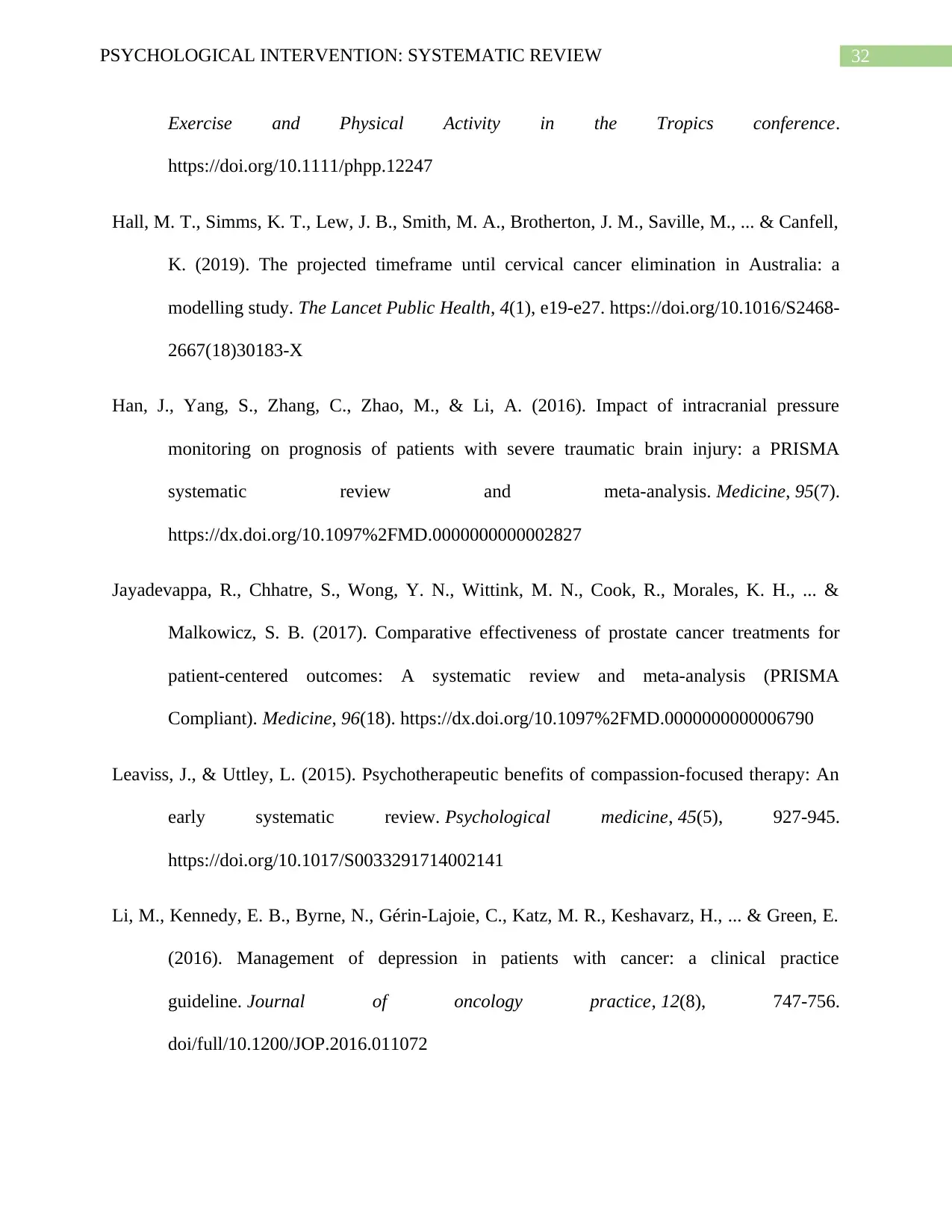
32PSYCHOLOGICAL INTERVENTION: SYSTEMATIC REVIEW
Exercise and Physical Activity in the Tropics conference.
https://doi.org/10.1111/phpp.12247
Hall, M. T., Simms, K. T., Lew, J. B., Smith, M. A., Brotherton, J. M., Saville, M., ... & Canfell,
K. (2019). The projected timeframe until cervical cancer elimination in Australia: a
modelling study. The Lancet Public Health, 4(1), e19-e27. https://doi.org/10.1016/S2468-
2667(18)30183-X
Han, J., Yang, S., Zhang, C., Zhao, M., & Li, A. (2016). Impact of intracranial pressure
monitoring on prognosis of patients with severe traumatic brain injury: a PRISMA
systematic review and meta-analysis. Medicine, 95(7).
https://dx.doi.org/10.1097%2FMD.0000000000002827
Jayadevappa, R., Chhatre, S., Wong, Y. N., Wittink, M. N., Cook, R., Morales, K. H., ... &
Malkowicz, S. B. (2017). Comparative effectiveness of prostate cancer treatments for
patient-centered outcomes: A systematic review and meta-analysis (PRISMA
Compliant). Medicine, 96(18). https://dx.doi.org/10.1097%2FMD.0000000000006790
Leaviss, J., & Uttley, L. (2015). Psychotherapeutic benefits of compassion-focused therapy: An
early systematic review. Psychological medicine, 45(5), 927-945.
https://doi.org/10.1017/S0033291714002141
Li, M., Kennedy, E. B., Byrne, N., Gérin-Lajoie, C., Katz, M. R., Keshavarz, H., ... & Green, E.
(2016). Management of depression in patients with cancer: a clinical practice
guideline. Journal of oncology practice, 12(8), 747-756.
doi/full/10.1200/JOP.2016.011072
Exercise and Physical Activity in the Tropics conference.
https://doi.org/10.1111/phpp.12247
Hall, M. T., Simms, K. T., Lew, J. B., Smith, M. A., Brotherton, J. M., Saville, M., ... & Canfell,
K. (2019). The projected timeframe until cervical cancer elimination in Australia: a
modelling study. The Lancet Public Health, 4(1), e19-e27. https://doi.org/10.1016/S2468-
2667(18)30183-X
Han, J., Yang, S., Zhang, C., Zhao, M., & Li, A. (2016). Impact of intracranial pressure
monitoring on prognosis of patients with severe traumatic brain injury: a PRISMA
systematic review and meta-analysis. Medicine, 95(7).
https://dx.doi.org/10.1097%2FMD.0000000000002827
Jayadevappa, R., Chhatre, S., Wong, Y. N., Wittink, M. N., Cook, R., Morales, K. H., ... &
Malkowicz, S. B. (2017). Comparative effectiveness of prostate cancer treatments for
patient-centered outcomes: A systematic review and meta-analysis (PRISMA
Compliant). Medicine, 96(18). https://dx.doi.org/10.1097%2FMD.0000000000006790
Leaviss, J., & Uttley, L. (2015). Psychotherapeutic benefits of compassion-focused therapy: An
early systematic review. Psychological medicine, 45(5), 927-945.
https://doi.org/10.1017/S0033291714002141
Li, M., Kennedy, E. B., Byrne, N., Gérin-Lajoie, C., Katz, M. R., Keshavarz, H., ... & Green, E.
(2016). Management of depression in patients with cancer: a clinical practice
guideline. Journal of oncology practice, 12(8), 747-756.
doi/full/10.1200/JOP.2016.011072
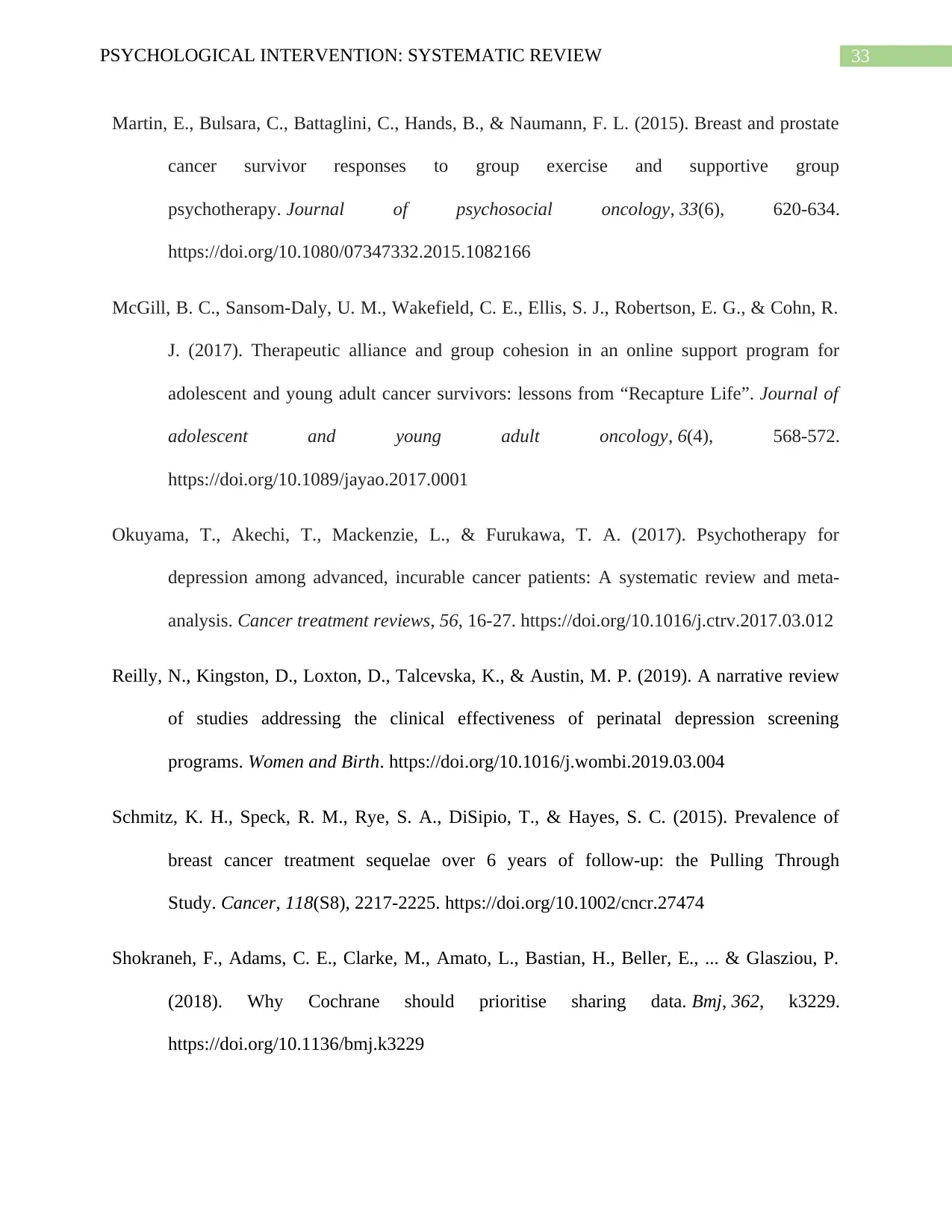
33PSYCHOLOGICAL INTERVENTION: SYSTEMATIC REVIEW
Martin, E., Bulsara, C., Battaglini, C., Hands, B., & Naumann, F. L. (2015). Breast and prostate
cancer survivor responses to group exercise and supportive group
psychotherapy. Journal of psychosocial oncology, 33(6), 620-634.
https://doi.org/10.1080/07347332.2015.1082166
McGill, B. C., Sansom-Daly, U. M., Wakefield, C. E., Ellis, S. J., Robertson, E. G., & Cohn, R.
J. (2017). Therapeutic alliance and group cohesion in an online support program for
adolescent and young adult cancer survivors: lessons from “Recapture Life”. Journal of
adolescent and young adult oncology, 6(4), 568-572.
https://doi.org/10.1089/jayao.2017.0001
Okuyama, T., Akechi, T., Mackenzie, L., & Furukawa, T. A. (2017). Psychotherapy for
depression among advanced, incurable cancer patients: A systematic review and meta-
analysis. Cancer treatment reviews, 56, 16-27. https://doi.org/10.1016/j.ctrv.2017.03.012
Reilly, N., Kingston, D., Loxton, D., Talcevska, K., & Austin, M. P. (2019). A narrative review
of studies addressing the clinical effectiveness of perinatal depression screening
programs. Women and Birth. https://doi.org/10.1016/j.wombi.2019.03.004
Schmitz, K. H., Speck, R. M., Rye, S. A., DiSipio, T., & Hayes, S. C. (2015). Prevalence of
breast cancer treatment sequelae over 6 years of follow‐up: the Pulling Through
Study. Cancer, 118(S8), 2217-2225. https://doi.org/10.1002/cncr.27474
Shokraneh, F., Adams, C. E., Clarke, M., Amato, L., Bastian, H., Beller, E., ... & Glasziou, P.
(2018). Why Cochrane should prioritise sharing data. Bmj, 362, k3229.
https://doi.org/10.1136/bmj.k3229
Martin, E., Bulsara, C., Battaglini, C., Hands, B., & Naumann, F. L. (2015). Breast and prostate
cancer survivor responses to group exercise and supportive group
psychotherapy. Journal of psychosocial oncology, 33(6), 620-634.
https://doi.org/10.1080/07347332.2015.1082166
McGill, B. C., Sansom-Daly, U. M., Wakefield, C. E., Ellis, S. J., Robertson, E. G., & Cohn, R.
J. (2017). Therapeutic alliance and group cohesion in an online support program for
adolescent and young adult cancer survivors: lessons from “Recapture Life”. Journal of
adolescent and young adult oncology, 6(4), 568-572.
https://doi.org/10.1089/jayao.2017.0001
Okuyama, T., Akechi, T., Mackenzie, L., & Furukawa, T. A. (2017). Psychotherapy for
depression among advanced, incurable cancer patients: A systematic review and meta-
analysis. Cancer treatment reviews, 56, 16-27. https://doi.org/10.1016/j.ctrv.2017.03.012
Reilly, N., Kingston, D., Loxton, D., Talcevska, K., & Austin, M. P. (2019). A narrative review
of studies addressing the clinical effectiveness of perinatal depression screening
programs. Women and Birth. https://doi.org/10.1016/j.wombi.2019.03.004
Schmitz, K. H., Speck, R. M., Rye, S. A., DiSipio, T., & Hayes, S. C. (2015). Prevalence of
breast cancer treatment sequelae over 6 years of follow‐up: the Pulling Through
Study. Cancer, 118(S8), 2217-2225. https://doi.org/10.1002/cncr.27474
Shokraneh, F., Adams, C. E., Clarke, M., Amato, L., Bastian, H., Beller, E., ... & Glasziou, P.
(2018). Why Cochrane should prioritise sharing data. Bmj, 362, k3229.
https://doi.org/10.1136/bmj.k3229
Secure Best Marks with AI Grader
Need help grading? Try our AI Grader for instant feedback on your assignments.
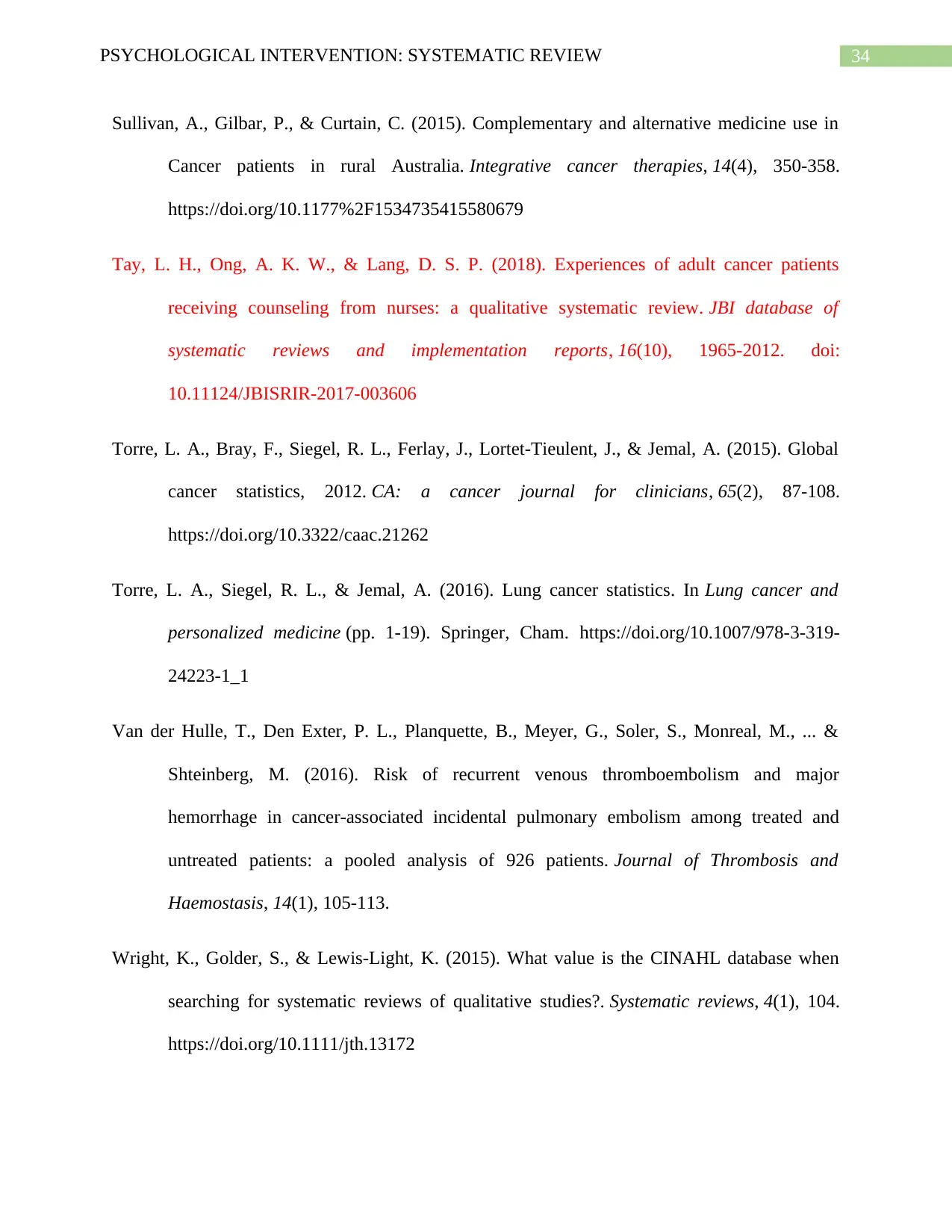
34PSYCHOLOGICAL INTERVENTION: SYSTEMATIC REVIEW
Sullivan, A., Gilbar, P., & Curtain, C. (2015). Complementary and alternative medicine use in
Cancer patients in rural Australia. Integrative cancer therapies, 14(4), 350-358.
https://doi.org/10.1177%2F1534735415580679
Tay, L. H., Ong, A. K. W., & Lang, D. S. P. (2018). Experiences of adult cancer patients
receiving counseling from nurses: a qualitative systematic review. JBI database of
systematic reviews and implementation reports, 16(10), 1965-2012. doi:
10.11124/JBISRIR-2017-003606
Torre, L. A., Bray, F., Siegel, R. L., Ferlay, J., Lortet‐Tieulent, J., & Jemal, A. (2015). Global
cancer statistics, 2012. CA: a cancer journal for clinicians, 65(2), 87-108.
https://doi.org/10.3322/caac.21262
Torre, L. A., Siegel, R. L., & Jemal, A. (2016). Lung cancer statistics. In Lung cancer and
personalized medicine (pp. 1-19). Springer, Cham. https://doi.org/10.1007/978-3-319-
24223-1_1
Van der Hulle, T., Den Exter, P. L., Planquette, B., Meyer, G., Soler, S., Monreal, M., ... &
Shteinberg, M. (2016). Risk of recurrent venous thromboembolism and major
hemorrhage in cancer‐associated incidental pulmonary embolism among treated and
untreated patients: a pooled analysis of 926 patients. Journal of Thrombosis and
Haemostasis, 14(1), 105-113.
Wright, K., Golder, S., & Lewis-Light, K. (2015). What value is the CINAHL database when
searching for systematic reviews of qualitative studies?. Systematic reviews, 4(1), 104.
https://doi.org/10.1111/jth.13172
Sullivan, A., Gilbar, P., & Curtain, C. (2015). Complementary and alternative medicine use in
Cancer patients in rural Australia. Integrative cancer therapies, 14(4), 350-358.
https://doi.org/10.1177%2F1534735415580679
Tay, L. H., Ong, A. K. W., & Lang, D. S. P. (2018). Experiences of adult cancer patients
receiving counseling from nurses: a qualitative systematic review. JBI database of
systematic reviews and implementation reports, 16(10), 1965-2012. doi:
10.11124/JBISRIR-2017-003606
Torre, L. A., Bray, F., Siegel, R. L., Ferlay, J., Lortet‐Tieulent, J., & Jemal, A. (2015). Global
cancer statistics, 2012. CA: a cancer journal for clinicians, 65(2), 87-108.
https://doi.org/10.3322/caac.21262
Torre, L. A., Siegel, R. L., & Jemal, A. (2016). Lung cancer statistics. In Lung cancer and
personalized medicine (pp. 1-19). Springer, Cham. https://doi.org/10.1007/978-3-319-
24223-1_1
Van der Hulle, T., Den Exter, P. L., Planquette, B., Meyer, G., Soler, S., Monreal, M., ... &
Shteinberg, M. (2016). Risk of recurrent venous thromboembolism and major
hemorrhage in cancer‐associated incidental pulmonary embolism among treated and
untreated patients: a pooled analysis of 926 patients. Journal of Thrombosis and
Haemostasis, 14(1), 105-113.
Wright, K., Golder, S., & Lewis-Light, K. (2015). What value is the CINAHL database when
searching for systematic reviews of qualitative studies?. Systematic reviews, 4(1), 104.
https://doi.org/10.1111/jth.13172
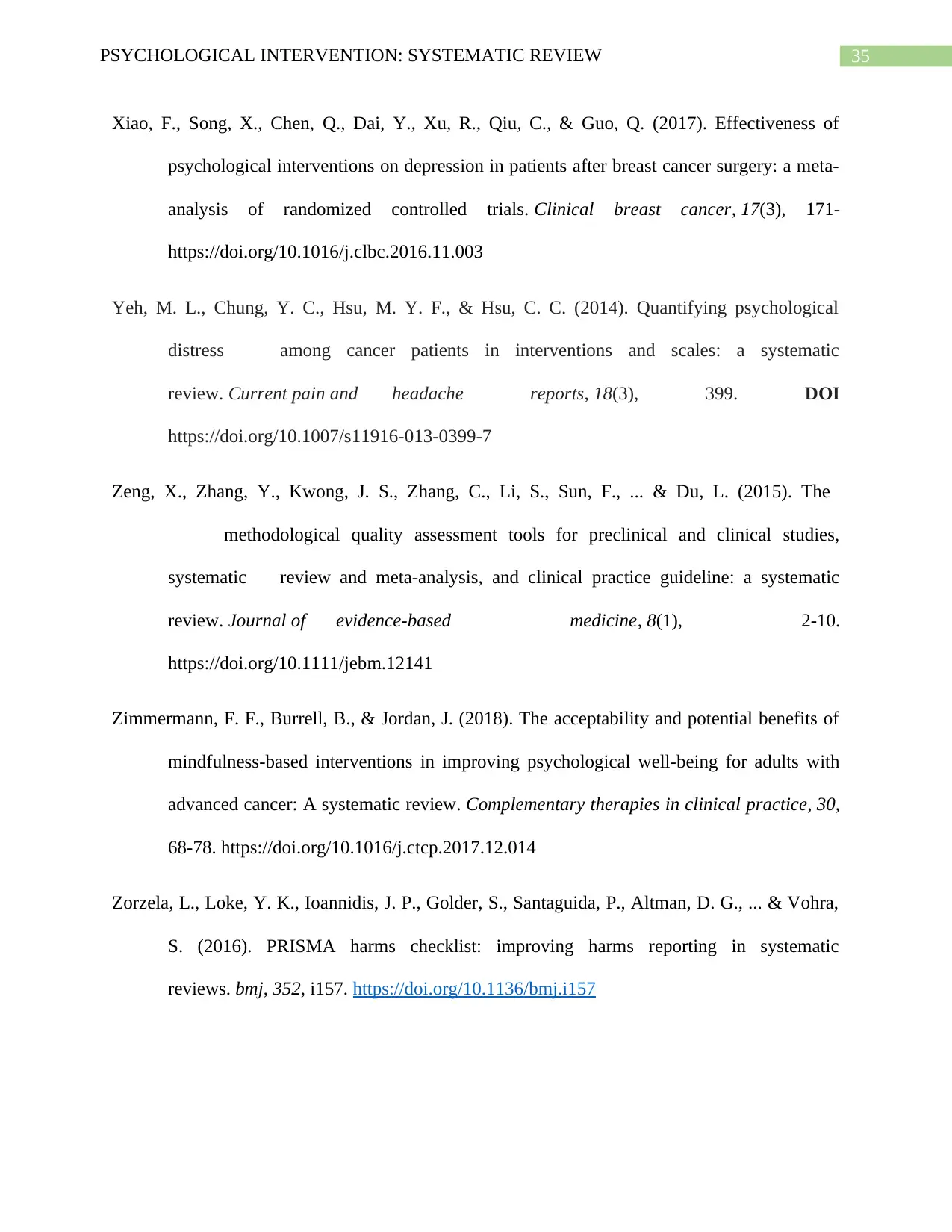
35PSYCHOLOGICAL INTERVENTION: SYSTEMATIC REVIEW
Xiao, F., Song, X., Chen, Q., Dai, Y., Xu, R., Qiu, C., & Guo, Q. (2017). Effectiveness of
psychological interventions on depression in patients after breast cancer surgery: a meta-
analysis of randomized controlled trials. Clinical breast cancer, 17(3), 171-
https://doi.org/10.1016/j.clbc.2016.11.003
Yeh, M. L., Chung, Y. C., Hsu, M. Y. F., & Hsu, C. C. (2014). Quantifying psychological
distress among cancer patients in interventions and scales: a systematic
review. Current pain and headache reports, 18(3), 399. DOI
https://doi.org/10.1007/s11916-013-0399-7
Zeng, X., Zhang, Y., Kwong, J. S., Zhang, C., Li, S., Sun, F., ... & Du, L. (2015). The
methodological quality assessment tools for preclinical and clinical studies,
systematic review and meta‐analysis, and clinical practice guideline: a systematic
review. Journal of evidence-based medicine, 8(1), 2-10.
https://doi.org/10.1111/jebm.12141
Zimmermann, F. F., Burrell, B., & Jordan, J. (2018). The acceptability and potential benefits of
mindfulness-based interventions in improving psychological well-being for adults with
advanced cancer: A systematic review. Complementary therapies in clinical practice, 30,
68-78. https://doi.org/10.1016/j.ctcp.2017.12.014
Zorzela, L., Loke, Y. K., Ioannidis, J. P., Golder, S., Santaguida, P., Altman, D. G., ... & Vohra,
S. (2016). PRISMA harms checklist: improving harms reporting in systematic
reviews. bmj, 352, i157. https://doi.org/10.1136/bmj.i157
Xiao, F., Song, X., Chen, Q., Dai, Y., Xu, R., Qiu, C., & Guo, Q. (2017). Effectiveness of
psychological interventions on depression in patients after breast cancer surgery: a meta-
analysis of randomized controlled trials. Clinical breast cancer, 17(3), 171-
https://doi.org/10.1016/j.clbc.2016.11.003
Yeh, M. L., Chung, Y. C., Hsu, M. Y. F., & Hsu, C. C. (2014). Quantifying psychological
distress among cancer patients in interventions and scales: a systematic
review. Current pain and headache reports, 18(3), 399. DOI
https://doi.org/10.1007/s11916-013-0399-7
Zeng, X., Zhang, Y., Kwong, J. S., Zhang, C., Li, S., Sun, F., ... & Du, L. (2015). The
methodological quality assessment tools for preclinical and clinical studies,
systematic review and meta‐analysis, and clinical practice guideline: a systematic
review. Journal of evidence-based medicine, 8(1), 2-10.
https://doi.org/10.1111/jebm.12141
Zimmermann, F. F., Burrell, B., & Jordan, J. (2018). The acceptability and potential benefits of
mindfulness-based interventions in improving psychological well-being for adults with
advanced cancer: A systematic review. Complementary therapies in clinical practice, 30,
68-78. https://doi.org/10.1016/j.ctcp.2017.12.014
Zorzela, L., Loke, Y. K., Ioannidis, J. P., Golder, S., Santaguida, P., Altman, D. G., ... & Vohra,
S. (2016). PRISMA harms checklist: improving harms reporting in systematic
reviews. bmj, 352, i157. https://doi.org/10.1136/bmj.i157
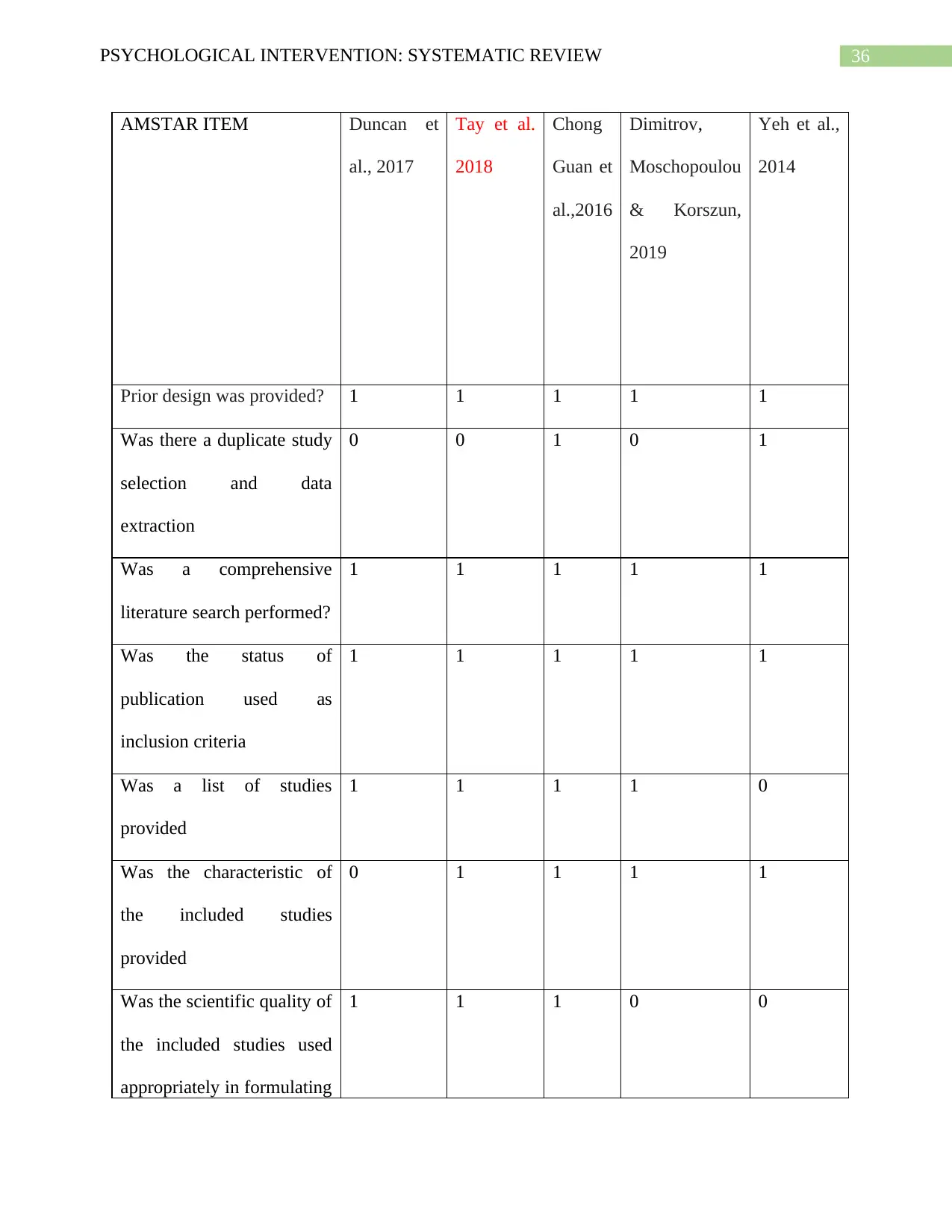
36PSYCHOLOGICAL INTERVENTION: SYSTEMATIC REVIEW
AMSTAR ITEM Duncan et
al., 2017
Tay et al.
2018
Chong
Guan et
al.,2016
Dimitrov,
Moschopoulou
& Korszun,
2019
Yeh et al.,
2014
Prior design was provided? 1 1 1 1 1
Was there a duplicate study
selection and data
extraction
0 0 1 0 1
Was a comprehensive
literature search performed?
1 1 1 1 1
Was the status of
publication used as
inclusion criteria
1 1 1 1 1
Was a list of studies
provided
1 1 1 1 0
Was the characteristic of
the included studies
provided
0 1 1 1 1
Was the scientific quality of
the included studies used
appropriately in formulating
1 1 1 0 0
AMSTAR ITEM Duncan et
al., 2017
Tay et al.
2018
Chong
Guan et
al.,2016
Dimitrov,
Moschopoulou
& Korszun,
2019
Yeh et al.,
2014
Prior design was provided? 1 1 1 1 1
Was there a duplicate study
selection and data
extraction
0 0 1 0 1
Was a comprehensive
literature search performed?
1 1 1 1 1
Was the status of
publication used as
inclusion criteria
1 1 1 1 1
Was a list of studies
provided
1 1 1 1 0
Was the characteristic of
the included studies
provided
0 1 1 1 1
Was the scientific quality of
the included studies used
appropriately in formulating
1 1 1 0 0
Paraphrase This Document
Need a fresh take? Get an instant paraphrase of this document with our AI Paraphraser
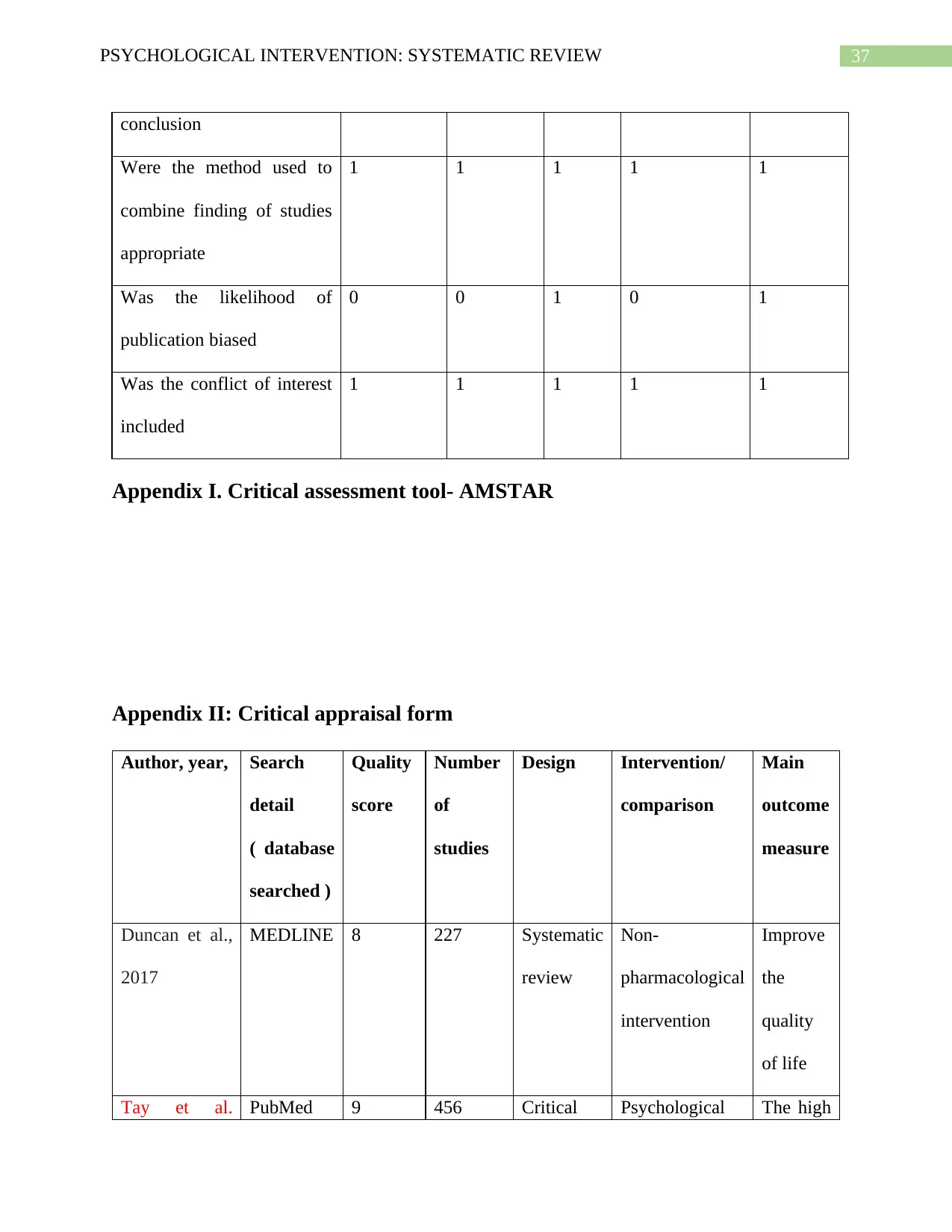
37PSYCHOLOGICAL INTERVENTION: SYSTEMATIC REVIEW
conclusion
Were the method used to
combine finding of studies
appropriate
1 1 1 1 1
Was the likelihood of
publication biased
0 0 1 0 1
Was the conflict of interest
included
1 1 1 1 1
Appendix I. Critical assessment tool- AMSTAR
Appendix II: Critical appraisal form
Author, year, Search
detail
( database
searched )
Quality
score
Number
of
studies
Design Intervention/
comparison
Main
outcome
measure
Duncan et al.,
2017
MEDLINE 8 227 Systematic
review
Non-
pharmacological
intervention
Improve
the
quality
of life
Tay et al. PubMed 9 456 Critical Psychological The high
conclusion
Were the method used to
combine finding of studies
appropriate
1 1 1 1 1
Was the likelihood of
publication biased
0 0 1 0 1
Was the conflict of interest
included
1 1 1 1 1
Appendix I. Critical assessment tool- AMSTAR
Appendix II: Critical appraisal form
Author, year, Search
detail
( database
searched )
Quality
score
Number
of
studies
Design Intervention/
comparison
Main
outcome
measure
Duncan et al.,
2017
MEDLINE 8 227 Systematic
review
Non-
pharmacological
intervention
Improve
the
quality
of life
Tay et al. PubMed 9 456 Critical Psychological The high
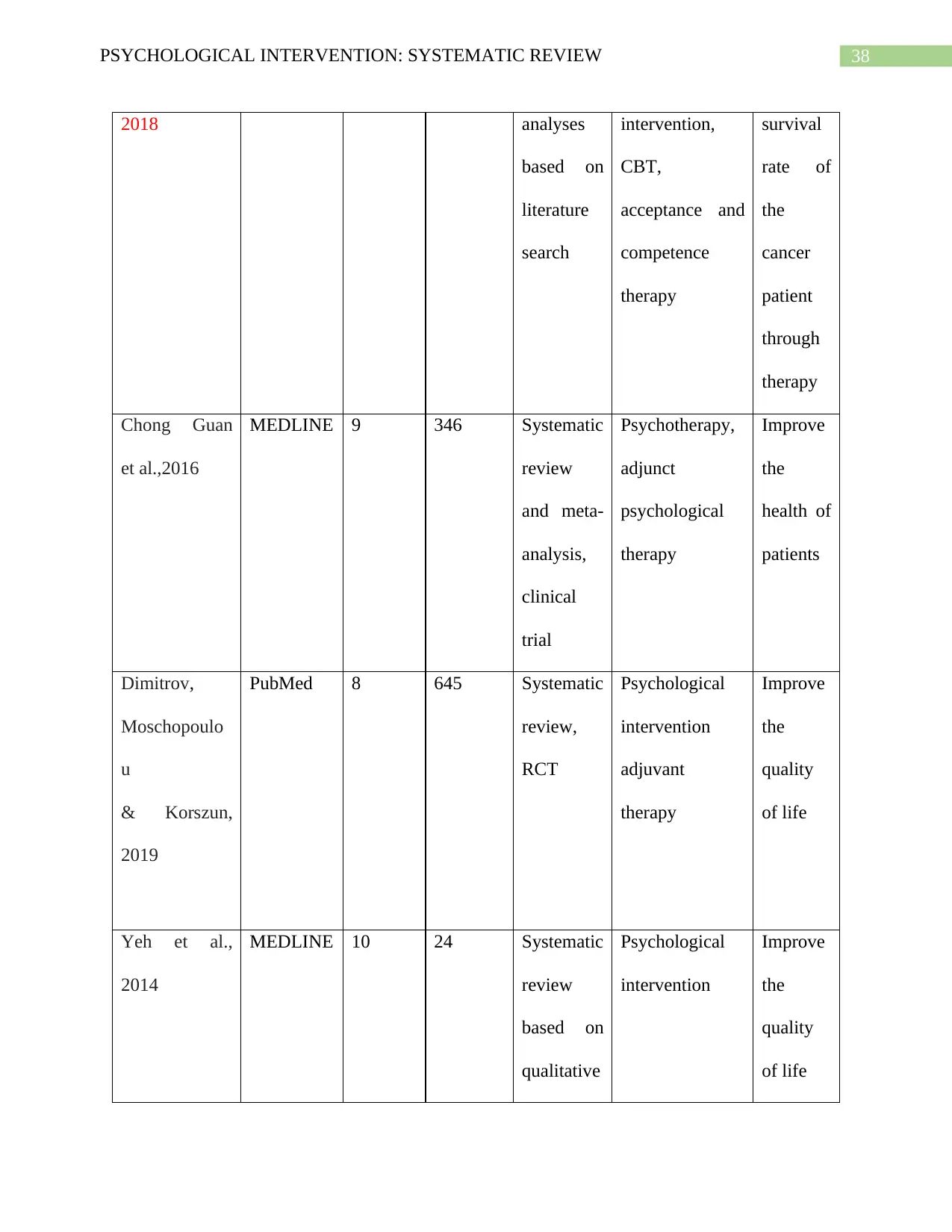
38PSYCHOLOGICAL INTERVENTION: SYSTEMATIC REVIEW
2018 analyses
based on
literature
search
intervention,
CBT,
acceptance and
competence
therapy
survival
rate of
the
cancer
patient
through
therapy
Chong Guan
et al.,2016
MEDLINE 9 346 Systematic
review
and meta-
analysis,
clinical
trial
Psychotherapy,
adjunct
psychological
therapy
Improve
the
health of
patients
Dimitrov,
Moschopoulo
u
& Korszun,
2019
PubMed 8 645 Systematic
review,
RCT
Psychological
intervention
adjuvant
therapy
Improve
the
quality
of life
Yeh et al.,
2014
MEDLINE 10 24 Systematic
review
based on
qualitative
Psychological
intervention
Improve
the
quality
of life
2018 analyses
based on
literature
search
intervention,
CBT,
acceptance and
competence
therapy
survival
rate of
the
cancer
patient
through
therapy
Chong Guan
et al.,2016
MEDLINE 9 346 Systematic
review
and meta-
analysis,
clinical
trial
Psychotherapy,
adjunct
psychological
therapy
Improve
the
health of
patients
Dimitrov,
Moschopoulo
u
& Korszun,
2019
PubMed 8 645 Systematic
review,
RCT
Psychological
intervention
adjuvant
therapy
Improve
the
quality
of life
Yeh et al.,
2014
MEDLINE 10 24 Systematic
review
based on
qualitative
Psychological
intervention
Improve
the
quality
of life

39PSYCHOLOGICAL INTERVENTION: SYSTEMATIC REVIEW
data. RCT
data. RCT
Secure Best Marks with AI Grader
Need help grading? Try our AI Grader for instant feedback on your assignments.
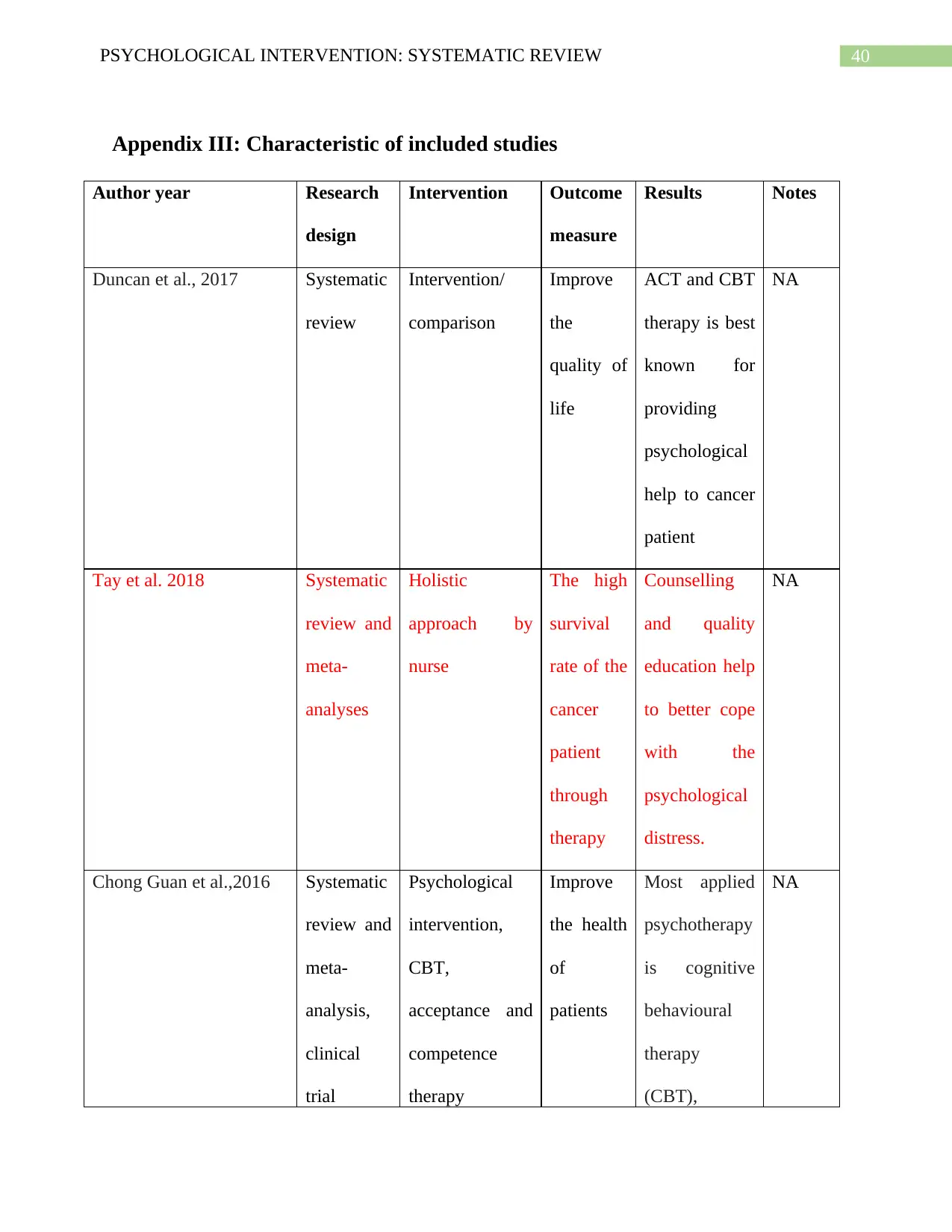
40PSYCHOLOGICAL INTERVENTION: SYSTEMATIC REVIEW
Appendix III: Characteristic of included studies
Author year Research
design
Intervention Outcome
measure
Results Notes
Duncan et al., 2017 Systematic
review
Intervention/
comparison
Improve
the
quality of
life
ACT and CBT
therapy is best
known for
providing
psychological
help to cancer
patient
NA
Tay et al. 2018 Systematic
review and
meta-
analyses
Holistic
approach by
nurse
The high
survival
rate of the
cancer
patient
through
therapy
Counselling
and quality
education help
to better cope
with the
psychological
distress.
NA
Chong Guan et al.,2016 Systematic
review and
meta-
analysis,
clinical
trial
Psychological
intervention,
CBT,
acceptance and
competence
therapy
Improve
the health
of
patients
Most applied
psychotherapy
is cognitive
behavioural
therapy
(CBT),
NA
Appendix III: Characteristic of included studies
Author year Research
design
Intervention Outcome
measure
Results Notes
Duncan et al., 2017 Systematic
review
Intervention/
comparison
Improve
the
quality of
life
ACT and CBT
therapy is best
known for
providing
psychological
help to cancer
patient
NA
Tay et al. 2018 Systematic
review and
meta-
analyses
Holistic
approach by
nurse
The high
survival
rate of the
cancer
patient
through
therapy
Counselling
and quality
education help
to better cope
with the
psychological
distress.
NA
Chong Guan et al.,2016 Systematic
review and
meta-
analysis,
clinical
trial
Psychological
intervention,
CBT,
acceptance and
competence
therapy
Improve
the health
of
patients
Most applied
psychotherapy
is cognitive
behavioural
therapy
(CBT),
NA
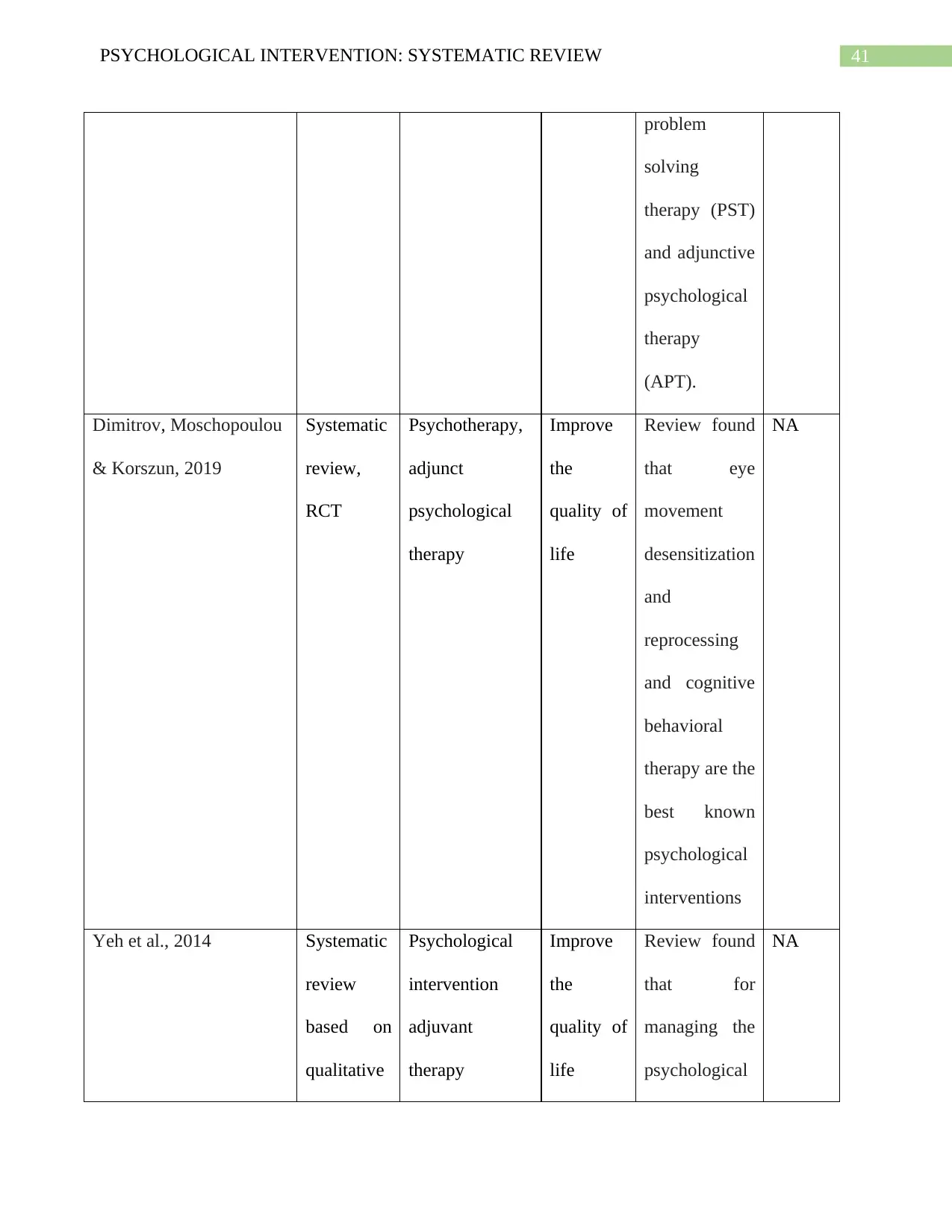
41PSYCHOLOGICAL INTERVENTION: SYSTEMATIC REVIEW
problem
solving
therapy (PST)
and adjunctive
psychological
therapy
(APT).
Dimitrov, Moschopoulou
& Korszun, 2019
Systematic
review,
RCT
Psychotherapy,
adjunct
psychological
therapy
Improve
the
quality of
life
Review found
that eye
movement
desensitization
and
reprocessing
and cognitive
behavioral
therapy are the
best known
psychological
interventions
NA
Yeh et al., 2014 Systematic
review
based on
qualitative
Psychological
intervention
adjuvant
therapy
Improve
the
quality of
life
Review found
that for
managing the
psychological
NA
problem
solving
therapy (PST)
and adjunctive
psychological
therapy
(APT).
Dimitrov, Moschopoulou
& Korszun, 2019
Systematic
review,
RCT
Psychotherapy,
adjunct
psychological
therapy
Improve
the
quality of
life
Review found
that eye
movement
desensitization
and
reprocessing
and cognitive
behavioral
therapy are the
best known
psychological
interventions
NA
Yeh et al., 2014 Systematic
review
based on
qualitative
Psychological
intervention
adjuvant
therapy
Improve
the
quality of
life
Review found
that for
managing the
psychological
NA
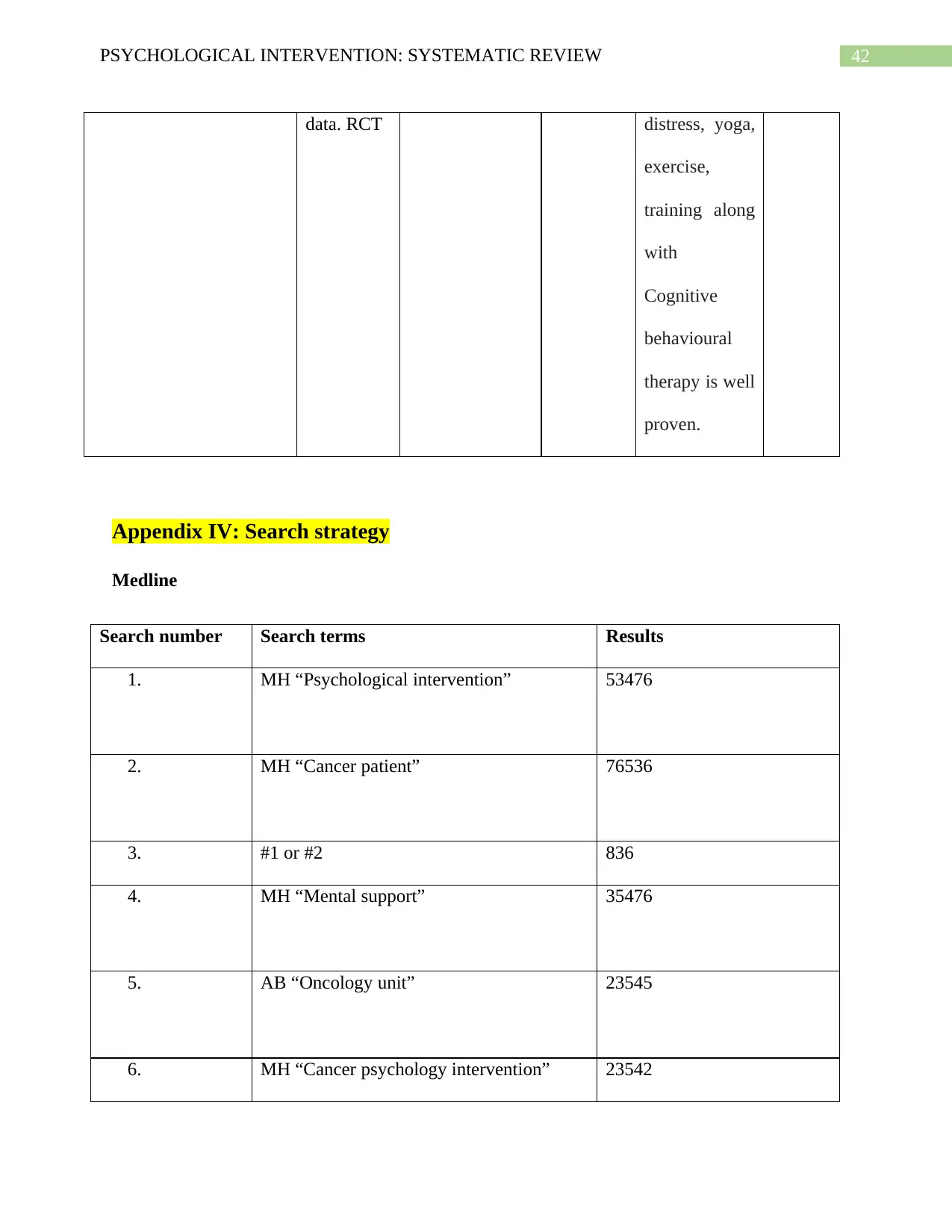
42PSYCHOLOGICAL INTERVENTION: SYSTEMATIC REVIEW
data. RCT distress, yoga,
exercise,
training along
with
Cognitive
behavioural
therapy is well
proven.
Appendix IV: Search strategy
Medline
Search number Search terms Results
1. MH “Psychological intervention” 53476
2. MH “Cancer patient” 76536
3. #1 or #2 836
4. MH “Mental support” 35476
5. AB “Oncology unit” 23545
6. MH “Cancer psychology intervention” 23542
data. RCT distress, yoga,
exercise,
training along
with
Cognitive
behavioural
therapy is well
proven.
Appendix IV: Search strategy
Medline
Search number Search terms Results
1. MH “Psychological intervention” 53476
2. MH “Cancer patient” 76536
3. #1 or #2 836
4. MH “Mental support” 35476
5. AB “Oncology unit” 23545
6. MH “Cancer psychology intervention” 23542
Paraphrase This Document
Need a fresh take? Get an instant paraphrase of this document with our AI Paraphraser
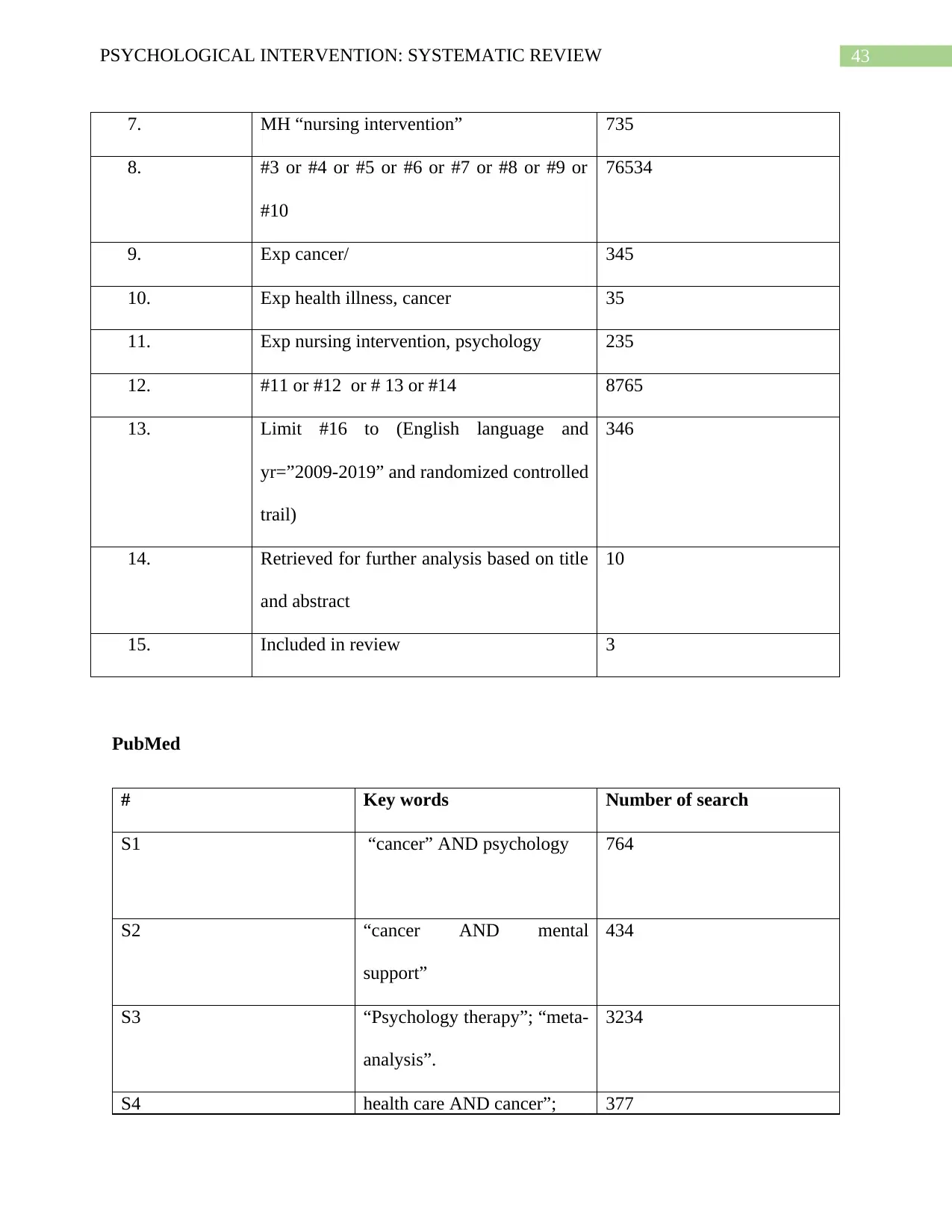
43PSYCHOLOGICAL INTERVENTION: SYSTEMATIC REVIEW
7. MH “nursing intervention” 735
8. #3 or #4 or #5 or #6 or #7 or #8 or #9 or
#10
76534
9. Exp cancer/ 345
10. Exp health illness, cancer 35
11. Exp nursing intervention, psychology 235
12. #11 or #12 or # 13 or #14 8765
13. Limit #16 to (English language and
yr=”2009-2019” and randomized controlled
trail)
346
14. Retrieved for further analysis based on title
and abstract
10
15. Included in review 3
PubMed
# Key words Number of search
S1 “cancer” AND psychology 764
S2 “cancer AND mental
support”
434
S3 “Psychology therapy”; “meta-
analysis”.
3234
S4 health care AND cancer”; 377
7. MH “nursing intervention” 735
8. #3 or #4 or #5 or #6 or #7 or #8 or #9 or
#10
76534
9. Exp cancer/ 345
10. Exp health illness, cancer 35
11. Exp nursing intervention, psychology 235
12. #11 or #12 or # 13 or #14 8765
13. Limit #16 to (English language and
yr=”2009-2019” and randomized controlled
trail)
346
14. Retrieved for further analysis based on title
and abstract
10
15. Included in review 3
PubMed
# Key words Number of search
S1 “cancer” AND psychology 764
S2 “cancer AND mental
support”
434
S3 “Psychology therapy”; “meta-
analysis”.
3234
S4 health care AND cancer”; 377
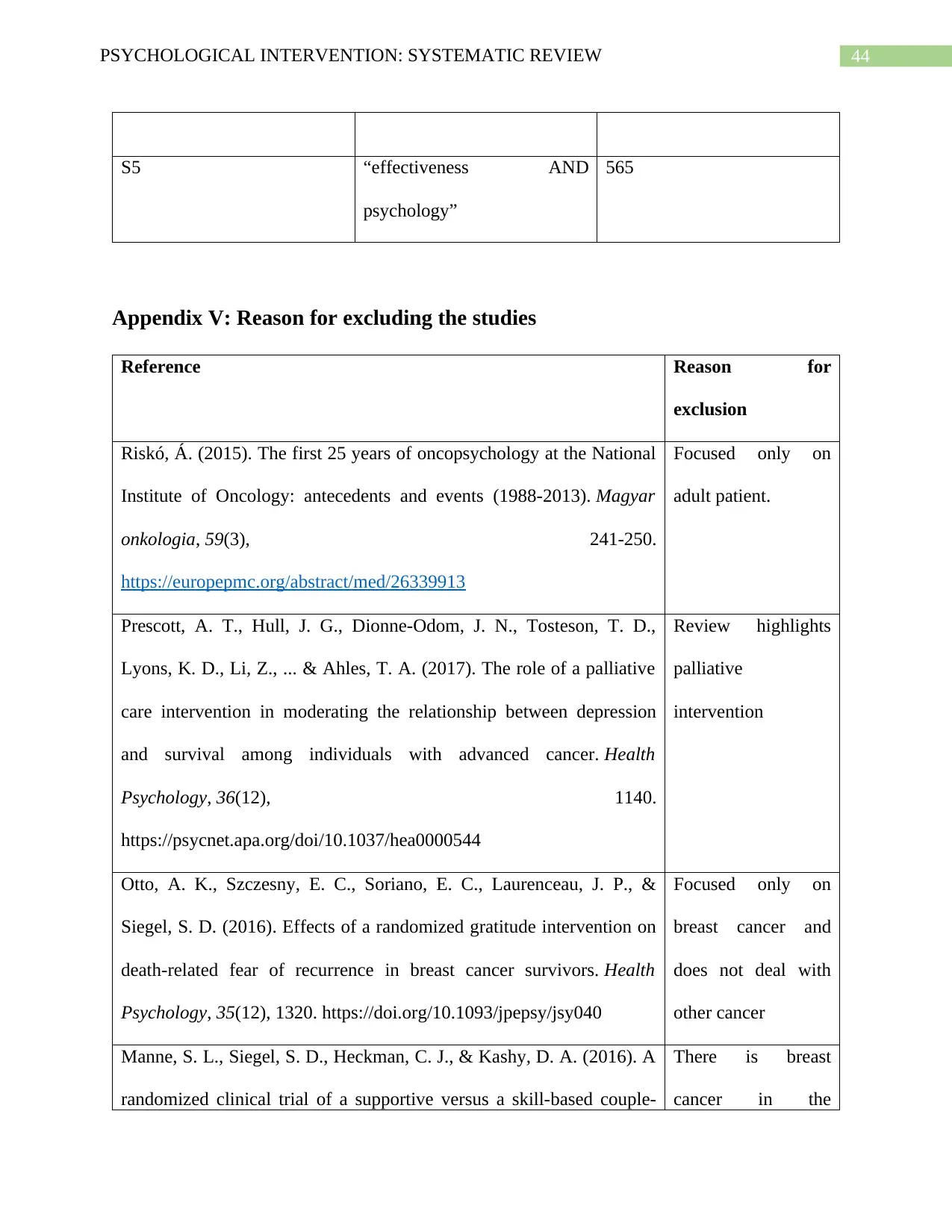
44PSYCHOLOGICAL INTERVENTION: SYSTEMATIC REVIEW
S5 “effectiveness AND
psychology”
565
Appendix V: Reason for excluding the studies
Reference Reason for
exclusion
Riskó, Á. (2015). The first 25 years of oncopsychology at the National
Institute of Oncology: antecedents and events (1988-2013). Magyar
onkologia, 59(3), 241-250.
https://europepmc.org/abstract/med/26339913
Focused only on
adult patient.
Prescott, A. T., Hull, J. G., Dionne-Odom, J. N., Tosteson, T. D.,
Lyons, K. D., Li, Z., ... & Ahles, T. A. (2017). The role of a palliative
care intervention in moderating the relationship between depression
and survival among individuals with advanced cancer. Health
Psychology, 36(12), 1140.
https://psycnet.apa.org/doi/10.1037/hea0000544
Review highlights
palliative
intervention
Otto, A. K., Szczesny, E. C., Soriano, E. C., Laurenceau, J. P., &
Siegel, S. D. (2016). Effects of a randomized gratitude intervention on
death-related fear of recurrence in breast cancer survivors. Health
Psychology, 35(12), 1320. https://doi.org/10.1093/jpepsy/jsy040
Focused only on
breast cancer and
does not deal with
other cancer
Manne, S. L., Siegel, S. D., Heckman, C. J., & Kashy, D. A. (2016). A
randomized clinical trial of a supportive versus a skill-based couple-
There is breast
cancer in the
S5 “effectiveness AND
psychology”
565
Appendix V: Reason for excluding the studies
Reference Reason for
exclusion
Riskó, Á. (2015). The first 25 years of oncopsychology at the National
Institute of Oncology: antecedents and events (1988-2013). Magyar
onkologia, 59(3), 241-250.
https://europepmc.org/abstract/med/26339913
Focused only on
adult patient.
Prescott, A. T., Hull, J. G., Dionne-Odom, J. N., Tosteson, T. D.,
Lyons, K. D., Li, Z., ... & Ahles, T. A. (2017). The role of a palliative
care intervention in moderating the relationship between depression
and survival among individuals with advanced cancer. Health
Psychology, 36(12), 1140.
https://psycnet.apa.org/doi/10.1037/hea0000544
Review highlights
palliative
intervention
Otto, A. K., Szczesny, E. C., Soriano, E. C., Laurenceau, J. P., &
Siegel, S. D. (2016). Effects of a randomized gratitude intervention on
death-related fear of recurrence in breast cancer survivors. Health
Psychology, 35(12), 1320. https://doi.org/10.1093/jpepsy/jsy040
Focused only on
breast cancer and
does not deal with
other cancer
Manne, S. L., Siegel, S. D., Heckman, C. J., & Kashy, D. A. (2016). A
randomized clinical trial of a supportive versus a skill-based couple-
There is breast
cancer in the
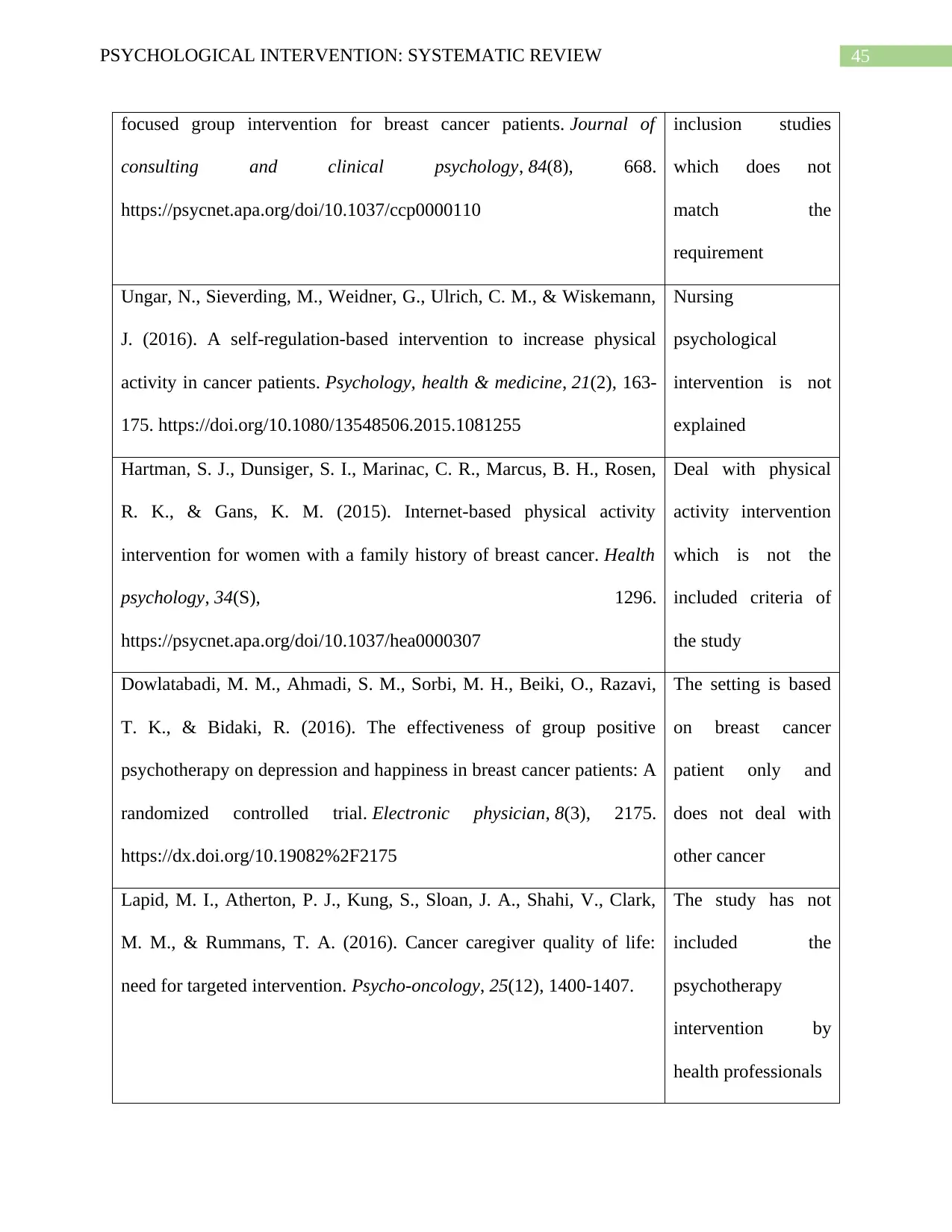
45PSYCHOLOGICAL INTERVENTION: SYSTEMATIC REVIEW
focused group intervention for breast cancer patients. Journal of
consulting and clinical psychology, 84(8), 668.
https://psycnet.apa.org/doi/10.1037/ccp0000110
inclusion studies
which does not
match the
requirement
Ungar, N., Sieverding, M., Weidner, G., Ulrich, C. M., & Wiskemann,
J. (2016). A self-regulation-based intervention to increase physical
activity in cancer patients. Psychology, health & medicine, 21(2), 163-
175. https://doi.org/10.1080/13548506.2015.1081255
Nursing
psychological
intervention is not
explained
Hartman, S. J., Dunsiger, S. I., Marinac, C. R., Marcus, B. H., Rosen,
R. K., & Gans, K. M. (2015). Internet-based physical activity
intervention for women with a family history of breast cancer. Health
psychology, 34(S), 1296.
https://psycnet.apa.org/doi/10.1037/hea0000307
Deal with physical
activity intervention
which is not the
included criteria of
the study
Dowlatabadi, M. M., Ahmadi, S. M., Sorbi, M. H., Beiki, O., Razavi,
T. K., & Bidaki, R. (2016). The effectiveness of group positive
psychotherapy on depression and happiness in breast cancer patients: A
randomized controlled trial. Electronic physician, 8(3), 2175.
https://dx.doi.org/10.19082%2F2175
The setting is based
on breast cancer
patient only and
does not deal with
other cancer
Lapid, M. I., Atherton, P. J., Kung, S., Sloan, J. A., Shahi, V., Clark,
M. M., & Rummans, T. A. (2016). Cancer caregiver quality of life:
need for targeted intervention. Psycho‐oncology, 25(12), 1400-1407.
The study has not
included the
psychotherapy
intervention by
health professionals
focused group intervention for breast cancer patients. Journal of
consulting and clinical psychology, 84(8), 668.
https://psycnet.apa.org/doi/10.1037/ccp0000110
inclusion studies
which does not
match the
requirement
Ungar, N., Sieverding, M., Weidner, G., Ulrich, C. M., & Wiskemann,
J. (2016). A self-regulation-based intervention to increase physical
activity in cancer patients. Psychology, health & medicine, 21(2), 163-
175. https://doi.org/10.1080/13548506.2015.1081255
Nursing
psychological
intervention is not
explained
Hartman, S. J., Dunsiger, S. I., Marinac, C. R., Marcus, B. H., Rosen,
R. K., & Gans, K. M. (2015). Internet-based physical activity
intervention for women with a family history of breast cancer. Health
psychology, 34(S), 1296.
https://psycnet.apa.org/doi/10.1037/hea0000307
Deal with physical
activity intervention
which is not the
included criteria of
the study
Dowlatabadi, M. M., Ahmadi, S. M., Sorbi, M. H., Beiki, O., Razavi,
T. K., & Bidaki, R. (2016). The effectiveness of group positive
psychotherapy on depression and happiness in breast cancer patients: A
randomized controlled trial. Electronic physician, 8(3), 2175.
https://dx.doi.org/10.19082%2F2175
The setting is based
on breast cancer
patient only and
does not deal with
other cancer
Lapid, M. I., Atherton, P. J., Kung, S., Sloan, J. A., Shahi, V., Clark,
M. M., & Rummans, T. A. (2016). Cancer caregiver quality of life:
need for targeted intervention. Psycho‐oncology, 25(12), 1400-1407.
The study has not
included the
psychotherapy
intervention by
health professionals
Secure Best Marks with AI Grader
Need help grading? Try our AI Grader for instant feedback on your assignments.
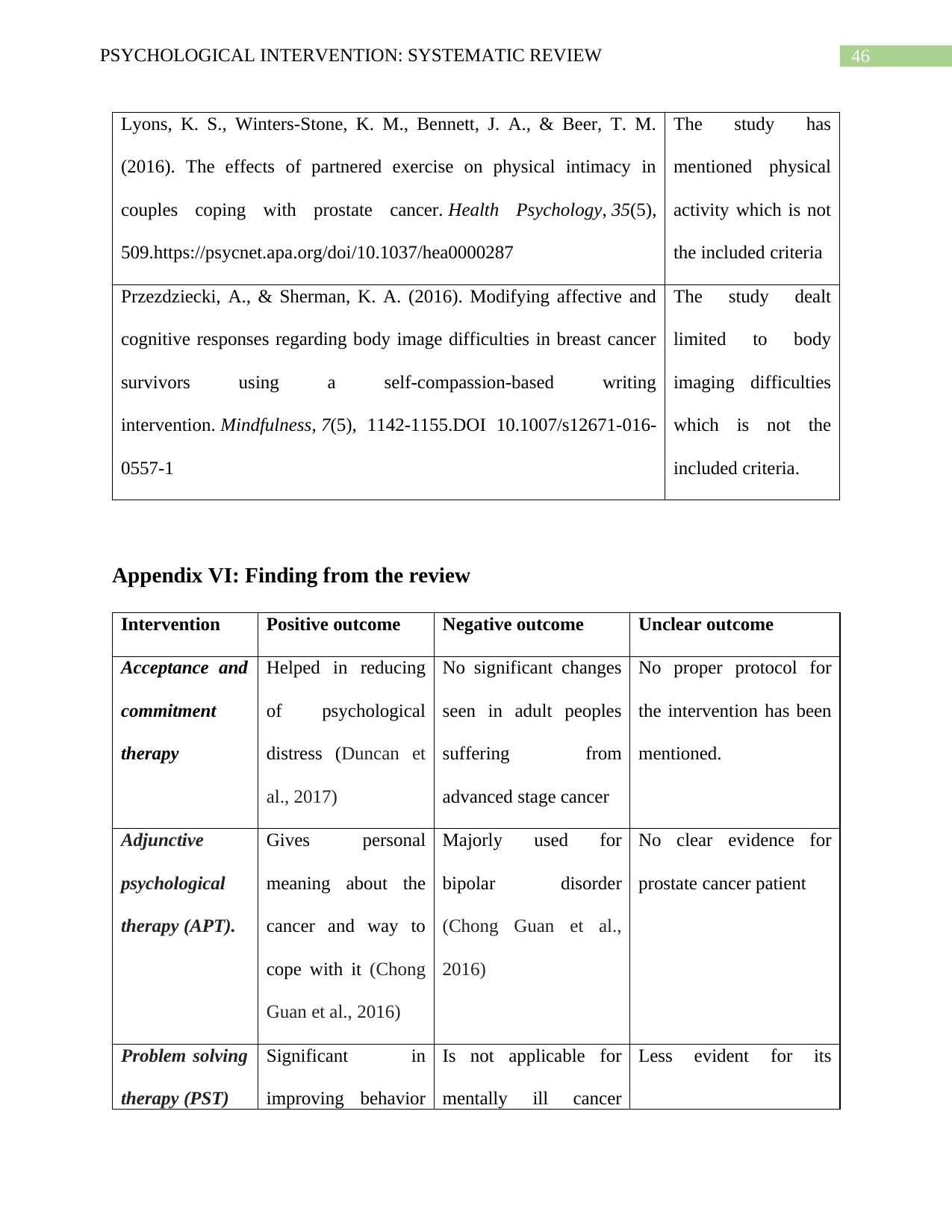
46PSYCHOLOGICAL INTERVENTION: SYSTEMATIC REVIEW
Lyons, K. S., Winters-Stone, K. M., Bennett, J. A., & Beer, T. M.
(2016). The effects of partnered exercise on physical intimacy in
couples coping with prostate cancer. Health Psychology, 35(5),
509.https://psycnet.apa.org/doi/10.1037/hea0000287
The study has
mentioned physical
activity which is not
the included criteria
Przezdziecki, A., & Sherman, K. A. (2016). Modifying affective and
cognitive responses regarding body image difficulties in breast cancer
survivors using a self-compassion-based writing
intervention. Mindfulness, 7(5), 1142-1155.DOI 10.1007/s12671-016-
0557-1
The study dealt
limited to body
imaging difficulties
which is not the
included criteria.
Appendix VI: Finding from the review
Intervention Positive outcome Negative outcome Unclear outcome
Acceptance and
commitment
therapy
Helped in reducing
of psychological
distress (Duncan et
al., 2017)
No significant changes
seen in adult peoples
suffering from
advanced stage cancer
No proper protocol for
the intervention has been
mentioned.
Adjunctive
psychological
therapy (APT).
Gives personal
meaning about the
cancer and way to
cope with it (Chong
Guan et al., 2016)
Majorly used for
bipolar disorder
(Chong Guan et al.,
2016)
No clear evidence for
prostate cancer patient
Problem solving
therapy (PST)
Significant in
improving behavior
Is not applicable for
mentally ill cancer
Less evident for its
Lyons, K. S., Winters-Stone, K. M., Bennett, J. A., & Beer, T. M.
(2016). The effects of partnered exercise on physical intimacy in
couples coping with prostate cancer. Health Psychology, 35(5),
509.https://psycnet.apa.org/doi/10.1037/hea0000287
The study has
mentioned physical
activity which is not
the included criteria
Przezdziecki, A., & Sherman, K. A. (2016). Modifying affective and
cognitive responses regarding body image difficulties in breast cancer
survivors using a self-compassion-based writing
intervention. Mindfulness, 7(5), 1142-1155.DOI 10.1007/s12671-016-
0557-1
The study dealt
limited to body
imaging difficulties
which is not the
included criteria.
Appendix VI: Finding from the review
Intervention Positive outcome Negative outcome Unclear outcome
Acceptance and
commitment
therapy
Helped in reducing
of psychological
distress (Duncan et
al., 2017)
No significant changes
seen in adult peoples
suffering from
advanced stage cancer
No proper protocol for
the intervention has been
mentioned.
Adjunctive
psychological
therapy (APT).
Gives personal
meaning about the
cancer and way to
cope with it (Chong
Guan et al., 2016)
Majorly used for
bipolar disorder
(Chong Guan et al.,
2016)
No clear evidence for
prostate cancer patient
Problem solving
therapy (PST)
Significant in
improving behavior
Is not applicable for
mentally ill cancer
Less evident for its
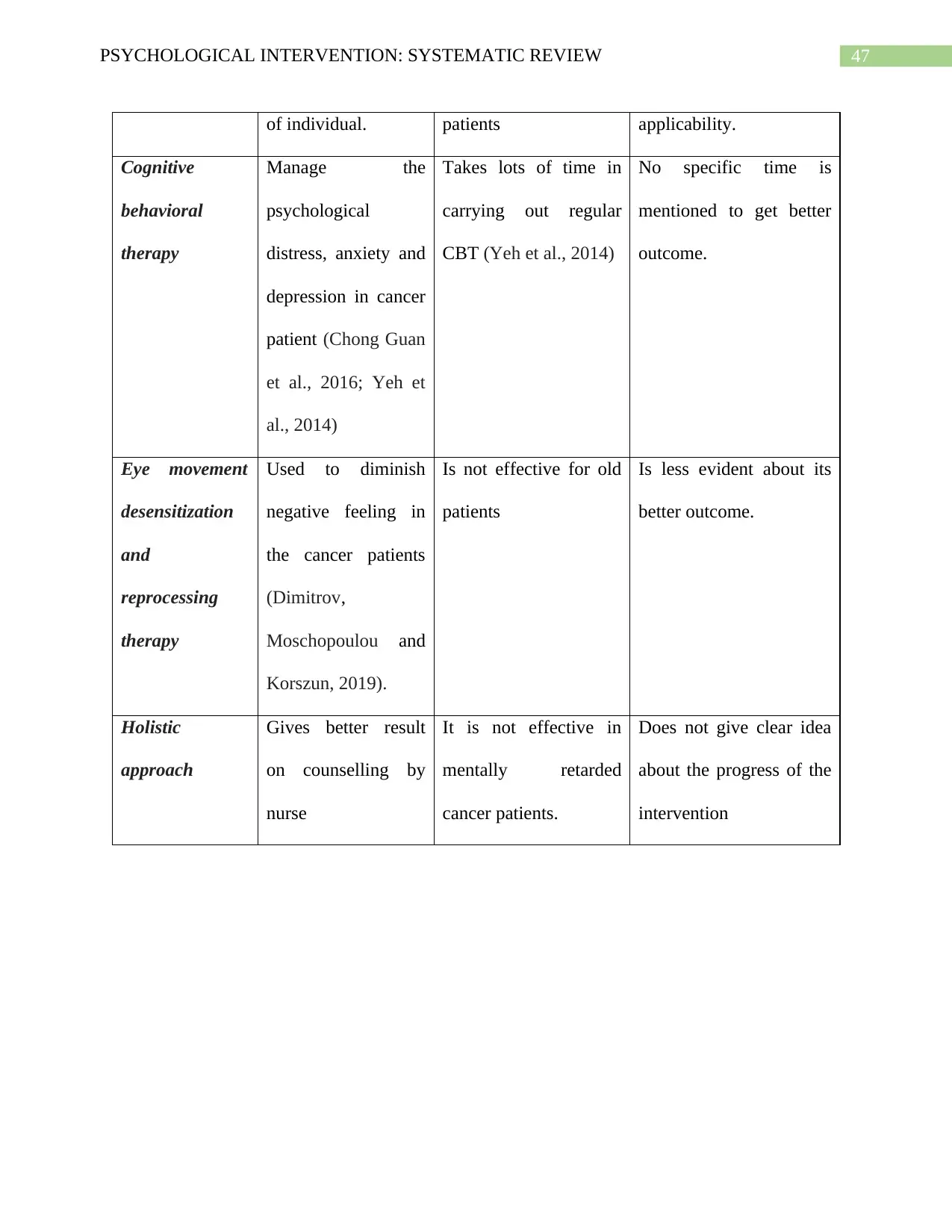
47PSYCHOLOGICAL INTERVENTION: SYSTEMATIC REVIEW
of individual. patients applicability.
Cognitive
behavioral
therapy
Manage the
psychological
distress, anxiety and
depression in cancer
patient (Chong Guan
et al., 2016; Yeh et
al., 2014)
Takes lots of time in
carrying out regular
CBT (Yeh et al., 2014)
No specific time is
mentioned to get better
outcome.
Eye movement
desensitization
and
reprocessing
therapy
Used to diminish
negative feeling in
the cancer patients
(Dimitrov,
Moschopoulou and
Korszun, 2019).
Is not effective for old
patients
Is less evident about its
better outcome.
Holistic
approach
Gives better result
on counselling by
nurse
It is not effective in
mentally retarded
cancer patients.
Does not give clear idea
about the progress of the
intervention
of individual. patients applicability.
Cognitive
behavioral
therapy
Manage the
psychological
distress, anxiety and
depression in cancer
patient (Chong Guan
et al., 2016; Yeh et
al., 2014)
Takes lots of time in
carrying out regular
CBT (Yeh et al., 2014)
No specific time is
mentioned to get better
outcome.
Eye movement
desensitization
and
reprocessing
therapy
Used to diminish
negative feeling in
the cancer patients
(Dimitrov,
Moschopoulou and
Korszun, 2019).
Is not effective for old
patients
Is less evident about its
better outcome.
Holistic
approach
Gives better result
on counselling by
nurse
It is not effective in
mentally retarded
cancer patients.
Does not give clear idea
about the progress of the
intervention
1 out of 48
Related Documents
Your All-in-One AI-Powered Toolkit for Academic Success.
+13062052269
info@desklib.com
Available 24*7 on WhatsApp / Email
![[object Object]](/_next/static/media/star-bottom.7253800d.svg)
Unlock your academic potential
© 2024 | Zucol Services PVT LTD | All rights reserved.





